







































































































Cladco Steel Roofing Sheets are suitable for agricultural, industrial and domestic applications, available in up to 14 colours. Speak to our expert Sales team to find out more.
Pictured: 13/3 Corrugated Roof Sheets Fibre Cement Roofing Sheets Available Box Profiles, Corrugated And Tile Form Sheets Cut To Custom Lengths Polyester Paint, PVC Or Prelaq Mica Coatings


SOUTH EAST FARMER
Kelsey Media, The Granary, Downs Court Yalding Hill, Yalding, Maidstone, Kent, ME18 6AL 01959 541444
EDITORIAL
Editor: Malcolm Triggs
Email: sef.ed@kelsey.co.uk
Photography: Martin Apps, Countrywide Photographic
ADVERTISING & MARKETING
Jamie McGrorty 01303 233883 jamie.mcgrorty@kelsey.co.uk
GRAPHIC DESIGN
Jo Legg 07306 482166 jo.legg@flair-design.co.uk
MANAGEMENT
DIVISIONAL MANAGING DIRECTOR: Steve Kendall
PUBLISHER: Jamie McGrorty
RETAIL DIRECTOR: Steve Brown
SUBSCRIPTION MARKETING MANAGER: Claire Aspinall
PRINT PRODUCTION MANAGER: Kelly Orriss
DISTRIBUTION
Distribution in Great Britain: Seymour Distribution Limited 2 East Poultry Avenue, London
EC1A 9PT Tel: 020 7429 4000 www.seymour.co.uk
Distribution in Northern Ireland and the Republic of Ireland: Newspread Tel: +353 23 886 3850
Kelsey Media 2024 © all rights reserved. Kelsey Media is a trading name of Kelsey Publishing Ltd. Reproduction in whole or in part is forbidden except with permission in writing from the publishers. Note to contributors: articles submitted for consideration by the editor must be the original work of the author and not previously published. Where photographs are included, which are not the property of the contributor, permission to reproduce them must have been obtained from the owner of the copyright. The editor cannot guarantee a personal response to all letters and emails received. The views expressed in the magazine are not necessarily those of the Editor or the Publisher. Kelsey Publishing Ltd accepts no liability for products and services offered by third parties.
Kelsey Media takes your personal data very seriously. For more information on our privacy policy, please visit www.kelsey.co.uk/privacy-policy/ If at any point you have any queries regarding Kelsey’s data policy you can email our Data Protection Officer at dpo@kelsey.co.uk

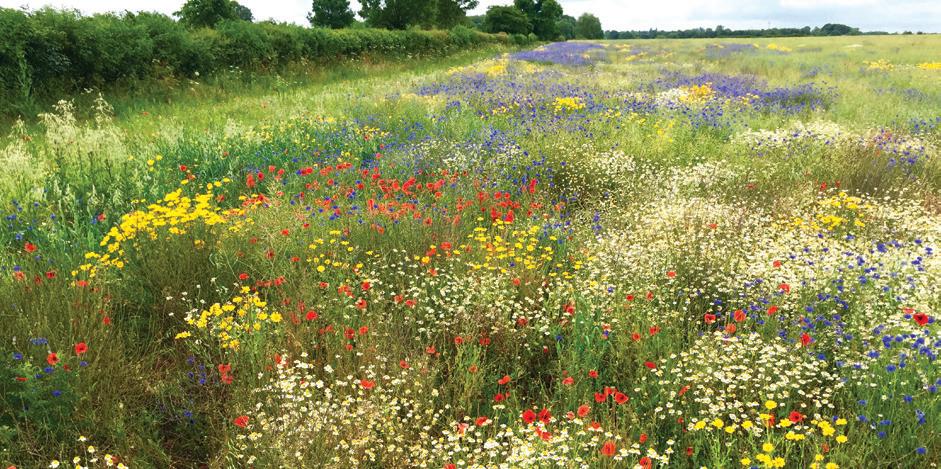


www.kelsey.co.uk
Cover picture: Hugh Lowe Farms Ltd ©Nigel Akehurst
Visitors can take part in knowledge exchange opportunities in the NFU Fruit Forum seminar tent, by joining the popular NIAB research tours and by following the
knowledge trails.
50 years in business has created a pool of knowledge and experience that directly benefits the many fruit, hop and vineyard customers NP Seymour serves.
Depending on precisely when your copy of South East Farmer drops through your letterbox, you may or may not know by now which of the political parties that have been slugging it out over the past month or so will be in control of the UK’s destiny for the next five years.
Although Conservative, Labour and Liberal Democrat candidates fighting local seats were happy to share their thoughts at the South of England Show on how each of their parties would approach agriculture if elected, it’s fair to say that farming didn’t feature particularly strongly in any of the manifestos.
And that’s not helpful. Farming and the countryside in general are important for food security, for the future of the environment, for protecting our Garden of England landscape, for jobs, for providing land for new homes and for boosting physical and mental wellbeing (and I am sure readers could list many other benefits).
While it seemed to take a back seat in a campaign that was overshadowed, as is so often the case, by point scoring, dubious statistics and the odd scandal, agriculture must be given the recognition it needs by the incoming government, whatever its political complexion.
For farmers and landowners, the main demand of the next government is a simple one. Agriculture needs a properly thought-out strategy, clear goals and a plan that the industry can invest in, secure in the knowledge that the goalposts won’t move within the next fortnight.
Goalposts, and those attempting to kick a ball between them, have at least provided some distraction from the constant General Election coverage following Rishi Sunak’s surprise announcement in May of an election on 4 July (and no, I didn’t have any money on it).
Any thoughts that the then-Prime Minister was hoping to ride a wave of euphoria as the England football team trounced allcomers at the Euro 24 championships and rocketed their way towards the finals disappeared as I watched the group stage games.
England made the last 16, somewhat surprisingly topping an uninspiring group, and it’s fingers crossed that by the time you read this they aren’t already on their way home.
While the football’s been uninspiring and the General Election has been more controversial than constructive, at least the summer’s agricultural shows have lived up to expectations, with decent weather, good crowds, impressive livestock and plenty to see and do.
See you on the other side.



Manufacturer Ceva Animal Health has warned sheep farmers that the EAE (Enzootic Abortion of Ewes) vaccine, Cevac Chlamydia, will be unavailable during July and August.
The supply issues, which will affect the main vaccination period for EAE, follows “a vaccine batch failure in the manufacturing process”, according to the company.
South East Farmer correspondent and sheep farmer Alan West said the lack of vaccine could cause a major headache for breeders who buy in replacement ewes and would normally vaccinate to avoid the risk of bringing in EAE, and said it “strengthens the argument for maintaining a closed flock and a high level of bio security”.
Alan added that there had been several issues affecting the supply of a number of vaccines manufactured on the continent since Brexit, pointing out that UK farmers were “last on the list when there are any issues within the supply chain”. There had been “significant issues” with Clostridial vaccines a year or so ago, he commented.
A statement from Ceva said the company “understands the significance of vaccinations in maintaining the health and welfare of livestock” and “deeply regrets any inconvenience caused to its valued sheep farmers during this period." It added that it was “working tirelessly to resolve this challenge”.
Roy Geary, regional director for Northern Europe (including the UK) at Ceva Animal Health, explained: “The manufacturing of vaccines is a complex process that involves stringent quality control measures and adherence to regulatory guidelines.
“Unfortunately, the anticipated vaccine batch has failed to meet the quality expected to be suitable for release, which has temporarily affected the ability to meet the demands of the UK sheep market within the main seasonal vaccination period for EAE. As a responsible provider, we are actively addressing these issues to minimise the impact on customers.”
He added: “Our dedicated team is working closely with our partners to resolve the challenges and restore normal supply levels as soon as possible. The vaccine challenge is being treated with the utmost urgency, and we are actively exploring alternative options to speed up the supply chain for future batches of the vaccine.

MALCOLM TRIGGS - EDITOR
EMAIL YOUR VIEWS, LETTERS OR OPINIONS TO: sef.ed@kelsey.co.uk or write to the address on page 3
“We anticipate that the issue in supply will be resolved, with some stock potentially available later in the season, however we recognise that for some farmers the supply will arrive too late for them to use. We encourage all farmers to consult their vet and explore alternative means of safeguarding the health of their flocks.” He also recommended “implementing robust biosecurity measures and adhering to existing vaccination protocols for other preventable diseases”.
On a related issue, Alan West said he was also concerned that “while the latest control framework for Bluetongue BTV-3 talks about access to a safe and reliable BTV-3 vaccine, UK farmers are unlikely to be able to access it until 2025”.

Max Ringer, Bethany Thomas and Ellie Mathieson can now add ‘MRICS’ after their names following what Batcheller Monkhouse chairman and partner Leo Hickish described as “a tremendous result and testament to the dedication each has applied to their studies while working full time”.
The newly qualified trio joined the firm as graduates and continued their studies while working – but now Plumpton College has launched a new way of achieving the same qualification which may be particularly attractive to those looking for a change of career.
The college is offering a two-year condensed BSc in Rural Land and Business Management, a full degree but with a big difference.
“This approach allows would-be land agents, telecoms surveyors and the like to work in a suitable firm for three weeks out of four and then spend the fourth week studying, which means they can earn an income while they study,” Leo explained.
Pointing out that the new Plumpton College option was particularly suited to those who were looking for a career change and wanted to keep earning, Leo added that the firm was now looking for two more undergraduates to join the firm from Summer 2025.
“They will work alongside qualified rural professionals in estate management, rural consultancy, valuation, environmental consultancy and diversification for three weeks in every four,” he said, adding: “We are proud as a firm to be training land agents and telecom surveyors of the future, closely mentoring them and helping them along the path for their individual skill sets.
“Successful candidates will achieve a BSc in two years, while being paid, and will then have the opportunity to go on to qualify as a member of the RICS. This course would suit both school leavers and those looking for a career change.”
Hadlow College went head to head with world-renowned garden designers, plant specialists, florists and nurseries at the prestigious RHS Chelsea Flower Show in May, and came away with a bronze medal.
Hadlow, Kent’s only rural and land-based college, picked up the bronze for its innovative ‘Grow Your Mind’ exhibit in the show’s Discovery Zone.
The exhibit highlighted the importance of horticultural practices in food production, biodiversity conservation and landscape design, while celebrating the many and varied careers available in horticulture and floristry







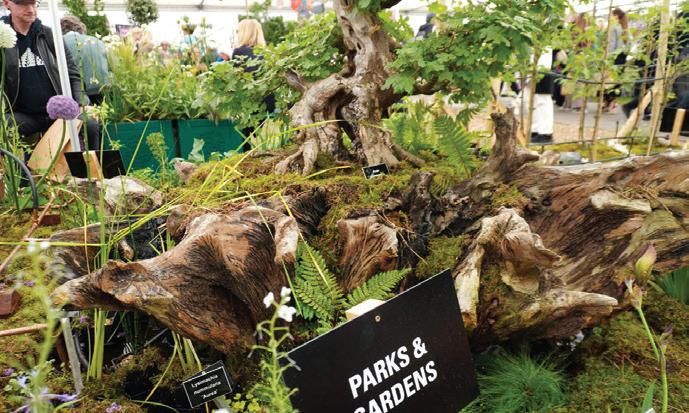


and showing how horticulture affects and influences the modern world.
Divided into three sections, the design included a modern vertical orchard, tomato glasshouse and a public garden, all centred around a large, upturned tree
incorporating a bonsai tree, symbolic of the vital work of horticulturists within landscape and amenity design.
The exhibit also looked at the year-round hydroponic production of edibles, including climate monitoring and integrated pest management, while the orchard section showcased the ‘fruit wall’ production method, demonstrating cutting-edge techniques in irrigation, frost protection and autonomous monitoring and management.
Students were involved in the build of the garden and growing the plants that were included in the design.













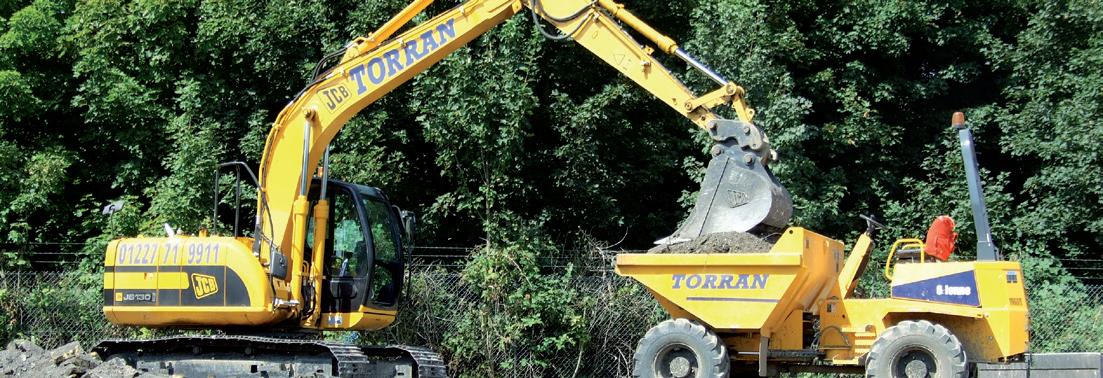
While this year’s South of England Show offered the usual mix of excitement, fun, learning, food, drink and retail therapy, the timing of the event added a more serious dimension for some of those present.
With the general election campaign in full swing and polling day just weeks away, the show provided an opportunity for politicians and pressure groups to set out their stalls or make their requests of the parties hoping to win the keys to Number 10.
The Country Land and Business Association (CLA) marquee, the setting for an enjoyable breakfast sponsored by Batcheller Monkhouse and Warners Solicitors, offered shelter to a number of politicians who chatted to visitors at ‘round table’ events in the morning and afternoon.
They included John Milne, Liberal Democrat candidate for Horsham, who told South East
Farmer that his party would pump £1 billion into farming grants to compensate for what he said had been a “drift” in funding post-Brexit.
Mr Milne said that his party’s pledge was that during the transition from Basic Payments to the new Environmental Land Management scheme (ELMS), designed to pay farmers and landowners for hitting environmental targets – a system he described as “difficult and complicated” – farmers would be no worse off.
He said farmers should be rewarded for their environmental actions but not lose out as a consequence, and stressed that there was also a need to focus on food security while balancing the demand for land for other uses such as housing and solar power.
On planning, Mr Milne said there was a need for closer integration between national and regional policy makers and the local councils that were asked to decide on individual applications.
Locally born Mims Davies, Conservative candidate for East Grinstead and Uckfield, said her party was keen to respond to the needs of the rural community and the rural economy and was determined to boost employment opportunities outside town centres.
She said that while most jobs in areas such as mid-Sussex were outside the towns, the system was designed to deal with urban situations. “We need a better planning system and a better understanding of the rural economy,” she stressed, calling for more investment in council planners who were “not just urban designers”.
Ms Davies pointed out that the Environment Act was the biggest piece of legislation passed in the last parliament and pointed out that her party would continue supporting nature recovery, food security and manufacturing. She also said that while she backed access to the countryside, it should not extend to a full ‘right to roam’.








Dave Rowntree, Labour candidate for Mid-Sussex, pointed out that more than 6,000 agricultural businesses had collapsed since 2017, with the subsequent loss of nearly a third of the rural workforce.
“It’s time we turned the page and embraced a decade of national renewal with the countryside at its heart. Labour's new deal for farmers will help put the industry back on its feet,” he said.
“We’ll use the government’s buying power to back British produce. We’ll turn on GB Energy, a new publicly owned energy company harnessing clean, home-grown British power, to deliver cheaper bills for farmers.
“We’ll rewire the country, allowing farmers to rapidly plug their renewable energy into the grid, and a new flood resilience taskforce will work to reduce the flood risk to our farms, delivering drainage systems, flood defences and natural flood management schemes.”
On rural crime, Mr Rowntree said Labour would establish the first ever government strategy, improve the police response to rural crime and coordinate the response from different government departments on issues such as fly-tipping.
Planning reform was a clear focus for the CLA’s deputy president Gavin Lane, who said the “vast majority” of members wanted “well-resourced planning departments in local authorities” and added that it was not just a question of money but of employing the right calibre of staff.
As an example of the kind of frustrations facing farmers, he pointed out that to create a reservoir needed an abstraction licence, grant funding and planning permission. “It is the




planning permission that slows it down every time,” he said.
In a reflection of Ms Davies’ comments, he pointed out that urban and rural planning needed different skills but said the right mix was not always available within planning authorities.
His CLA wish list post-election also included better rural connectivity, affordable housing in rural areas and an increased budget for agriculture to ensure ELMS could meet the targets set out in the Environment Act.
West Sussex NFU chair Andrew Strong was clear in his demands for whatever party takes power a few days after this July edition of South East Farmer is published.
With farmer confidence at, he claimed, “an all-time low,” he said the industry needed “stability, continuity, a plan that will take us forward for the next three, four, five years and will let farmers know what is around the next corner”.


He said the switch from basic payments to the “zig zags” of ELMS and the Sustainable Farming Incentive had left farmers not knowing where they were – and pointed out that the new funding schemes were in any case not available to tenant farmers with less than three years ‘on the clock’.
Mr Strong stressed that food production had to be at the heart of farming and said that while every farmer sought to hand on his or her land to the next generation in a better state, environmental concerns had to be balanced with food security.
Stressing that this country’s food standards were “the best in the world,” he said free trade agreements with countries with lower standards were “a threat” to the industry.
And he reflected the views of many on the eve of election day when he summed up: “We need to a clear plan that gives farmers the confidence to do what they are good at, keep feeding the country and make a good living.”

With the organic market continuing to grow, an Oxfordshire farmer with a background in programming is helping farmers take advantage of the opportunities on offer.
While the Soil Association Certification’s Organic Market Report 2024 revealed that the market is now in its 12th year of sustained growth and has reached £3.2 billion per annum, servicing the market is not always easy for smaller operators.
Organic veg boxes are increasingly popular, offering farmers an additional source of income and giving local people easy access to healthy sustainable food while supporting a local farm business, but setting up and running them takes expertise and time and can be hard to manage alongside vital farm work.
Oxfordshire-based business owner Steve Sidhu and organic grower and former engineer George Bennett found the process for setting up their own scheme was complicated, despite their backgrounds.
“We cobbled together a system with off-the-shelf software but found we had huge inefficiencies,” Steve said. “Given our experience, we were fairly confident that if we
were having those issues then others would be, too.”
After looking at the cost of having an external website agency build something for them, they set up their own technology company called Growing Good in 2022 and developed a software platform which allows farmers to set up an online ordering system and get their business off the ground quickly and easily.
“The technology gap between big operators and small local growers is huge,” Steve said. “We’ve invested a lot of time and money into enabling anyone to use our software, regardless of whether they sell 10 or 10,000 veg boxes a week.”
He went on: “Farmers can build the site themselves. It's really simple to use; they don't have to be techy, pay developers or spend a huge amount of time on it and it provides a modern, online shopping experience for customers.”
Sandy Lane Farm, the Soil Associationcertified organic farm in Oxford run by George, was the first to sign up, offering a variety of veg box sizes and options like fresh bread and eggs.
It exceeded George’s expectations. In the first year, his own veg box sales grew by 30%, without additional advertising and in the middle of a cost of living crisis.
The system allows George and his team to spend less time on admin and more time working on the farm – and he enjoys the added peace of mind of a regular income stream.
Now in their second year and having already attracted many clients through word of mouth, Growing Good is expanding and continuing to refine the product.
“We have been taking things slowly to truly understand the needs of our users and ensure they have the support required to get the most out of the platform.” Steve said. “With their help, the software is evolving to work for a wide range of users, which has resulted in us gaining interest from European growers ahead of schedule.
“That said, our focus for now is here in the UK, supporting local farmers – making healthy, organic food more accessible and affordable.
“Selling organic veg boxes might not change the world overnight, but it's a great place to start.”

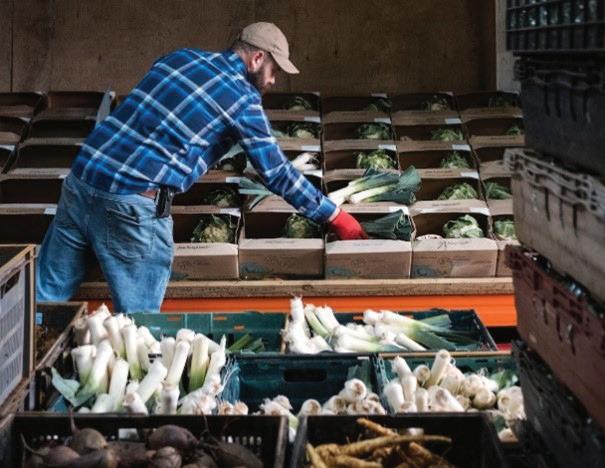
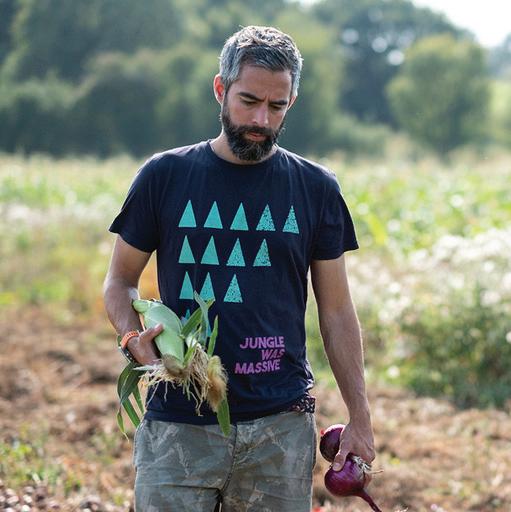


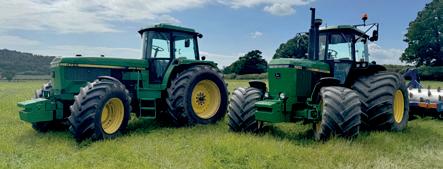


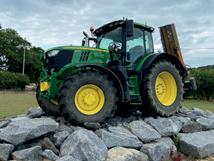





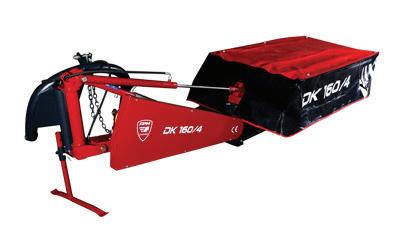


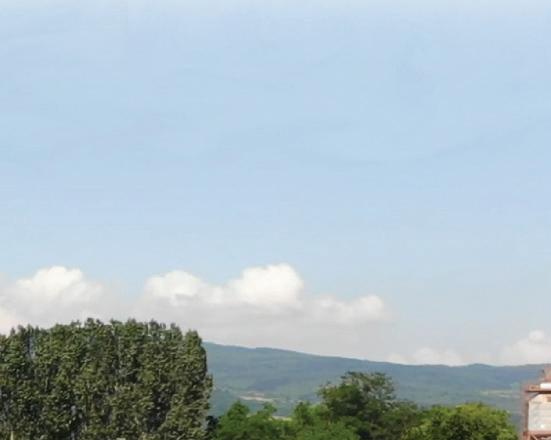
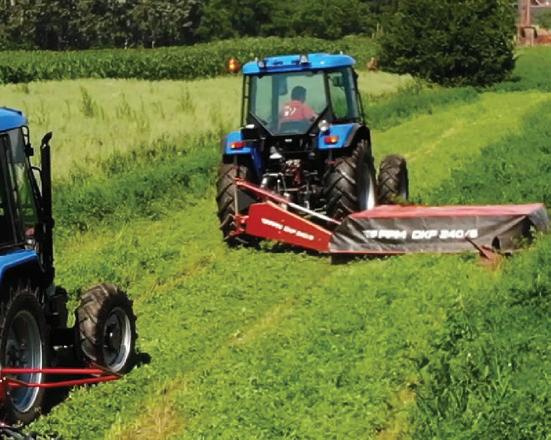

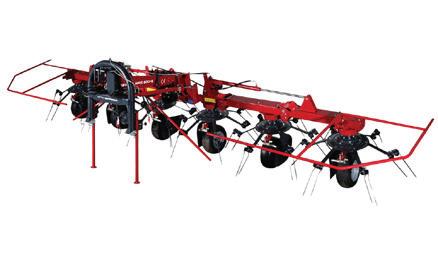

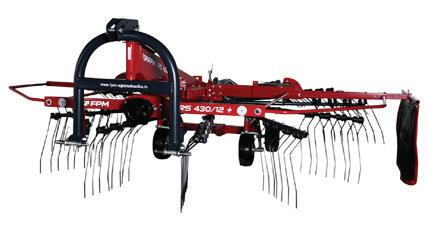































This year’s South East Future of Farming Conference, which was featured in the May edition of South East Farmer, has boosted the coffers of farming charity the Royal Agricultural Benevolent Institution (RABI) by more than £1,000.
Ticket sales from the conference, organised by the Country Land and Business Association (CLA) and Virgin Money in partnership with Plumpton College, totalled £1,260, cash that will help RABI continue to provide expert mental health and wellbeing support, as well as financial, emotional and practical help to agricultural people.
The inspirational conference, attended by farmers, landowners, students, professionals and other stakeholders, featured talks, workshops, networking and food and was held in the college’s striking new £10m AgriFood Centre.
Speakers including Lord Deben, Joe Stanley, Eleanor Gilbert and Flavian Obiero shared their farming experiences and advice on sustainability and productivity.
RABI fundraising manager Leanne Sinclair, who attended the conference on behalf of RABI, commented: “RABI is the charity at the heart of farming across England and Wales,
offering practical, emotional and financial help to the farming community. This donation will support farming people, providing professional, compassionate and holistic support.”
College principal Jeremy Kerswell said: “RABI continues to do such invaluable work for so many across the farming industry, and when planning our 2024 Future of Farming event it felt the natural choice for them to be the beneficiaries. I’m delighted the event was such a success, thus benefitting the sector in so many ways, including supporting the important role that RABI fills.”
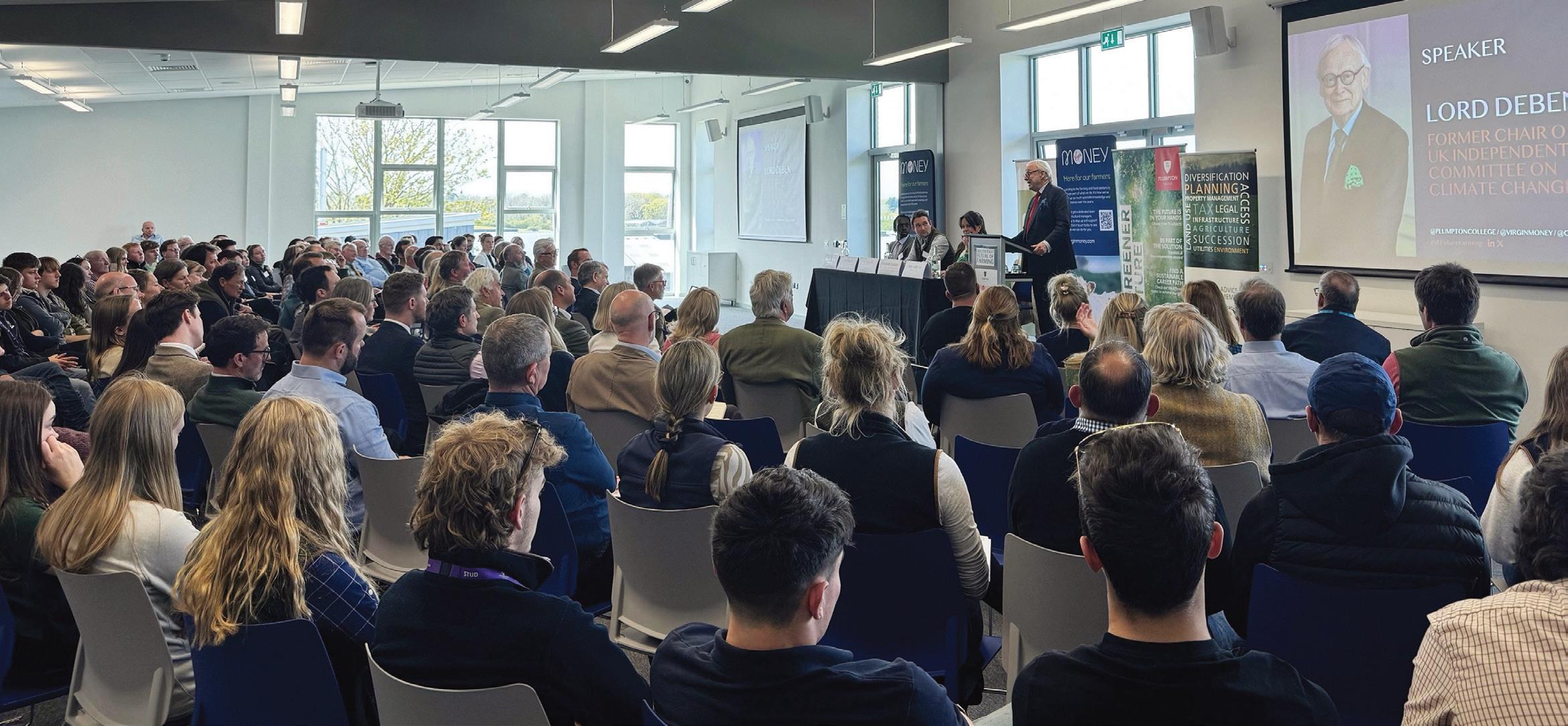
Farmers in the South East are being invited to take part in a study aimed at increasing water supply resilience.
Grounded Research, a market research company specialising in agricultural and agri-food projects, is working with the regional water company to explore farmers’ current water use experiences, the challenges they are facing, current and future requirements and opportunities to invest in on-farm water storage infrastructure.
It follows the launch by DEFRA of a new £1.6million funding pot to support farmers to increase their water supply resilience working as
groups of neighbouring farmers.
Grounded Research is keen to hear from farmers who are experiencing water shortages, dealing with irrigation challenges or would simply like to share their views on how a sustainable water supply can be secured for the future.
To take part, call Marie Charles on 01487 822320 or email marie@groundedresearch.co.uk. Those who are invited to share their thoughts in a short telephone interview will receive a £20 voucher for helping to improve water services for everyone in the farming community.
The sun made one of this year’s rare appearances to welcome visitors who flocked to the 77th Heathfield Show at the end of May.
Five showing rings hosted a broad range of displays and event classes, providing plenty of attractions for everyone to enjoy.
Headlining the main ring was the IMPS Motorcycle Display Team, which delighted the crowd with a daredevil performance that included jumping over vehicles and through flames, stunts that were all the more impressive given that the riders were aged between five and 14.
The Shetland Pony Grand National thrilled onlookers with some colourful, speedy, competitive riding, while visitors were also treated to a celebration of 60 years of the Massey Ferguson 100 series, brought to life by a parade of more than 50 tractors.
Bill Gower, the Show’s Chairman commented: “We are proud the show is celebrating its 77th anniversary year, but it wouldn’t be possible without the continued help and commitment of the volunteer committee members and ground steward volunteers and the generosity of our sponsors. It’s remarkable how our local community pulls together every year to produce such a spectacular show.
“Our aim has always been to showcase and support local farming and agriculture and this is still very evident today, with the varied livestock competition classes and a
healthy support for our equine class section.
“The education section jointly organised by Plumpton Agricultural college, the Young Farmers and South Brockwells Farm helps introduce young people to farming and agriculture and is always popular.
“As a not-for-profit organisation, the show will be making donations to the local organisations and groups who helped us on show day by putting forward volunteers.”
Main prize winners:
• Supreme Beef Champion
Sam Drury – Cinderhill Tinkerbell
• Supreme Dairy Champion
Beth Mellish – Showshine Betha
• Supreme Sheep Champion
Debbie Barr – Dutch Spotted
• Supreme Pig Champion
Oaklands Pigs – Rother Molly 65B (British Saddleback)
The show got off to its traditional start for 70 farmers and landowners who attended Batcheller Monkhouse’s popular Sussex Breakfast, which this year focused on ‘Farmers of the Future’.
Keynote speaker Tom Gribble, who, with his father Ed, farms some 1,500 acres at Firle, opened the discussion, confirming the business’ commitment to making the best of the environmental grants available while at the same time keeping food production at the centre of the business strategy.
“There are so many pressures on farmers,” he said, “apart from the obvious one of
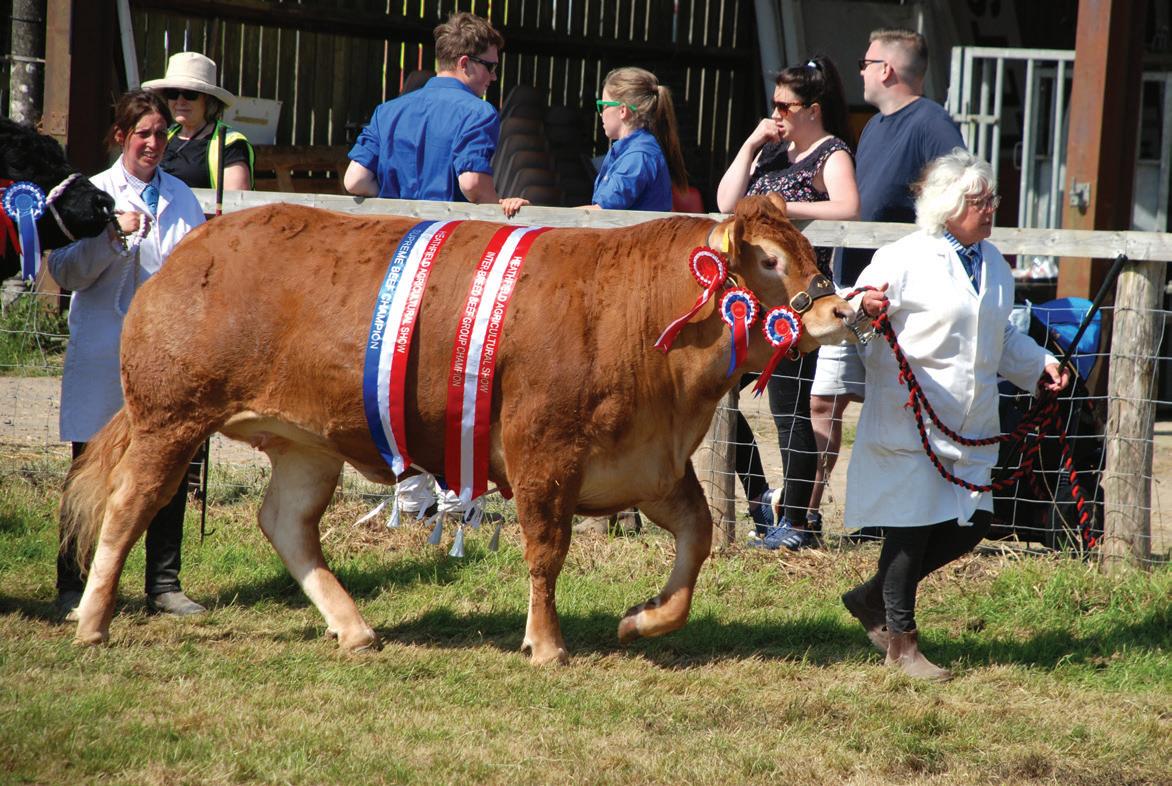






trying to run a profitable business. The regulatory burden and over-complexity of the environmental grants scheme, plus the ban on live export of livestock for slaughter is particularly burdensome.
“Geographically Sussex is closer to France than the large livestock markets in the West Country or northern England, so for our livestock the journey could be shorter.” He added: “We are frustrated with some of the trade arrangements and of course climate change is having a huge impact.”
A lively question and answer session followed, with Huw Merriman, former MP for Bexhill and Battle, bringing the discussion to a close.

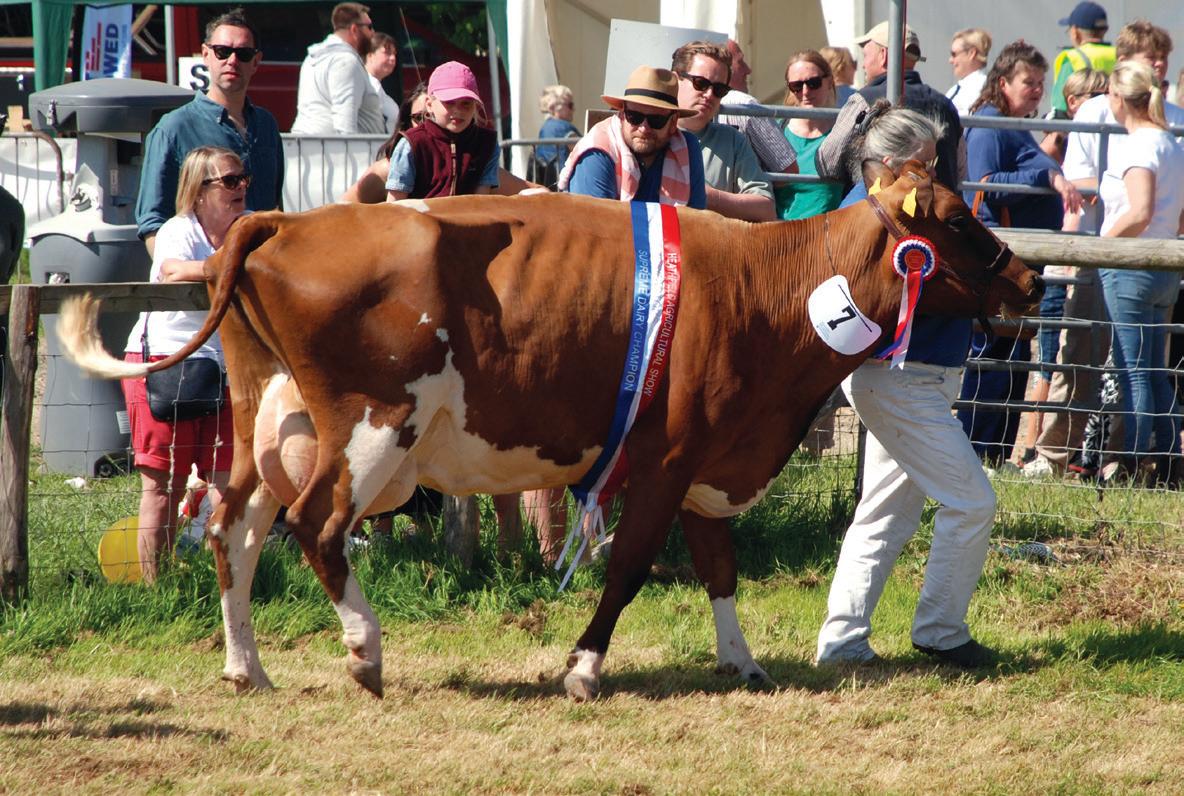
This last winter and early spring have been challenging to say the least, warm and wet with lasting and devastating floods for many. I fear this man-made problem will be with us for a few generations, so we must learn to mitigate and roll with the punches. There is a steady clamour from the NFU, farmers and lobby groups that we must concentrate on food security and food production, but the market we are in is quite different from that which existed around the time of the second world war. We are now almost totally divorced from our consumers,
whether we are producing bread, meat, milk, veg, fruit or cut flowers.
Between our customers and ourselves lie the wholesalers, processors, manufactures and supermarket retailers that are so much larger than farms, but which add value (and cost) at each step down the chain. In this strange market the commodity producers are tiny by comparison with, say, mining or oil extraction, where the commodity producer is the large cog in the chain.
So what is the role of the small farm in UK agriculture, and what is a small farm? I must
be arbitrary to make my point, so I will define a small farm as 500 acres or less and a large farm as one over 2,000 acres. The latter is still a reasonable business, growing bulk quantities of milk, meat, grains and vegetables, while the former cannot.
Those in between struggle in today’s marketplace. This shift has taken as little as half a lifetime; my in-laws ran a successful business in the 1960s producing organic cream from Jersey cows and pigs from the skimmed milk while employing and housing seven workers on 250 acres.

Change was just round the corner. Brucellosis and the death from cancer of a much-loved cowman, Cecil, precipitated the dispersal of the Jerseys and a successful sale of the cream business. The pigs continued and expanded when my son Nick joined the farm after enjoying himself at St Andrews and studying agriculture at Nottingham University. The main output of the farm, from a workforce of two, was outdoor reared pigs producing ‘weaners’ under contract, a volatile and risky market.
As I approached retirement from hospital clinical practice it became abundantly clear that the farm had to change the business model or expand and diversify to survive and support a family. It was also clear that global warming and ecological loss were serious issues associated with farming.
We managed to secure 155 arable acres nearby just as both DEFRA and the European Parliament were actively addressing biodiversity loss and the need to mitigate climate change. Things were moving fast. Houses, no longer needed for farm workers, were leased, as were surplus farm buildings. Listed farm buildings were converted for rental. We were quick to embrace stewardship schemes, with low- or zero-input grassland, margins around all arable fields and 2km of new hedging. Several ponds were restored in a spring-fed tributary of the Evenlode river. Field trees and woodland were added and winter feed sown for farmland birds. We also adopted regenerative techniques to improve soil health
Rental and stewardship schemes yielded a predictable and steady income. Pig production was phased out as the market moved on and our model was no longer profitable. The permanent pasture needed grazing, so we introduced pedigree South Devon beef sucklers as our eco-engineers to provide quality meat as well as breeding stock.
Our aim was, and is, to breed cattle that are recorded, perform well, can compete in the show ring and are high health. The farm now runs as a family partnership, with our eldest son the managing partner and the only paid ‘member of staff’.
All these measures, though not stress free, have stabilised our farm finances, restored the fun of farming and had a real and positive impact on the farm’s botany and wildlife. We may only produce about 10 tons of beef annually as food for humans, but we are
contributing a great deal more as public good. The farm is enjoyed by many citizens of Chipping Norton walking the public and permitted footpaths. The fields and margins are full of butterflies; patches of nettle feed peacock, small tortoiseshell, red admirals and comma caterpillars.
Fresh cowpats are promptly colonised by several dung beetle species and dry tracks are full of miner bee holes. Bird numbers and species have risen and the spring is once again full of song. Hedgehogs are on regular night patrols.
The farm has also become a useful resource for research and knowledge exchange.
Studying plants, insects and birds in margins, hedges and scrub areas provides fascinating information on what works and what doesn’t. Our cup really will be full when the turtle doves, quail and cuckoos return.

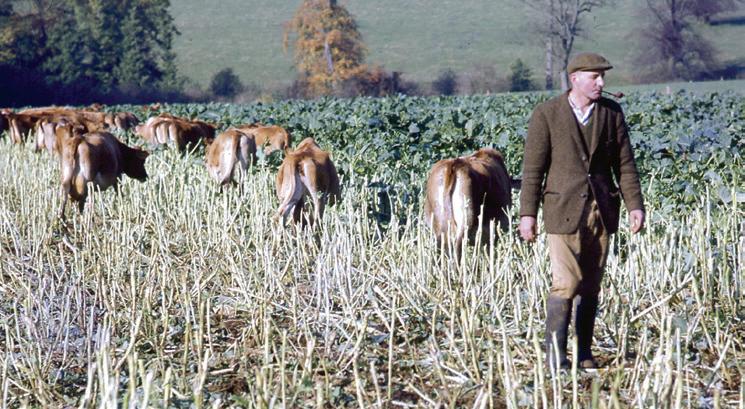
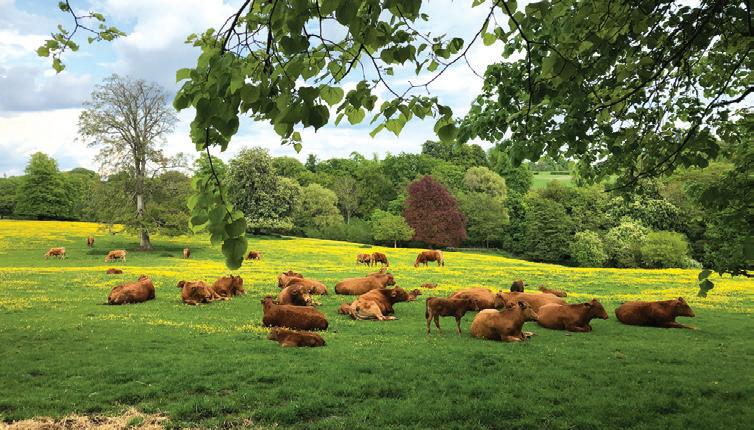

Cultivated margin with corn marigold, corn chamomile, cornflower and poppy



This month Nigel Akehurst visits Hugh Lowe Farms Ltd, located just outside Mereworth in Kent, to meet fifth generation owner and managing director Marion Regan who, together with her husband Jon and daughter Amelia McLean, run one of the largest soft fruit businesses in the UK. They farm 750 hectares, producing around 5,000 tonnes of strawberries and 1,000 tonnes of raspberries and blackberries each year under tunnels and glass on about a third of their land, with the remaining two thirds split between arable and space for nature.
Arriving at Hugh Lowe Farms just off the B2016, I park up opposite their large packhouse and meet managing director and fifth generation grower Marion Regan outside their training facility.
She invites me in to the hallway and I notice a large group of fruit pickers in the next room all watching a health and safety video. After signing in and grabbing a coffee, we head into their boardroom, where she introduces me to her husband Jon Regan, who helps run Hugh Lowe Farms and their other three businesses.
These include three companies and one partnership, explained Marion. Hugh Lowe Farms grows soft fruit, L J Betts grows salad, Blaise Plants Ltd grows propagating soft fruit plants and the Regan Partnership is responsible for all their arable crops.
Across the three companies they employ over 1,000 members of staff, with just shy of 100 permanent employees, who live locally, and around 900 seasonal staff, all of whom live on site.


Marion can trace the roots of the soft fruit picking business back to 1893, when her great grandfather Bernard Champion started growing fruit on the farm to supply their family stand in Covent Garden Market. He began specialising in strawberries before the first world war and continued until Marion’s late father, Hugh Lowe, took over the business after the second world war. Marion grew up on the farm, and after studying Botany at Oxford she worked as an environmentalist for a number of years before joining the family business and taking over from her father in the 1990s.
“It’s surprising how commercial one can get when you realise what you want to do. You need money to do things,” she remarked.
More recently, Jon and Marion’s daughter, Amelia McLean, has joined the business after spending eight years in the city as a lawyer.


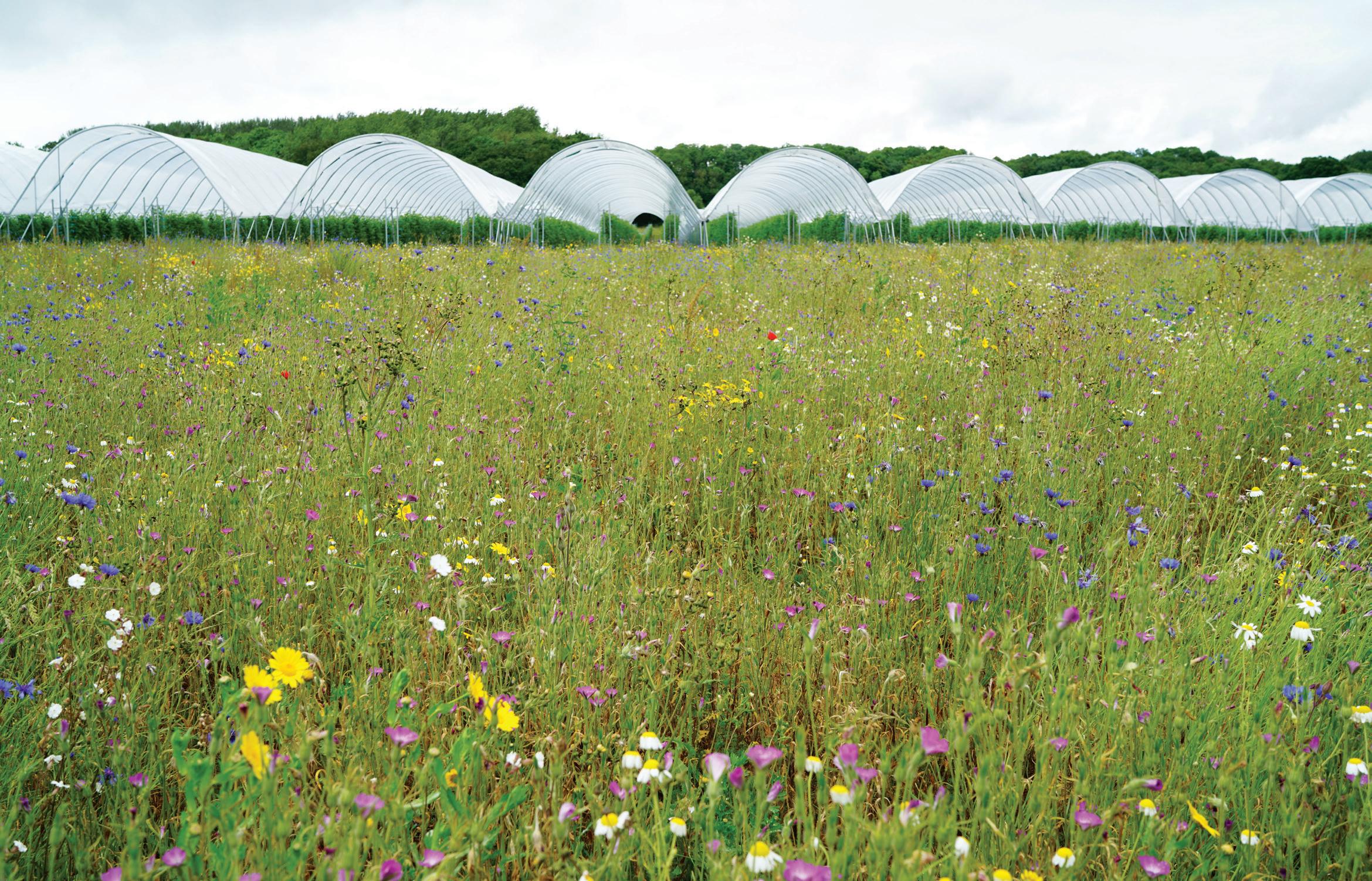
She is the commercial director and handles all the legal and financial issues.
Over the years the business has evolved to become one of the largest fruit farms growing berries in the country, but to Marion it still has “that feeling of a family farm”.
Soft fruit production accounts for around a third of their 750 hectares, with a patchwork of polytunnels and glasshouses situated amongst arable fields, permanent pasture, woodland, buffer strips and cover crops.
This land-sharing approach provides a diversity of habitats to ensure healthy populations of insects and pollinators that play such a vital role in the pollination of their fruit crops.
The vast majority of the fruit is harvested by hand and taken to the packhouse where it is chilled, checked for quality and packed. Customers include the multiple retailers, door sales, wholesalers, farm shops and restaurants.
Hugh Lowe Farms has also been lucky enough to supply Wimbledon for a number of years, which Marion described as a great privilege but also quite daunting, as people come from all over the world and remember the strawberries they eat.
Putting something better in front of customers year after year has been a key driver of growth for Hugh Lowe Farms, but after several years of rising costs and flat prices, she worries for the future of their sector.
“Variety and flavour are very important but so is having enough margin in it for the growers so that they can keep innovating and keep investing in their farms,” she said.
Ultimately she doesn’t want to let down a whole new generation of the strawberry-eating public in a race to the bottom, and she remained hopeful this year might see some sensible adjustments and recognition back to the grower.
Hugh Lowe Farms markets its soft fruit to the multiple retailers through an exclusive arrangement with Driscoll’s, a soft fruit breeder based in California.
Strawberry varieties grown on the farm include Malling Centenary and Driscoll’s Katrina, Jubilee, Beatrice and Zara.
Driscoll’s Zara is one of their top tier strawberries and consumers will pay a premium for them, but Marion has a passionate belief that even their standard strawberry should taste amazing, as that’s mostly what people are buying for their children’s tea.
The biggest challenge facing UK horticulture is labour, said Marion.
“When adding up the current minimum wage and additional costs like National Insurance, holiday pay, pension contributions and the apprenticeship levy, there is not a single person on the farm who costs less than £20 per hour,” she said.
This high cost floor makes it challenging to incentivise piece rate picking meaningfully. Nonetheless the best pickers, who harvest upwards of 40kg per hour, earn more than £700 per week according to the website at www.hughlowefarms.com
A new, or less able, picker might harvest between eight and 10kg/h, explained Marion. Under the current seasonal labour visa rules, pickers are allowed to come and work for six months, after which they return to their homes. They are then only allowed to return for one more season.

• Farm around 750 hectares in total, mainly in Kent
• Produce 5,000 tonnes of strawberries, 1,000 tonnes of raspberries and 1,000 tonnes of blackberries annually
• Majority of fruit produced goes to multiple retailers as well as door sales, wholesalers, farm shops and restaurants
• Have supplied Wimbledon and other major sporting events for many years
• Acquired neighbouring salad producer L J Betts in July 2023 (grow lettuce, whole head lettuce and baby leaf)
• Moving to an SFI agreement from Countryside Stewardship
• Produce wheat, barley and beans in a classic arable rotation using regenerative approach. Also grow oilseed rape and cover crops
• Employ over 1,000 seasonal staff, including around 100 full-time people
• Transitioning to more sustainable practices and reducing emissions through soil carbon sequestration and increased efficiencies
• Focus on food production but also manage land for wildlife through hedges, wildflower meadows, woodland and water bodies, which helps support pollinators and beneficial insects
• Practice integrated pest management across the whole holding
• Separate propagation company called Blaize Plants
• Growing 10 hectares of vines to supply Chapel Down Wines
• Varieties of strawberries include Driscoll’s Katrina, Malling Centenary, Driscoll’s Zara and Driscoll’s Jubilee
• Varieties of raspberries and blackberries include Driscoll’s Maravilla and Driscoll’s Victoria respectively
• Hugh Lowe Farms is a founder member of grower cooperative Berry Gardens, through which they have exclusive access to Driscoll’s varieties




She called the current rules “bonkers”, arguing that the sector needed more flexibility.
“If you want a well-controlled, non-exploitative scheme, then it makes sense to have a large percentage of people who are coming back a second or third time because they can show the ropes to the new entrants,” she explained.
Marion also argued for an extension to the six-month term, which she said isn’t long enough as businesses are now picking for nine months of the year.
In the past few years, Hugh Lowe Farms has been trialing a fleet of 40 robot strawberry harvesters supplied by Cambridge-based Dogtooth Technologies.
I asked Marion whether she thought they could replace human pickers.
“The thing about people picking is that you have some really good people, and I can’t see robotic pickers touching them for efficiency, but you have a long tail of people who are not so able. So, for the first time, we can really see the robots covering that tail, so they will definitely be integrated into the farm,” she replied.
Marion also highlighted the advantages of being able to operate through the night and the ability of the robots to gather data that can be used to predict future yields and potentially help customers run promotions due to gluts.
Although they weren’t in operation on the
day of my visit, I did watch a BBC News feature filmed late in the season last year. It showed the robots picking strawberries using a motorised arm, with sensors and cameras that detect the ripest and best fruit.
The arm places the fruit in an inspection chamber where it is checked for any defects before being placed in a punnet or discarded. The whole process is completely automated, and a human only intervenes if there are any safety issues or the robots need to go back for storage.
In addition to robotics, Marion said there are still many boring but important standard mechanisations they can do, processes such as crop clearance, planting and crop management involving more efficient application of fertilisers, sprays and irrigation.
“There’s a lot that can be done to reduce the manual input in the game,” she commented.
Improving efficiencies is also a key tenet of Hugh Lowe Farm’s drive to be ‘net zero’ for carbon by 2035. It was one of the first farms and horticultural businesses in the UK to set a science-based target as a verifiable route towards achieving that ambition, explained Marion proudly.
"We did a lot of work baselining and establishing our soil organic matter in 2020,” she said.

The plan largely involves switching to renewables and to electric vehicles, which will happen more towards the end of the term, she said, adding that they are beginning to see some useful kit out there.
Any emissions they can’t reduce will be eliminated through carbon sequestration in soils and biomass. Another major plank in their strategy is to increase efficiencies across the business; improving output from every input, such as fertilisers, the substrate used for soft fruit, labour and water, all of which require energy.
Heading out for a quick tour of the farm, we drove up to the top of the farm to get a good view looking out across the patchwork of polytunnels across the valley.
Next we stopped at one of the tunnels to see some of the flexible solar panels supplied by Polysolar Ltd as part of a grant-funded agrivoltaics project run by the University of Greenwich. “The panels generate enough energy to power all our automated processes, with a bit left over to feed into the grid,” explained Marion. They are also easy to move around and cluster together to provide more shading for crops in the height of summer.
As well as harvesting energy from the sun, they also use some of their tunnels to collect rainwater, helping keep their reservoirs and other water bodies topped up across the farm.
Back in the car Marion pointed out a number of wildflower strips planted alongside tunnels to attract pollinators, providing nectar for the 100 beehives located onsite.
We then came across a group of school children walking along a farm track flanked by tunnels either side. Marion stopped to see if they had any questions, but the adult

supervisors weren’t at all interested.
“You’d think they might like to know what’s happening in these tunnels,” she remarked.
Marion is passionate about educating the public about farming. The business works closely with the local primary school and has active social media channels (both Hugh Lowe Farms and L J Betts have Instagram and Facebook pages).
Farming in a densely populated area can also be a challenge, she highlighted, with increasing 'people pressure'. As a result the company takes its public rights of way seriously.
“We make sure legitimate users are welcome, but we do everything we can to stop non-legitimate users, including using bales to block entrances that could be used by quad bikes,” Marion said.
Arriving at our destination, Marion introduced me to a team of strawberry pickers busy in the wide polytunnels. After getting the thumbs up to take a few photos, I followed one of the skilled pickers in action as he picked the ripest looking strawberries from the table top rows and carefully placed them into punnets on a trolley in front of him. Once fully loaded, the boxes of punnets were put onto trailers ready to be taken back to the packhouse.
With my tour complete, we headed back to the packhouse ourselves. In the car I asked Marion what she made of natural capital markets and the Government’s farm policy.
“It might be old fashioned, but we’re trying to grow food from our farms. Apart from some Sustainable Farming Incentive payments, we don’t have any alternative income streams,” she replied.
On government policy, she thinks they are neglecting the day job, which is growing food and specialist horticultural crops on our existing farms.
On funding, she welcomes the support to encourage innovation, something both Hugh Lowe Farms and L J Betts are looking to access. She commented that a lot of the money was going to support quite radical projects that will take some time to come to fruition – and may never do so – such as vertical farming.
As for their own plans, Marion was optimistic about the future. She wants to continue to grow the business by farming efficiently, responsibly and sustainably into the next generation and beyond.
FARMING AND ENVIRONMENT
FOCUSED JOURNALISM AND DIGITAL CONTENT CREATION
Storytelling through interviews, features, case studies, photography and videos.
For enquiries contact Nigel Akehurst via email on nigel@indiefarmer.com
Instagram @indiefarmer www.indiefarmer.com



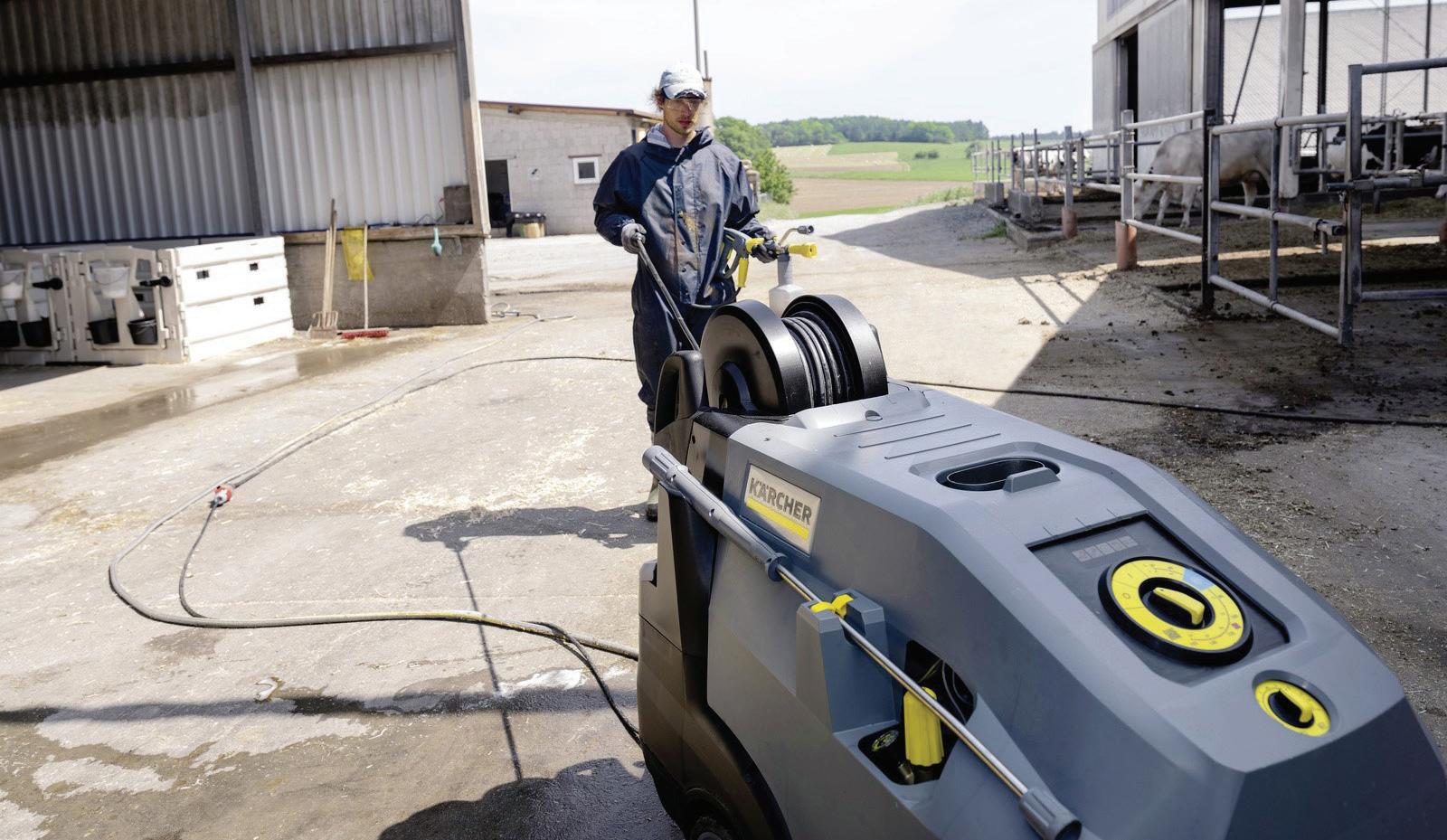


Fruit Focus’ mission is to be the leading event covering UK fruit growers’ informational needs. This year, visitors can take part in knowledge exchange opportunities in the NFU Fruit Forum seminar tent, by joining the popular NIAB research tours and by following the BASIS/NRoSO knowledge trails for continuing professional development.
Join the NFU’s seminar at 10am in the NFU Fruit Forum to hear about their priorities to help champion horticulture over the coming years. At 11am, hear from industry experts about the regulatory future of crop protection and how the UK may be adapting in a postBrexit regulatory world. Both seminars will be followed by extensive Q&A sessions, providing an opportunity for discussion and a sharing of ideas that will help progress these key industry initiatives.
In addition to the main seminars outlined above, speakers will, throughout the day, cover technical topics including the latest developments in breeding, pollination, integrated pest management, biological control, artificial intelligence and drone spraying.
The organisers are grateful to have NIAB as an event partner at both Fruit Focus and Cereals events. The scope of the research carried out at NIAB East Malling is impressive, and the NIAB research tours will highlight this research and development throughout the day. Join one of the many tours and be guided by NIAB researchers presenting on topics from precision pollination through to their research vineyard. The tours will leave from the meeting point near to the NIAB stand.
At Fruit Focus, the exhibition stands are the main event. The wide range of exhibiting

companies with information displays and knowledgeable staff members on hand provides many opportunities to share feedback, plan, specify and purchase the latest innovations and services designed specifically for fruit growers.
Don’t forget to stop by the BASIS/NRoSO stand to pick up knowledge trail information. The team will help visitors earn points for attending, visiting selected exhibitors and attending seminars and tours.

There should also be time to have a catch-up and connect with industry colleagues and friends at the various luncheons on offer, at the Worshipful Company of Fruiterers' award presentation at noon and at the afternoon wine and fruit reception.
The Fruit Focus team, exhibitors, sponsors and speakers look forward to welcoming you to NIAB East Malling for Fruit Focus 2024 and hope you enjoy your day.


www.southerntrident.com
Southern Trident is dedicated to delivering coir products of the highest technical and environmental standards. The company’s commitment begins with meticulous end-to-end supply chain management, ensuring each step from sourcing to delivery meets stringent criteria. Southern Trident takes pride in offsetting all carbon emissions associated with shipping coir, making its products not only superior in quality but also environmentally responsible.
Their quality assurance processes include twin layers of pre-shipment quality checks, adhering to rigorous UK standards. This ensures that every batch of coir is consistent, reliable and free from contaminants. Strong communication between and with customers is paramount, fostering transparency and trust throughout the supply chain.
Southern Trident’s coir products are highly flexible, tailored to meet specific customer requirements while maintaining competitive pricing. This flexibility does not compromise the quality or sustainability of the products, but rather enhances their appeal and applicability in various horticultural contexts.

Innovation is at the heart of Southern Trident’s operations. The company is continuously looking for new ways to improve products and processes, reinforcing its position as a leader in the coir industry. By combining high technical standards, environmental responsibility and exceptional customer service, Southern Trident is setting a new benchmark for premium coir products globally.
Wednesday 10 July 2024, 9am to 5pm. Car parks open at 7am. Gates open at 8am, when caterers open for breakfast. Stands and features open at 9am.
• Quality – consistent purity and hassle-free
• Knowledge – on-farm expert advice
• Innovation – research and tech support
• Choice – a solution for every need
EMR, New Road, East Malling, Kent ME19 6BJ
Tickets are free of charge if pre-registered and cost £10 +VAT if purchased on the day. Please pre-register at www.fruitfocus.co.uk






































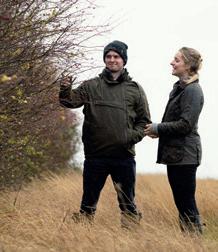




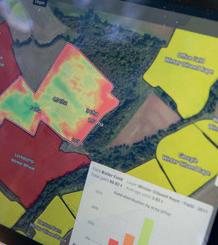









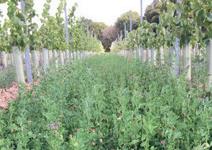







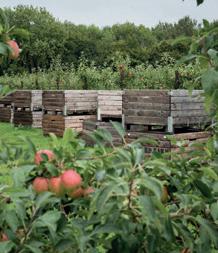

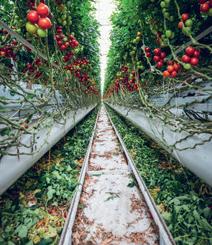




























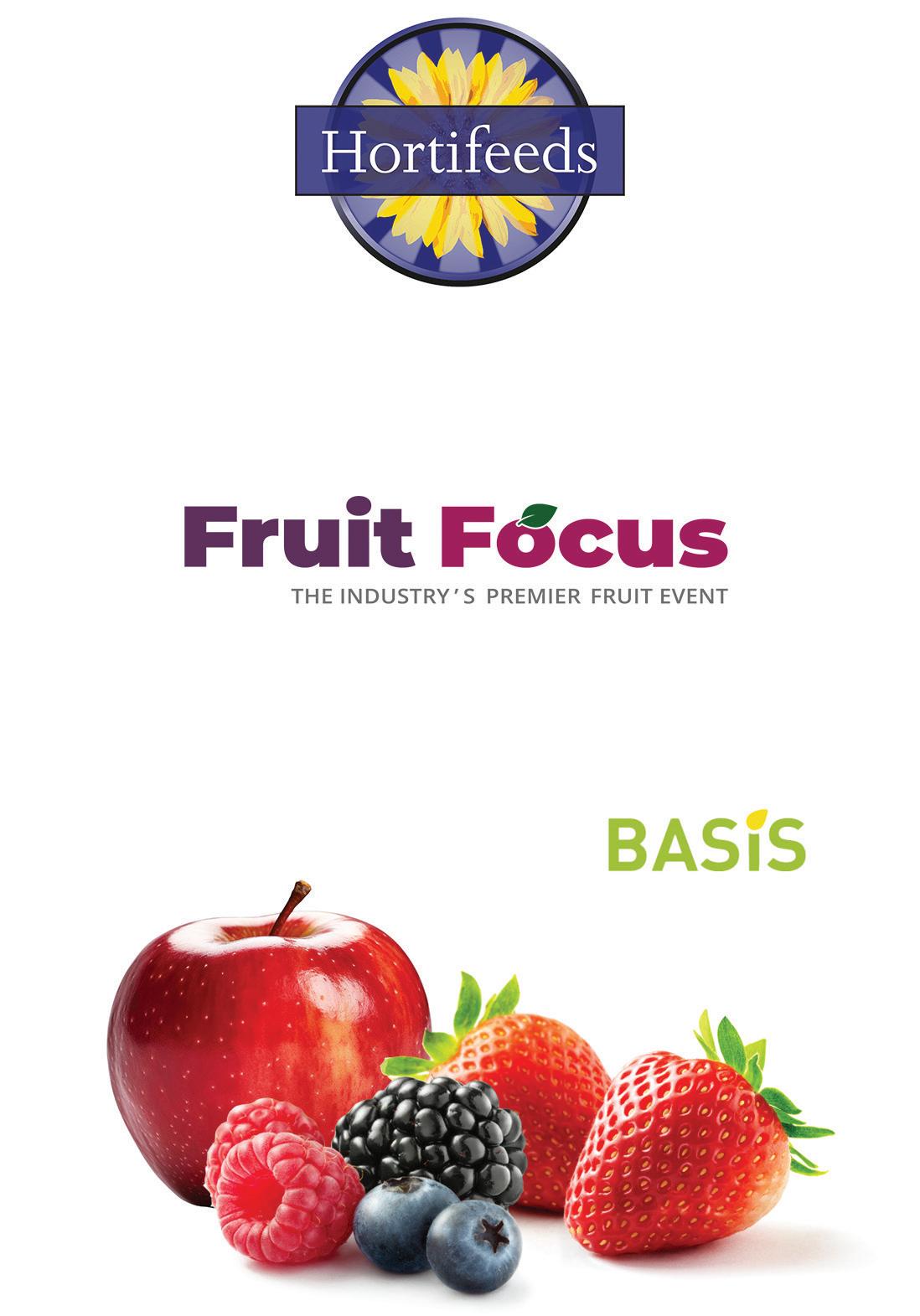

If you live in the South East and are interested in studying a rural or land-based subject, then the opportunity to do so might be right on your doorstep.
Hadlow College is Kent’s only rural and land-based college and offers courses covering a range of areas including agriculture, agricultural engineering, animal management, equestrian studies, fisheries management and aquaculture, floristry and horticulture.
Set in the beautiful surroundings of a large managed estate that includes over 265 acres of prime arable land, the college is renowned for its cutting-edge facilities.
An example of this is the Thanet Earth Centre of Excellence at Hadlow College, which was officially opened last month.
Based at the college’s state of the art glasshouse, this groundbreaking partnership between the college, leading industry grower Thanet Earth and research and innovation organisation Growing Kent & Medway is the UK’s first centre of excellence in greenhouse growing and aims to inspire and train the next generation of UK commercial horticulturists.
The college is also home to a ‘concept orchard and vineyard’ which features automated AI management systems, innovative crop diversity and robotic fruit picking.
If you are interested in finding out more and seeing these top-class facilities at first hand, come along to the Hadlow College Open Morning on Saturday 9 November. To register visit www.hadlow.ac.uk.
Discover the exceptional laboratory services at the Natural Resources Institute (NRI), where expert consultancies can help clients navigate complex research challenges or enhance organisational effectiveness.
NRI boasts multiple state-of-the-art facilities. The Produce Quality Centre is designed to control atmospheric conditions, providing an ideal environment for ground-breaking research into post-harvest conditions, plant pathogenic host interactions and packaging designs. The Medway Food Innovation Centre can revolutionise product development with its unmatched analytical tools and processing expertise.
Enhance your business’ research and production with NRI’s premier microbial analysis services, which offer precise microbial identification through characterisation and qualitative analysis. Or unlock your soil’s potential with NRI’s comprehensive soil analysis services, which provide in-depth soil composition, structure and health analyses to ensure optimal conditions for sustainable agriculture and robust crops.
NRI’s chemical services can enhance pest control strategies with expert solutions designed to meet the highest standards in the industry. The intricate relationships between plants and insects or pathogenic microorganisms can be explored with NRI’s quarantine facilities.
Learn more about the many specialised facilities NRI has to offer at www.nri.org/knowledge-exchange


• Steel frame buildings
• Building conversions
• Sheeting and cladding
• Refurbishment and change of use
• Demolition and asbestos removal
• Groundworks and drainage


• Concrete flooring and external concrete
• Concrete frame and steel frame repairs
• Internal stainless-steel drainage
• Insurance and general repairs
• Guttering and repairs

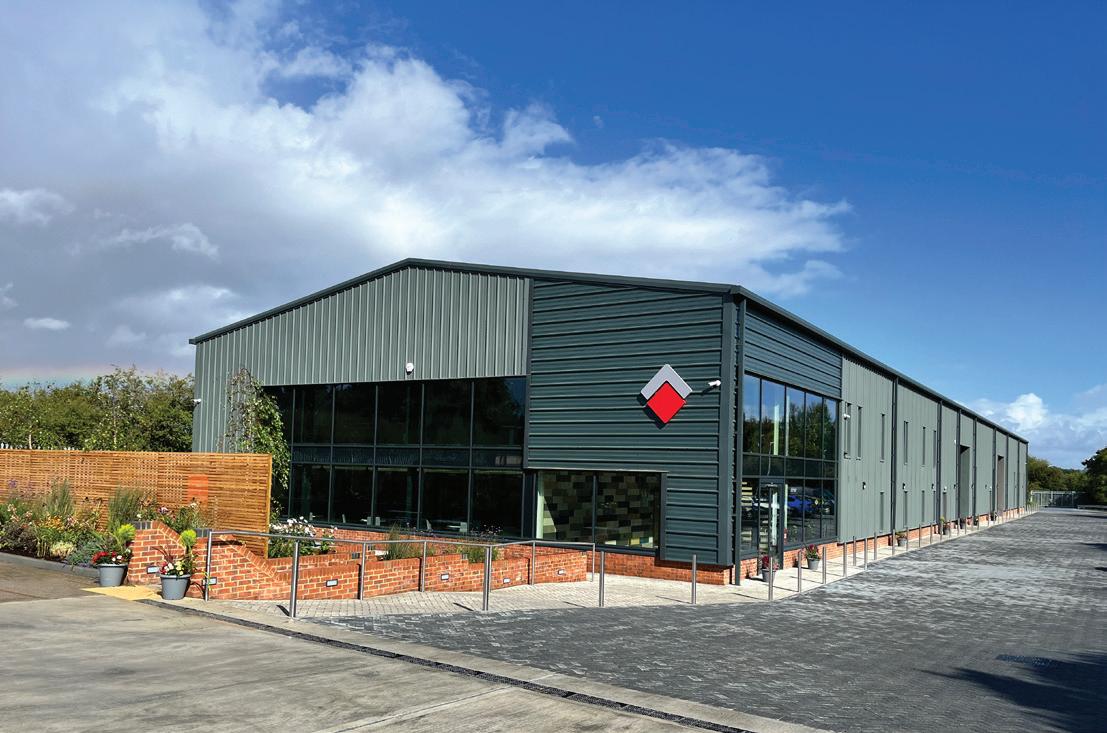



















Russell IPM Ltd. Is dedicated to the research and development of innovative and dynamic integrated pest management solutions for the Fruit and Vineyard sectors, compatible with biological control agents. Including PushPull strategies, Pheromones and trapping solutions.
Our Sister Company Russell BIO Ltd. Is Focused on the development and manufacture of bio stimulants, bio pesticicides and bio fertilizer products.
At Fruit Focus 2024 we are proud to present TruePest an AI driven App based monitoring solution for Spotted Winged Drosophila.



Russell IPM & Russell BioSolutions are thrilled to announce their participation in Fruit Focus 2024.
The stand will feature a range of high quality, organic certified soft fruit protection products and solutions. Products include specialist traps and lures, novel trapping systems and adjuvants, alongside a leading range of biological fermentation and formulation products including biostimulants, biofertilisers and biopesticides.
Russell IPM Group is excited to showcase TruePest, its new app and software suite powered by artificial intelligence (AI).
TruePest is a tool designed for monitoring and identifying insect pests, such as the spotted wing drosophila (Drosophila suzukii), on sticky boards. TruePest represents an advancement in pest management technology, providing efficient solutions for farmers.
Dr Dhurgham Al-karawi, head of AI at Russell IPM, will be a guest speaker at the
event. He will provide information on TruePest and discuss the industry advantages of using AI against pests.
Visit stand 12 and meet the industry specialists offering solutions and freebies.
At Fruit Focus 2024, explore how Russell IPM, Russell BioSolutions and Russell IOT are leading the way in sustainable agriculture.
The return of Hutchinsons and Produce Packaging to this year’s Fruit Focus further demonstrates the companies’ ongoing commitment to the soft fruit sector.
Eight new members have joined the Hutchinsons horticultural team in the past two years, helping meet the increasing demands for multi-faceted agronomy services with a particular focus on the rapidly growing vineyard sector.
With specific strengths in soft fruit, David Taylor and Gerry Scallan boost the national commercial support Hutchinsons provides for its team of agronomists, which has also expanded in recent years.
As demands on producers increase from many angles, there is an ever-greater need for specialist support and expertise across numerous areas, from technical agronomy advice to soils, environment, digital services and packaging.
Tools such as Omnia, and TerraMap high-definition soil scanning, are increasingly being used, and with new spatial measurements being developed for the fruit sector, such as flower or canopy density measurements, there will be more scope for growers to map and manage variations in crop performance accurately to maximise output. Specialist advice to help analyse and interpret such data is key to getting the most from it.
Visit the Hutchinsons and Produce Packaging stands to meet the teams, see the latest class-leading packaging innovations and discover how Hutchinsons can help your business.


Hortifeeds manufactures in the UK, producing the highest quality specialist fertilisers. For a comprehensive guide to Hortifeeds products see www.hortifeeds.co.uk.
Hortifeeds’ specialist fertilisers and bio-stimulant products support crops through every stage of development. Used by some of the leading growers in the UK, the wide range includes liquid, water soluble and granular fertilisers suitable for any growing situation.
Leading products in the Hortifeeds range include:
• HortiMix – a range of water-soluble fertilisers specially formulated for soft-fruit crops grown in a wide range of substrates or soil. There are mixes designed for both hard and soft water and with generous magnesium and trace element levels to suit specific crop requirements.
• HortiHydrate Bio – a high performance, environmentally friendly wetting agent formulated from a unique blend of sustainable ingredients.
• HortiBoost – a powerful package of 20 essential amino-acids, humic acid complex, seaweed and major and minor nutrients.
• AmētrosTR – powered by Plant Impact's CaTTR technology, AmētrosTR leads the market for optimisation and distribution of calcium.
• HortiPhyte – a highly mobile phosphite fertiliser that increases crop resilience and improves rooting and nutrient uptake.
• HortiHydrate Pro – Hortifeeds’ powerful new specialised horticultural wetting agent, which is ideal for use in coir and other substrates.
www.hortifeeds.co.uk/contact
Visit ICL at Fruit Focus on stand 30 for information on how ICL products can help growers manage risks and protect yields.



















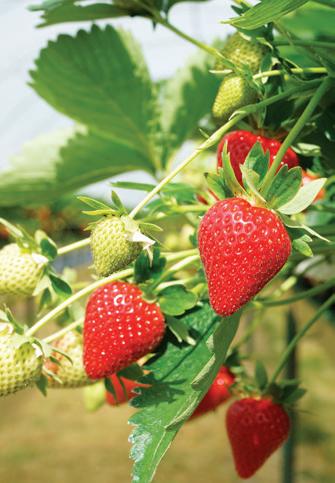



























Growers are facing ever-increasing challenges such as climate change, irrigation, disease and sustainability, all while maintaining productivity and profit margins.


























































ICL offers a range of quality products that will maximise crop nutrition with minimal effort.




















Polysulphate Mini Granular: Ideal for professional and domestic growers wanting to achieve better quality and increased yield with minimal input, Polysulphate is primarily a sulphate fertiliser which also contains potassium, magnesium and calcium. It is available in bulk and in 25kg bags.



































































































































































































Nova: Produced for professional use in fertigation and foliar application. Nova speciality fertilisers are of unrivaled quality and are highly soluble. They can be mixed with other straight fertiliser or compound water-soluble fertigation fertilisers.

















































































Agrolution pHLow: Perfect for growers who have to deal with a high pH and high alkalinity in their irrigation water and/or soils. An all-in-one fertiliser with acidifying power for better nutrient uptake.





























































Agrolution Special: An easy-to-use single bag solution to improve the availability of nutrients through formulations that prevent magnesium and calcium deficiencies.









Solinure: Complete nutrition with the right analysis for every need. The cleanest raw materials for trouble-free mixing and application. Trace elements and NPK analysis are ideal for soil-based crops of fruits and vegetables.
Visit www.icl-growingsolutions.uk or email Andrew.judd@icl-group.com for further information.
The global accountancy firm PwC recently published its 27th annual Chief Executive Officers (CEO) Survey.
As farmers, many of us, even without formalising the title, are CEOs of our businesses and the survey’s findings are relevant to agriculture.
Climate change is high on their agenda, with 43% of business transformation projects driven by ‘net zero’ aspirations. High on the target list, or ‘change stack’ is energy cost. Far lower is nature conservation. Interestingly, 37% of CEOs state that regulatory complexity is a barrier to decarbonisation.
And, deliciously, the separate PwC Global Investor Survey showed that 93% of respondents believed that corporate reporting on sustainability contained at least some level of unsupported claims.
Is it really possible that fact, stranger than fiction, means that 90% of statistics are ‘made up’?
Too much resource is lost in paperwork and words.
A much-heard cry from the NFU team leaders in driving policy delivery is to reduce bureaucracy and to hear policy in clear English. “Hear, hear” to that!
We have been involved here on the Pevensey Levels on a habitat creation scheme, which, entirely due to planning and regulatory impediment, is nearly three years, and counting, into a 'Kafkaesque' permission-seeking whirlpool. In what needs to be a ‘war-footing’ to protect wildlife, this should not be happening.
‘Net zero’ in the election has been carefully circumscribed, though there is seemingly cross-party unanimity on the subject. The phrase is too often seen as bruising to the tax-payer and accompanied by dubious technical claims.
The Popular Conservatives actually urged Rishi Sunak to scrap ‘net zero’.
De-politicising the concept, it is now more commonly used in a deconstructed way. This is a relief. It is much more effective to discuss energy saving, input reductions, pollution or tree planting without pinning on them divisive or obscuring phraseology. Likewise, ‘rewilding’, a positive ‘movement’ but a sometimes misunderstood one.
If we want to conserve birds on the farm, then let’s simply work out ways of providing
By NFU East Sussex Chair Martin Hole.
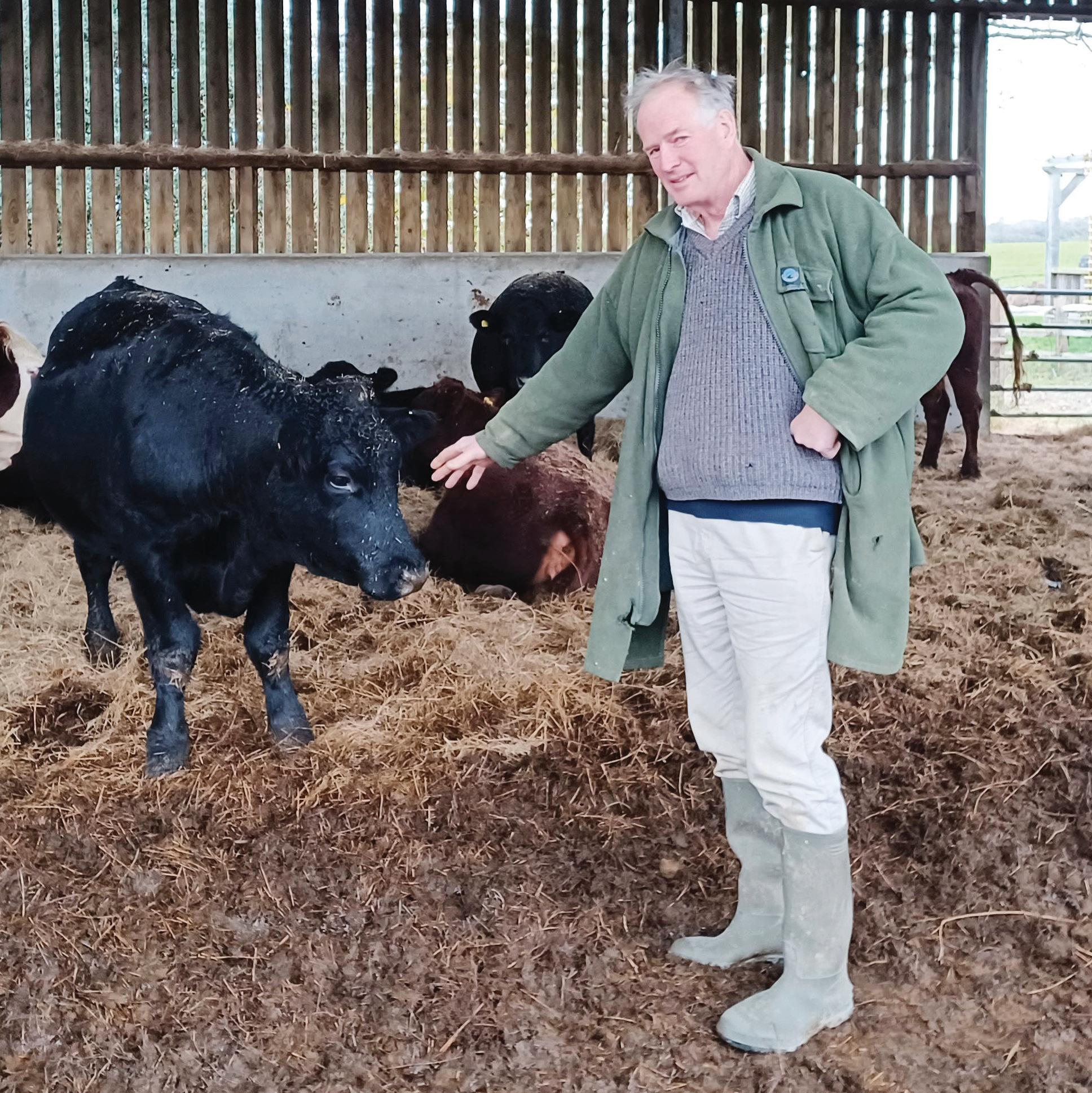
what they eat and safe places to nest and fit them into the day-to-day business.
Cheekily I referred sometimes to the last NFU President as Minette “Zero” Batters, as she set the sights high for our industry.
The NFU still firmly believes that British farming is very much part of the solution to decarbonising the UK economy.
Much has been achieved already,, with many farms well on their way to being ‘net zero’ and more farming in ways that support climate-friendly food production.
Farming is on the front line of delivering environmental repair. Strong, practical
advocacy needs straight talking, something the NFU does on our behalf.
Here on the farm it has been heartening to have had a period of thoroughly acceptable stock returns. We have invested so much over many years in diversifying and in nature conservation management, but have also tried to keep pace with our livestock farming.
The wet weather gave us a worrying carryover of lambs from last year, most of which have since been sold for some of the best prices seen in my career.
A welcome piece of luck, definitely, but as CEO, vindication for sticking to basics.
For a long time, we have been used to support under the Basic Payment Scheme. We knew how it worked and what we needed to do to qualify. Recently, however, there has been a steady flow of announcements from the Rural Payments Agency moving away from the Basic Payment Scheme towards environmentally focused opportunities. Understandably this has been met with worry in the farming community about the potential of loss of support and unease about the financial security for farms.
At a recent Canterbury Farmers meeting, I chatted with industry representatives whose message was that the long-term survival of farms lies both with diversification and with maximising every new opportunity. The new schemes, Countryside Stewardship (CS) and the Sustainable Farming Incentive (SFI), symbolise a substantial shift in UK agricultural policy while offering the opportunity for farmers to assess, adapt and innovate for the long-term benefit of the business.
Under the Sustainable Farming Incentive (SFI), from 22 July 2024 farmers will have 102 new actions for which they will be eligible to make claims. Stand-out actions for me include:
• ‘HEF1 Maintain weatherproof traditional farm or forestry buildings’, for which farmers can claim £5/m2. Eligible buildings are those that were built pre-1940, remain in agricultural use and are weatherproof.
• ‘CHRW3 Maintain or establish hedgerow trees’, for which farmers can claim £10 per 100 metres for both sides of the hedgerow. Although the subsidy is not considerable, the appeal is in the capital grant, which pays £17.22/m for gapping up and £22.97/m for planting new hedgerows.
• ‘CAHL3 Grassy field, corners and blocks’, where the objective is to leave the area to naturally regenerate for three years,
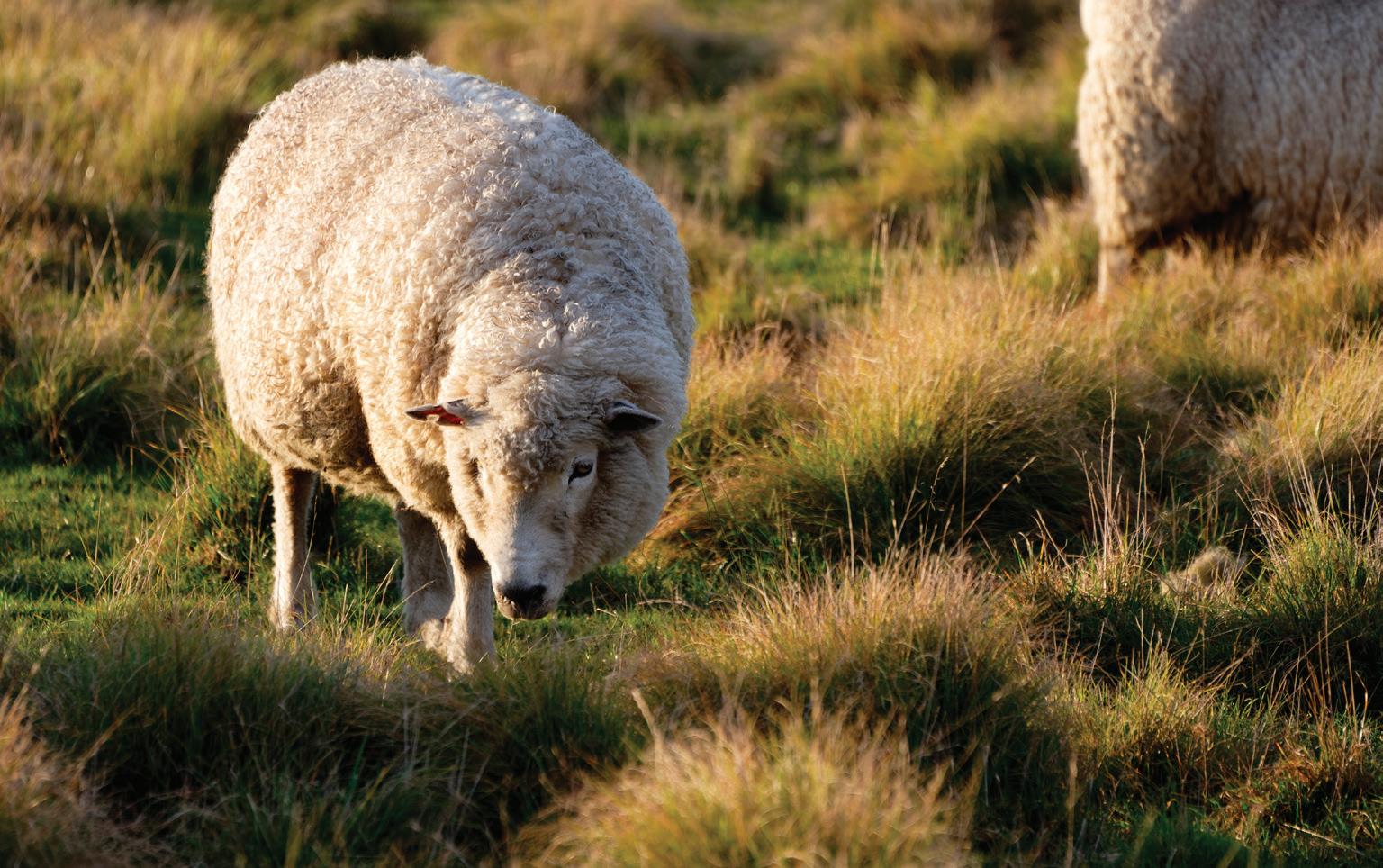
establishing a tussocky grass sward. This action is attractive as it pays £590/ha and avoids the seed and management costs which other wildflower actions require. Many farms are eligible for specific support without having to change.
For example, growers can be paid for carrying out a soil management plan, integrated pest management plan and nutrient management plan. It may sound complicated, but putting it simply:
• Make sure you or your agronomist has carried out a soil analysis
• Try to manage chemical inputs through practices such as following disease forecast models and using physical pest barriers
• Incorporate a planned fertiliser programme into your regime.
Of course, we are already implementing many of these practices as we strive to optimise our natural resources and reduce costs, especially regarding inputs such as fertiliser and chemicals which have seen significant inflation in the past few years.
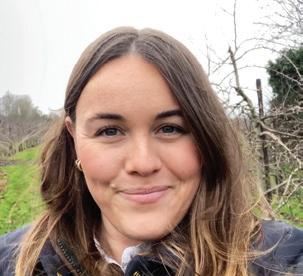
I guess it’s a case of adapt or die. With the current uncertainty in the political environment, we can expect all manner of policy changes in the coming months and years. Those farms that embrace the opportunities of the changing landscape will undoubtedly prosper, the key to success being their ability to keep up to date with the latest changes and maximise these opportunities.
There is going to be lots to take on board, so don’t go it alone; make sure you are surrounded by trusted advisers with the expertise to give you the right advice and the time to do the research to keep up to date with the opportunities as they arise.
While the only guarantees in life are death and taxes, in farming at least the only constant now is change.
For help and advice with Countryside Stewardship and the Sustainable Farming Incentive, talk to your Hutchinsons agronomist or give me a call.








SARAH CALCUTT Honorary Chair, National Fruit Show

The Thanet Earth Centre of Excellence at Hadlow college has been a long time in its development, but it has been worth the wait. It will connect the college with the sector in its provision of much needed greenhouse technical specialists and
contribute to the future of the UK-grown fresh produce sector.
In his opening address at the launch on 5 June, Rob James, technical director with Thanet Earth, said: “There are incredible careers available across the fresh produce supply chain. Collaboration between education and industry is critical to changing perceptions of the sector and ensuring young people develop relevant, practical and employable skills.” He added: “The availability of skilled people with the right capabilities is key to the success and future of British horticulture.”
Speaking to Rob, it seems the project has very much been a labour of love. He talked about personally tending the young tomato plants at weekends, being involved in the varietal selection and working closely with Alan Harvey, head of horticulture at Hadlow, in the development of the programme that accompanies the new facility.
This passion for the project shone through all of the speakers on the day and many of the attendees. It’s never easy to get a project of this scale and complexity over the line; this one clearly has a lot of great people behind it and has been delivered at a very timely moment.
Growing Kent and Medway (GK&M) have been partners in the initiative. Dr Nikki Harrison, director of GK&M, praised the development of a pipeline of new talent and skills to keep our region at the forefront of horticultural innovation.
She reminded the audience that there was a great advantage in being in Kent, the geographical location adding to the commitment to high tech sustainable production, enabling growth and innovation. GK&M were a lead in the region-wide Workforce 2030 consultation which has had a key role in improving the communication between employers and education to feed talent into the sector and has delivered a new approach to student mentoring, further supporting new talent.
Carol Ford, one of the leads on the workforce consultation, spoke warmly of the incredible characters we have in our sector, the skilled, hardworking, solution-finding people who are drawn to horticulture. She reminded guests of the skills crisis in the sector, how it is a business imperative that we bring new talent to the workforce.
Next came Hadlow graduates Guy Johnson and John Farthing, both of whom praised the support of the college and its role in forming career paths through its partnerships with industry. Both had been part of the Thanet Earth fellowship programme, which gave them valuable knowledge from a technically advanced organisation. They both recognised the importance of the strong partnerships with businesses that ensured that they had the skills to be a benefit to a business, ready for work.
Roger Gough, Leader of Kent County Council, opened by reminding everyone that if we ate only UK-produced food we would run out of stock on 7 August, adding that Kent feeds the nation and that the productivity
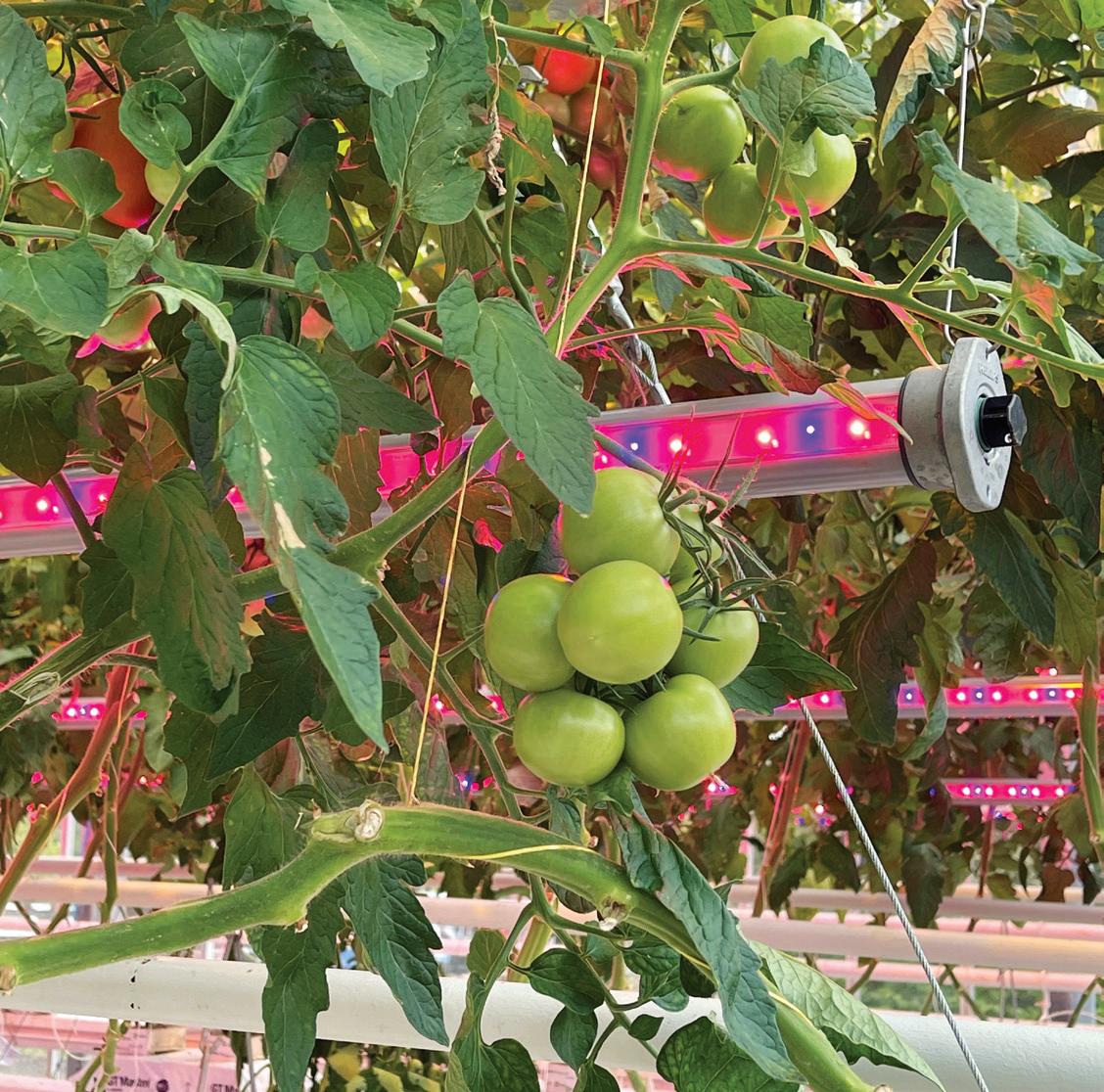
of the county is a key contribution to keeping the nation healthy. With only 17% of the fruit and 58% of the veg consumed annually produced on these shores, new talent will be needed to create greater food security going forward.
I was delighted to be invited to the opening. Apart from how good it was to be back at the college, it was a pleasure to see so many key players from the county – business, political, farming and education - all in attendance. Backing the partnership was a real sign of support for the college and showcased great potential for horticulture.

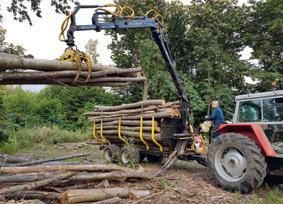
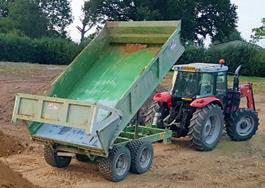



While reaching a business milestone sounds impressive, it only benefits the customer if it can be used to deliver a better service.
That vital link between longevity and tangible value to the customer certainly exists in the case of NP Seymour Ltd, where 50 years in business has created a pool of knowledge and experience that directly benefits the many fruit, hop and vineyard customers it serves

across the South East and beyond.
Such is the company’s impressive reputation as a specialist Fendt dealer that the “and beyond” referenced above has long seen the family-run firm supplying growers in all corners of England and Wales as well as the fruit regions of Scotland.
“Unlike other dealers who prioritise their arable and forage harvesting offerings, we focus exclusively on Fendt’s 200 VFP Vario

range. This means that we often have the right models in stock and ready to go, which is why growers come to us instead of their local dealer,” explained Claire Seymour, sales and marketing director and daughter of founder Nick Seymour.
“We have the specialist industry knowledge and expertise to go beyond providing the machinery and instead give customers, particularly newcomers to the industry, the


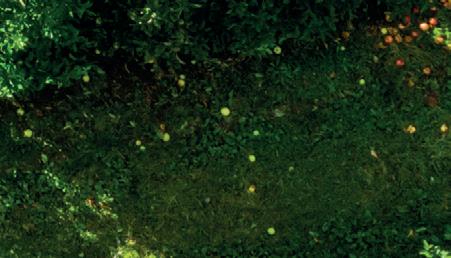




help they need to spec up a tractor – or other piece of kit – that will do the job properly because it has been set up for their long-term requirements.”
There are many options that need to be considered, from nice-to-have add-ons to things that will make a big difference to a grower’s bottom line.
“There is nothing worse than seeing a grower struggle because their tractor does not have enough spool valves or hydraulic capability to run the machines they need to manage their orchard or vineyard efficiently and cost-effectively,” continued Claire.
“It’s relatively easy to set up in business to supply machinery to fruit growers and vineyard owners, but to make sure that the customer ends up with exactly what they need takes a lot more experience and know-how.”
In the case of NP Seymour, delivering
exactly what the farm or vineyard manager needs goes beyond just making sure that the right tractor is selected. The business has a well-deserved reputation for supplying a wide range of specialist machinery, equipment and hand-held tools, as well as being able to adapt machinery, design bespoke attachments and do all kinds of fabrication work at its Avon Works base in Kent.
“The majority of specialist machinery manufacturers design their products to fit the Fendt 200 VFP Vario range. When customers with other brands of tractor come to us for equipment, we already know what challenges they’re likely to face. We’ve worked with it all and our skilled workshop team is well versed in creating brackets and frames and making adjustments to ensure the products fit and work as they should from the moment they’re delivered,” said Claire.

It’s that level of expertise that sets the company, set up by Nick Seymour in 1974, apart. But it did not happen overnight. As well as celebrating 50 years since the start of NP Seymour, 2024 also marks an impressive 40 years since it became a Fendt specialist dealer supplying the 200 VFP series of vineyard and fruit-focused tractors.
The relationship has stood the test of time because, in Claire’s view, the Fendt range is far and away the 'best in show' when it comes to specialist machinery that’s dedicated to supporting fruit, hop and vine growers.
“Unlike a lot of other fruit and vineyard tractors, the Fendt range isn’t just a cut-down version of the main range but is designed from the bottom up to do that specific job, and it does it consistently and reliably,” she commented.
















www.npseymour.co.uk




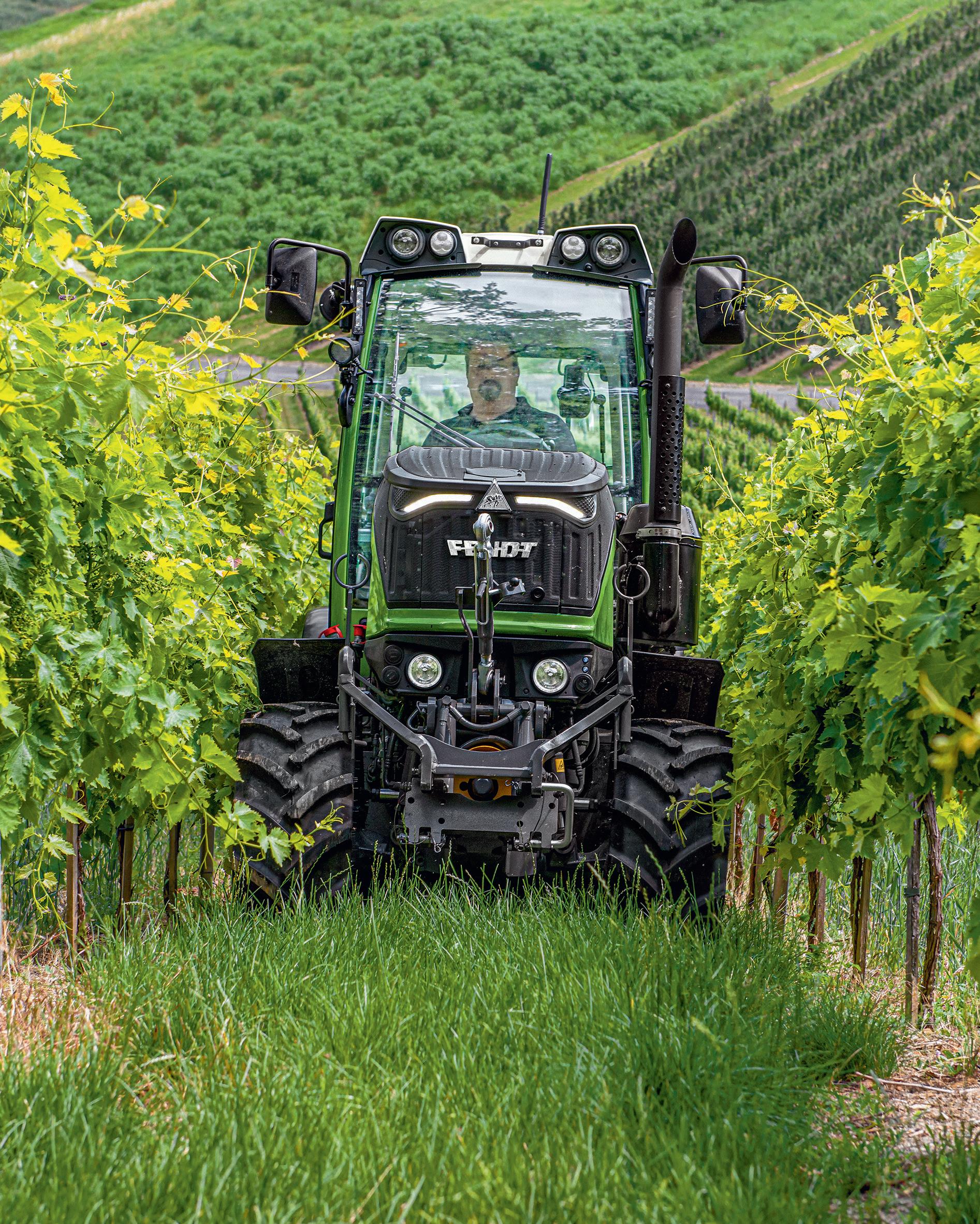




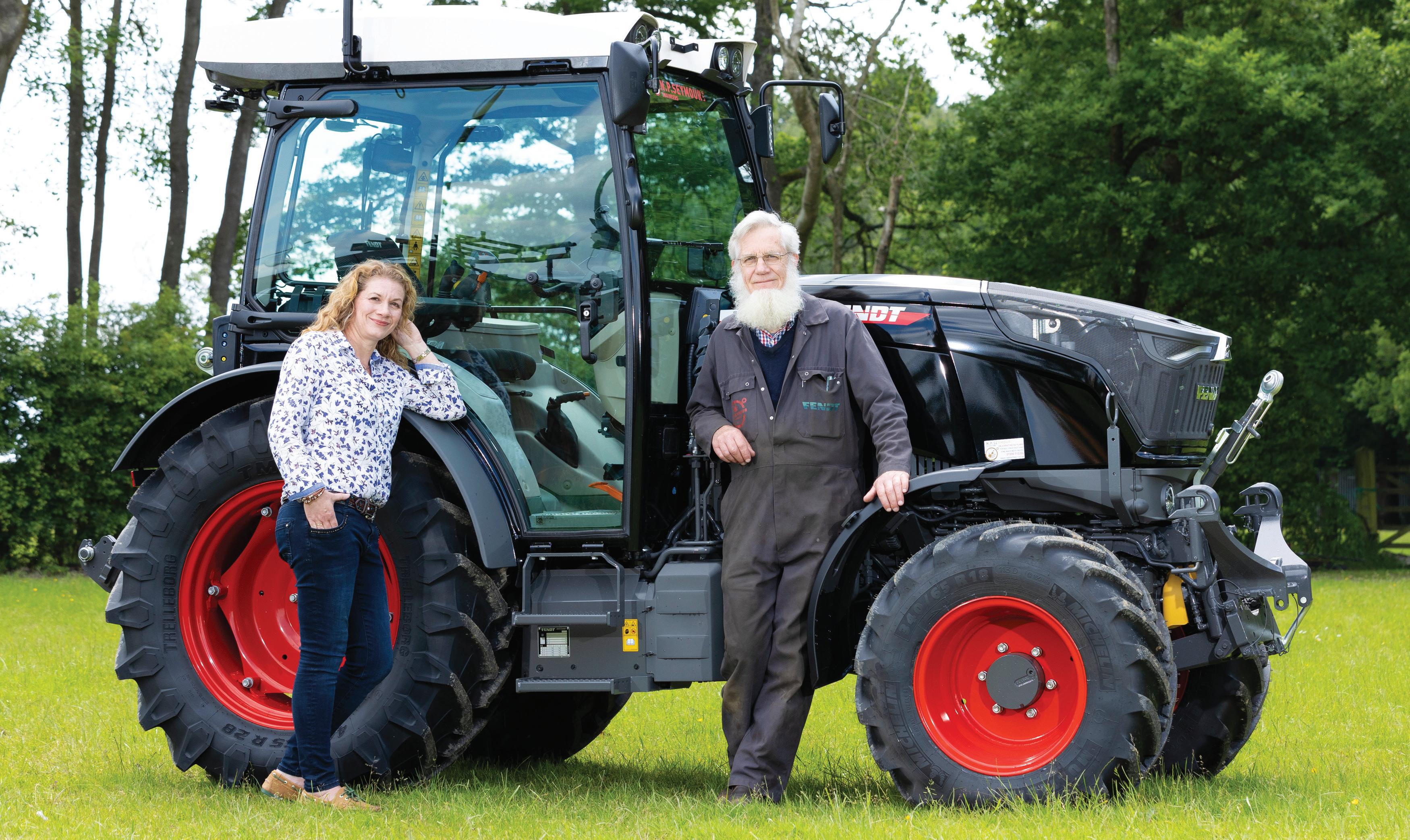
Market testing, albeit not particularly scientific, has proved the point. “On occasions over the years we have offered alternatives from other manufacturers, but our customers always come back to Fendt because they know it’s the best choice for their business,” Claire explained.
Nick Seymour, who is still involved in the workshop side of the business half a century on, started out offering mobile engineering services. He expanded into machinery sales as customers began choosing to buy new equipment rather than asking him to repair their existing sprayers and other kit.
At a blackcurrant conference in Herefordshire in 1984 he got chatting to friend and fellow engineer Bob Chapman, of



Bavenhill Mechanics, who introduced him to Fendt.
“Dad was not looking to supply tractors but was immediately persuaded that their orchard and vineyard range was head and shoulders above the rest. He became a Fendt specialist dealer, and the rest is history,” Claire recalled.
That relationship has grown over the years, and when allied to N P Seymour’s long-standing team means there’s not much the dealership doesn’t know about Fendt’s specialist 200 VFP tractors.
“The expansion of viticulture in this part of the country means there are other dealerships, but NP Seymour has a clear advantage when it comes to helping growers
Nick and Barbara Seymour first visited the Fendt factory in Germany in 1985
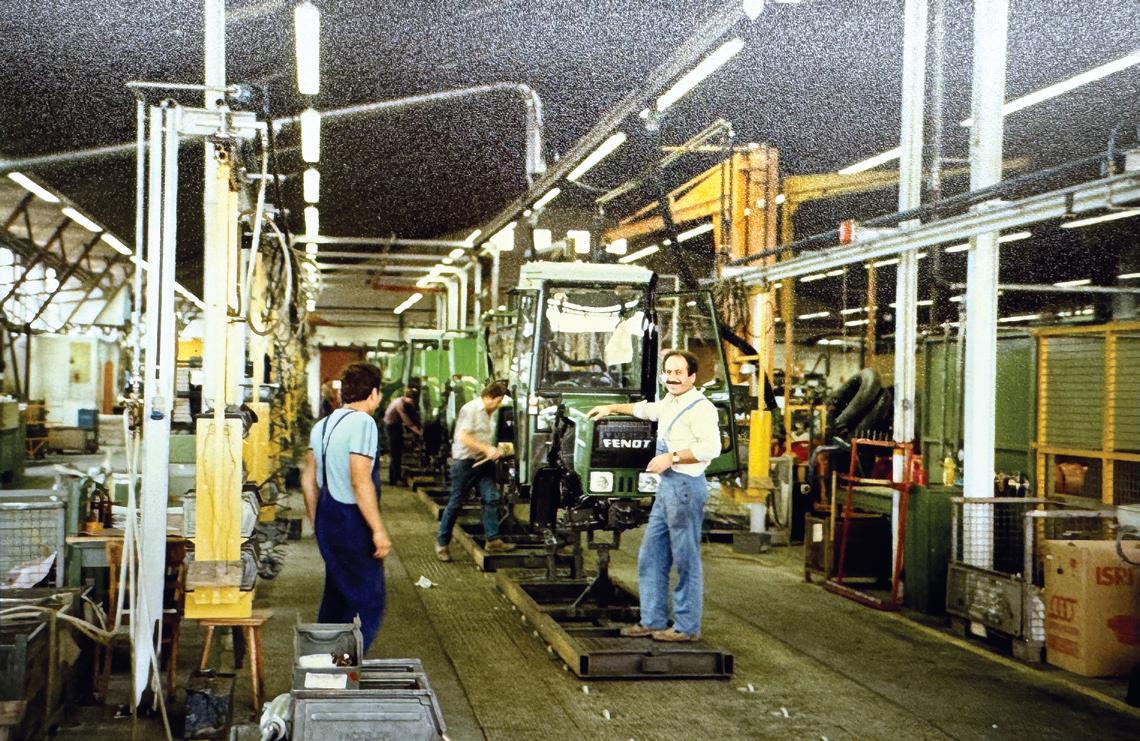
get the most out of their new machine and the equipment they want to pair with it,” said Claire.
“On the service and workshop side, our team includes engineers like Greg Surowiec, who has been with us for the past 15 years, and Mark Maynard, who has been part of the team for more than a decade. There’s very little they don’t know about Fendts and their capabilities and how to keep them running smoothly. They can troubleshoot issues in a heartbeat and have the skills to keep the tractors performing at their best for decades.”
With one eye always on the future, Claire headed to Fendt Germany in May this year to see the manufacturer’s new fully electric tractor, the E100V Vario. >>



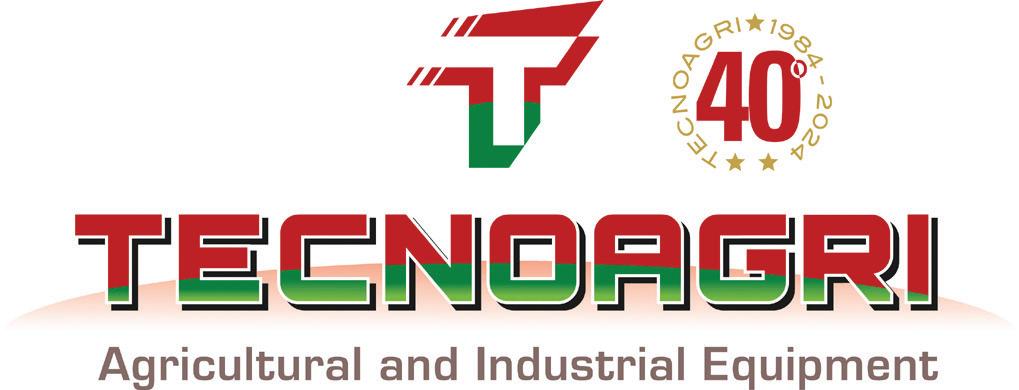
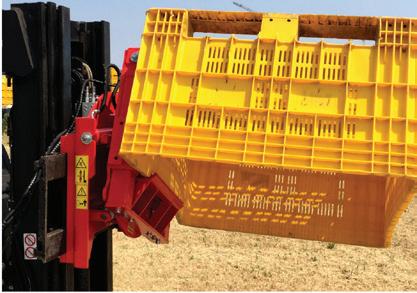

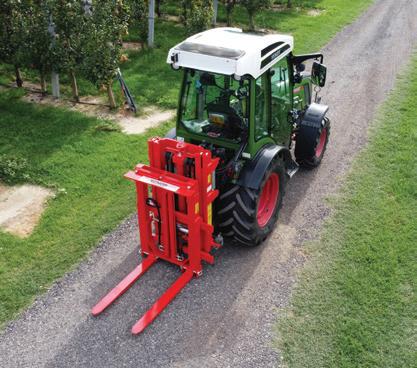


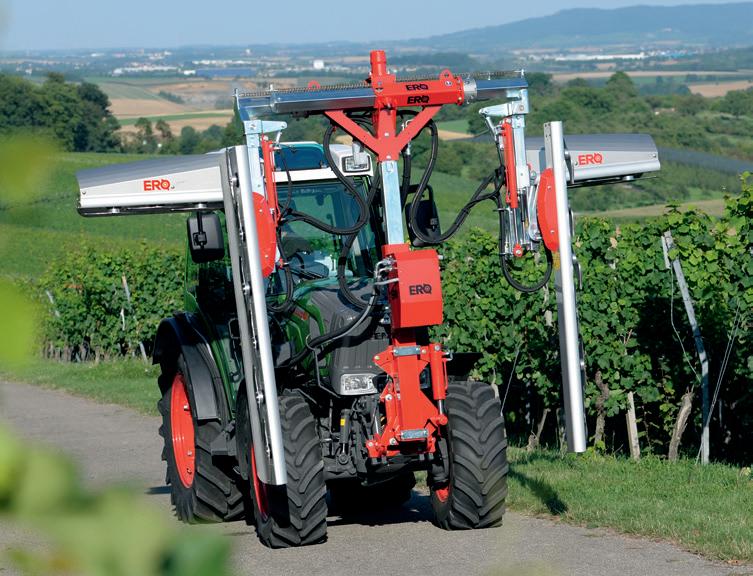
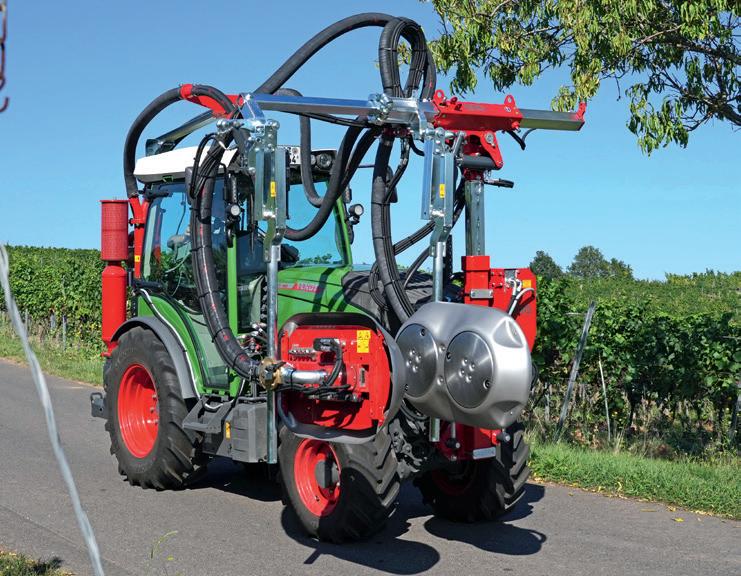


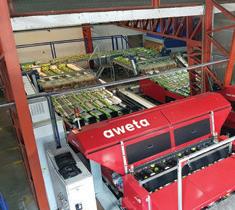







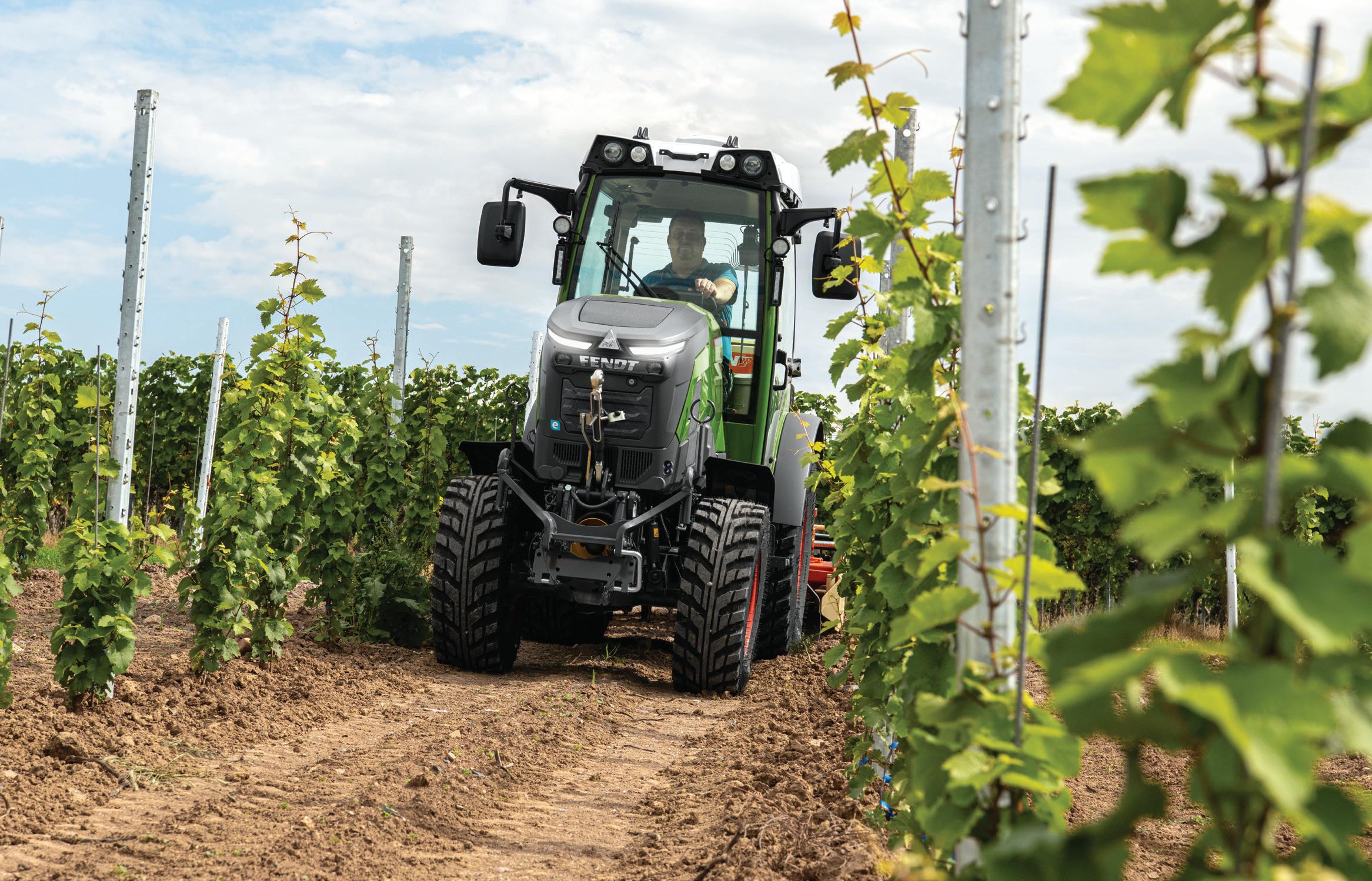

The electric version has all the functionality of the existing 200 VFP range but with a battery instead of an engine that can be used in eco, dynamic or dynamic-plus modes.
“Looking at the design and specification, in theory there’s nothing the diesel-engined version can do that the electric model won’t be able to match in terms of power and functionality,” said Claire.
Maintenance costs are expected to be reduced by a third when compared to internal combustion engine-powered machines, while growers can choose to ‘refuel’ using cheap renewable sources such as solar.
It’s not just new machines that leave NP Seymour’s purpose-built Avon Works yard. Fendts hold their value so well that used tractors are much in demand, and rarely make it as far as the stock list.
“Once people get to know there’s a part exchange tractor on the way in, it’s snapped up,” Claire added. “That also means we can offer competitive part exchange deals for those looking to upgrade their fleet used tractors.”
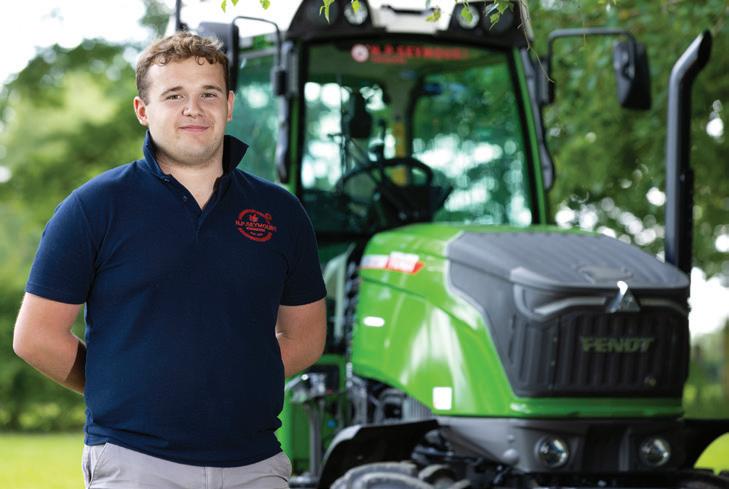
The advice on offer from NP Seymour is particularly useful in supporting new vineyard entrants who may not have experience or knowledge of the vast range of specialist machinery available and for whom understanding exactly what they need from their shiny new tractor is likely to benefit from some guidance.
“Guesswork can be expensive, and we take that risk away,” commented Claire, who heads up a sales team which includes Tim Sillence and, on the viticulture side, Sam Barnes.
“Both Tim and Sam have a wealth of practical experience operating the machinery in a range of planting styles and soil types. We will never sell something a grower doesn’t need now or in the long term, and will always be straight to the point in explaining what is going to work for their individual set-up and why.”
Alongside tractors, the dealership has built up an impressive list of franchises over the past half century.
In the 1980s, around the same time as NP Seymour started working with Fendt, the
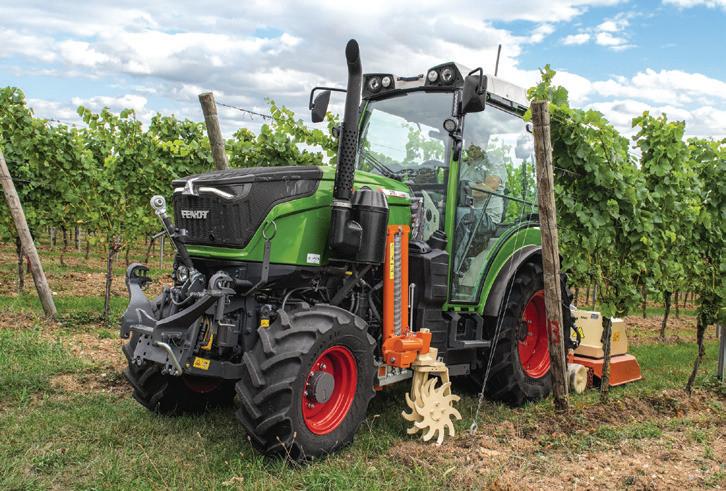
dealership also started supplying the Braun range of mechanical weeders, Carrarospray sprayers from OCLL and the Fischer range of mowers.
Today, the Braun Rollhacke rotary star tiller remains the most popular mechanical weeder on the market and the clear weapon of choice for orchard and vineyard managers across the UK, having proved itself well-adapted to different soil types.
“As well as the famous Rollhacke, Braun’s modular tool carrier system can be equipped with a range of tools, including horizontal finger weeders, rotary tillers, scalloped discs and demounders, to offers growers access to a well-rounded and extremely comprehensive mechanical weeding set-up,” said Claire.
“The German manufacturer's vari-width Alpha mower can also be fitted with what Braun calls a vine stem cleaner. Initially designed for bud rubbing, the flat rubber paddles on this head can be replaced with white strimmer cord to provide effective weed removal up to the trunk while mowing.”

SPECIALISTS IN NEW AND USED FENDT 200 V/F/P TRACTORS AND ESSENTIAL MACHINERY FOR FRUIT AND VINE GROWERS.
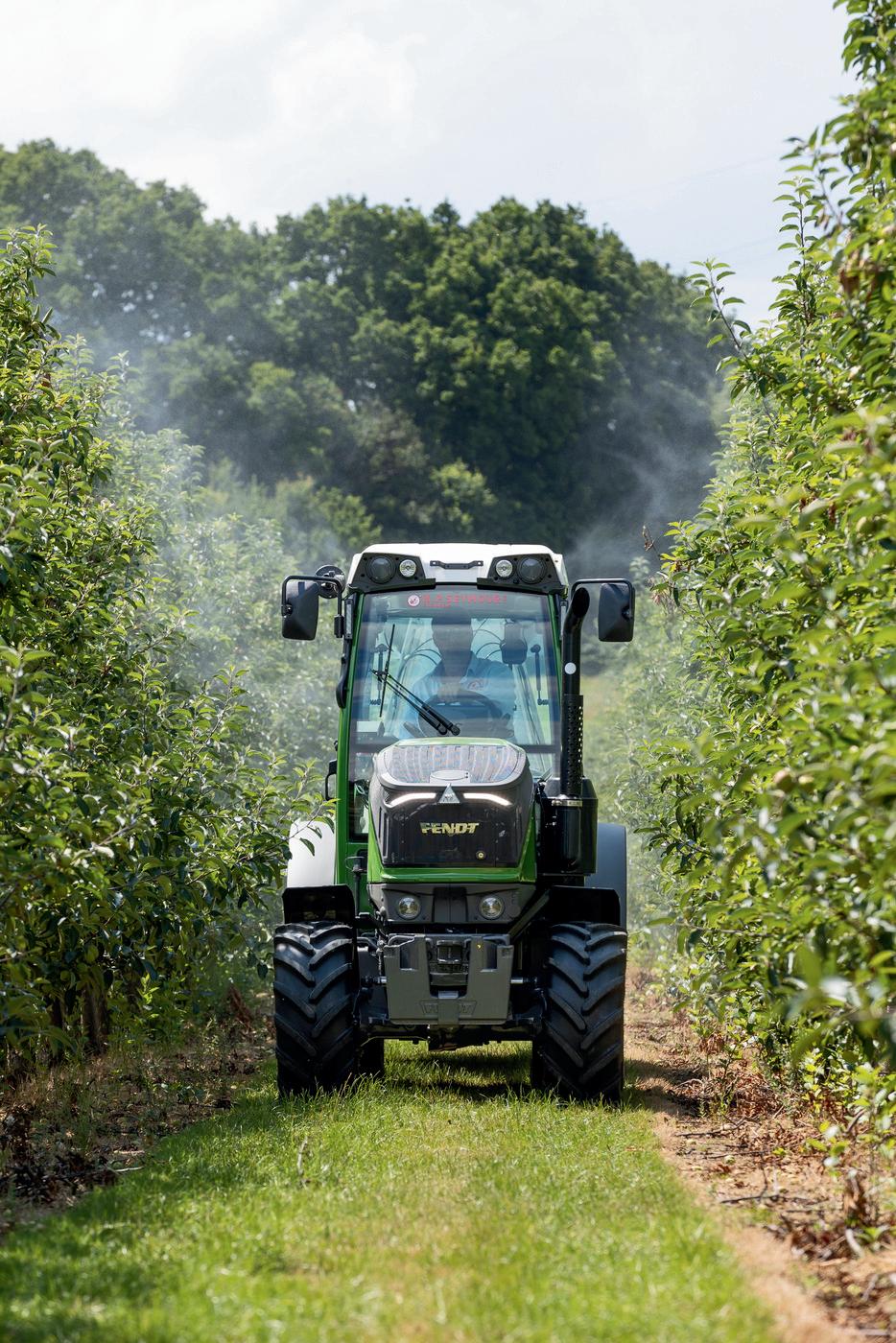
0% FINANCE SCHEMES AVAILABLE ON NEW FENDTS STC.
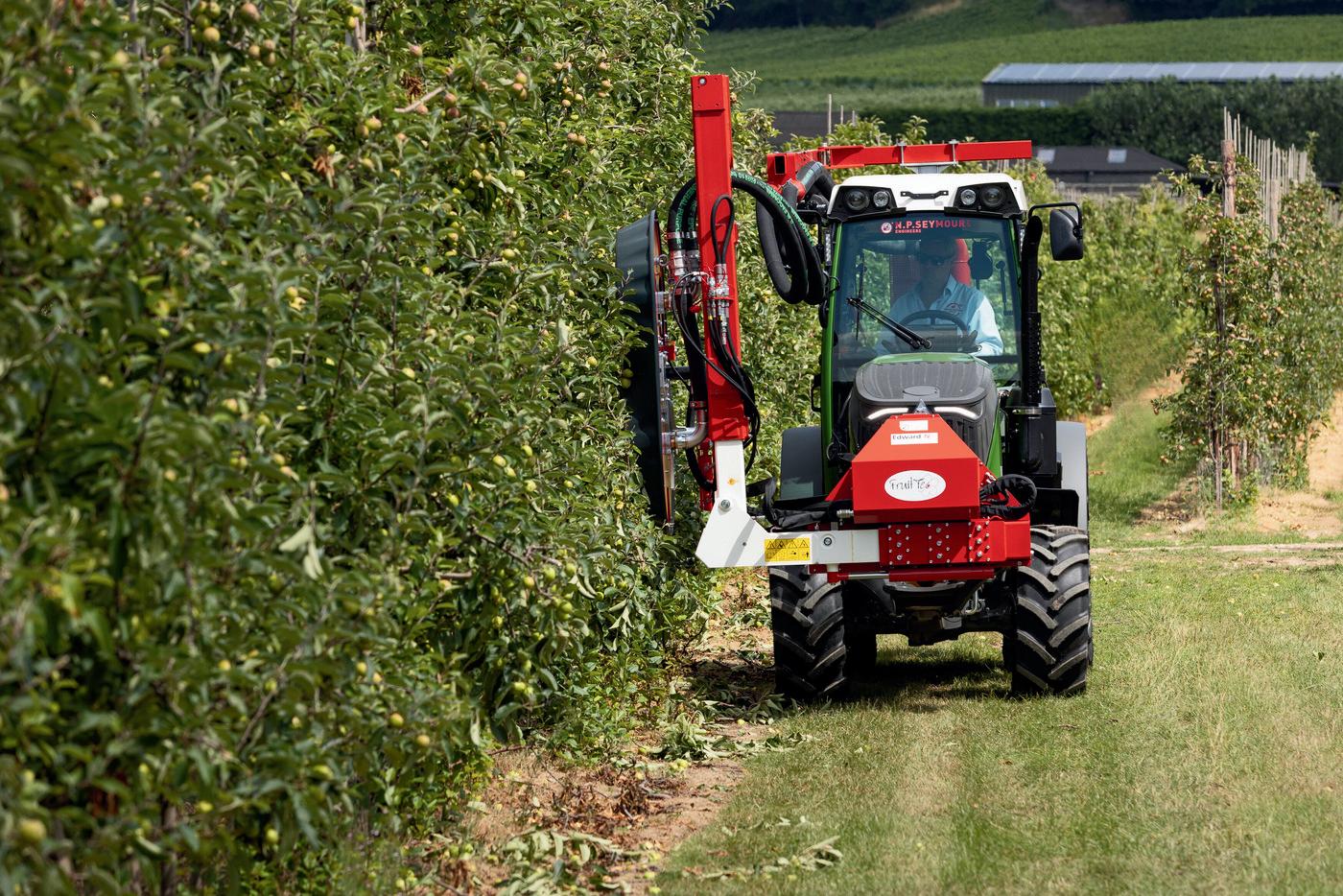
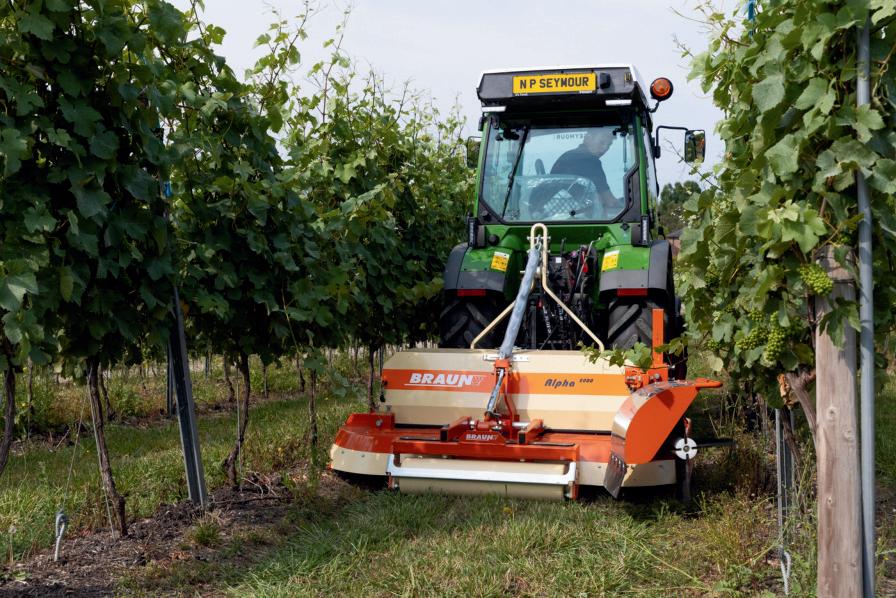
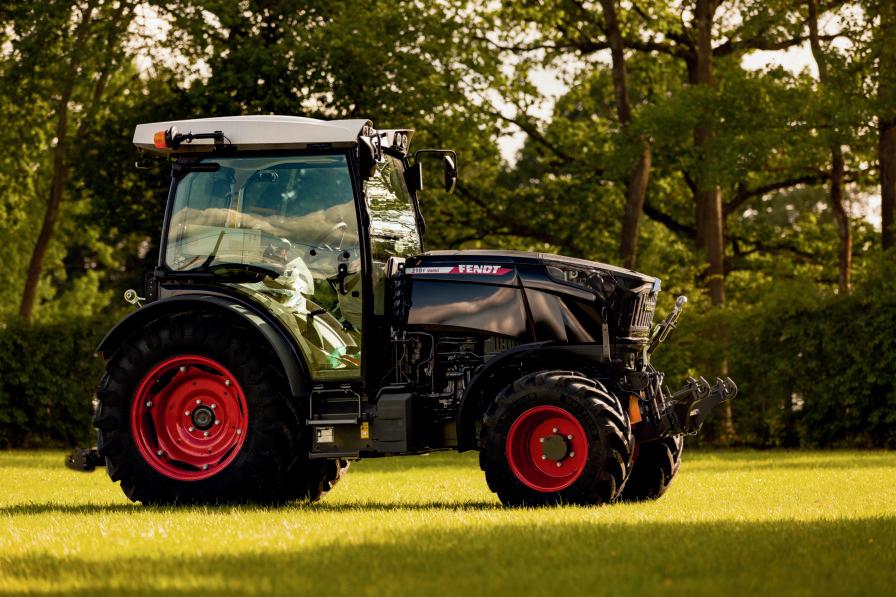




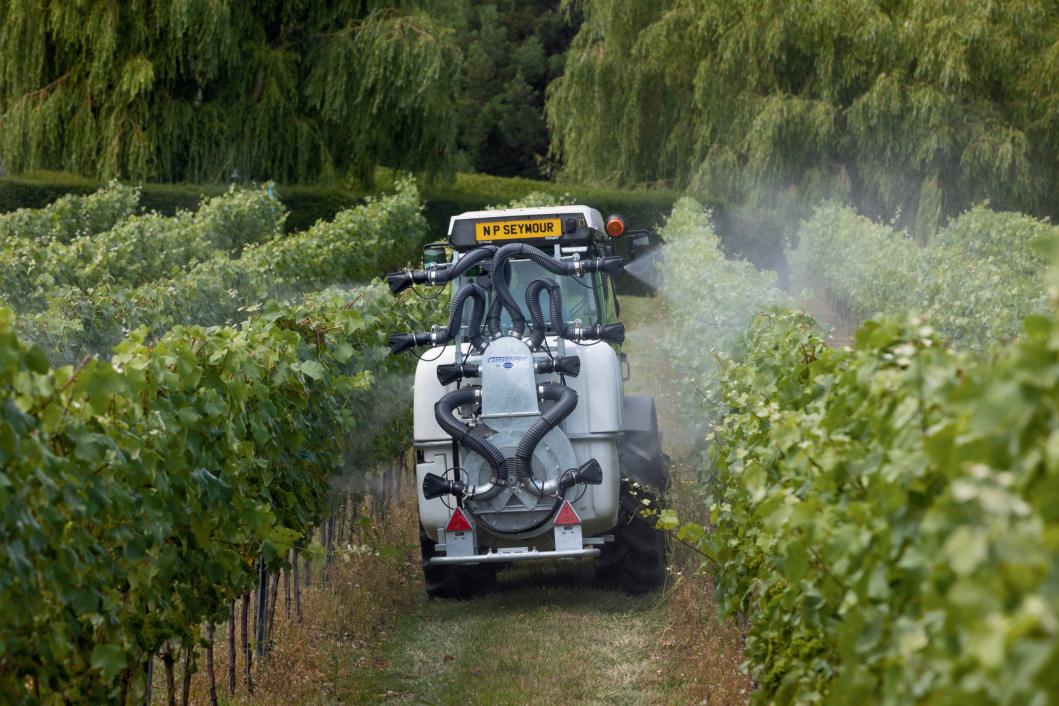



Catch up with the NP Seymour team and fellow growers while watching a range of specialist fruit and vine machinery at work.
ORCHARD DAY - THURSDAY 18 JULY 2024 - 10AM - 3PM

VINEYARD DAY - FRIDAY 19 JULY 2024 - 10AM - 3PM

Amsbury Farm, East St, Hunton, Maidstone, ME15 0QY by kind permission of Clive Baxter
RSVP today by emailing hello@npseymour.co.uk
























Looking ahead to autumn 2024, there are several new wheat and barley varieties worthy of attention, but with many sections the offer has not changed dramatically this year. Peter Brundle, Hutchinsons southern seed manager, highlights his wheat and barley recommendations for drilling this autumn.
Following on from the new genetics for BYDV-tolerant hybrid barley launched in autumn 2023, we will see BYDV resistant barley for the first time this season in the form of SY Kestrel. However, availability will be extremely limited, with only a few hundred packs available.
The Hyvido share of the feed barley market is likely to remain at similar levels this autumn at circa 27%, although there will be greater growth from two-row barleys in the shape of both LG Caravelle and the newly recommended LG Capitol.
KWS Tardis will undoubtedly remain a popular choice, having taken the market by storm in autumn 2022 and followed up with increased market share in autumn 2023. KWS have their first hybrid barley in the guise of KWS Inys, which offers high yields, stiff straw and low brackling. Early maturity (-1) coupled with good untreated yield provides a different route to market for hybrid barley.
Crusoe and RGT Illustrious will be the millers’ preferred quality options, as they were last year. Newly recommended SY Cheer, while cleaner than the tried and tested varieties, has yet to gain full approval as a Group 1, and will be further evaluated on this year’s performance.

Skyfall and Zyatt still hold a significant presence within the sector despite needing greater management, particularly for yellow rust.
There are two new outstanding feed wheat considerations on the back of the successful KWS Dawsum and Champion, with LG Redwald having set the standard for yield potential.
As highlighted a year ago, Bamford has strolled on to the AHDB-Recommended List (RL) as the highest yielding group 3 wheat, offering yields at least 6% higher than its contemporaries while offering the potential for biscuit making (with premium), distilling and export; only KWS Extase has higher untreated yield. Its regional performance in the west merits further consideration.
LG Beowulf has joined Champion at the top of the RL, providing excellent yield in the north and stiff straw (8s for both treated and untreated resistance to lodging), excellent grain quality, good yellow rust resistance and decent for septoria as well. It also offers OWBM resistance.
Blackstone is the new soft group 4 from Elsoms to challenge LG Redwald, with excellent yellow rust resistance and superior standing ability and bushel weight.
Skyfall offers the greatest drilling window while still being the only variety in group 1 and 2 to offer orange wheat blossom midge (OWBM) resistance.
KWS Extase will remain the market leader in the group 2 sector, while KWS Ultimatum offers potential for the north.




Gleam still appears to have remarkable consistency and Graham remains a popular choice in the west. It is, of course, also suitable for early drilling which we are likely to see more of this autumn.


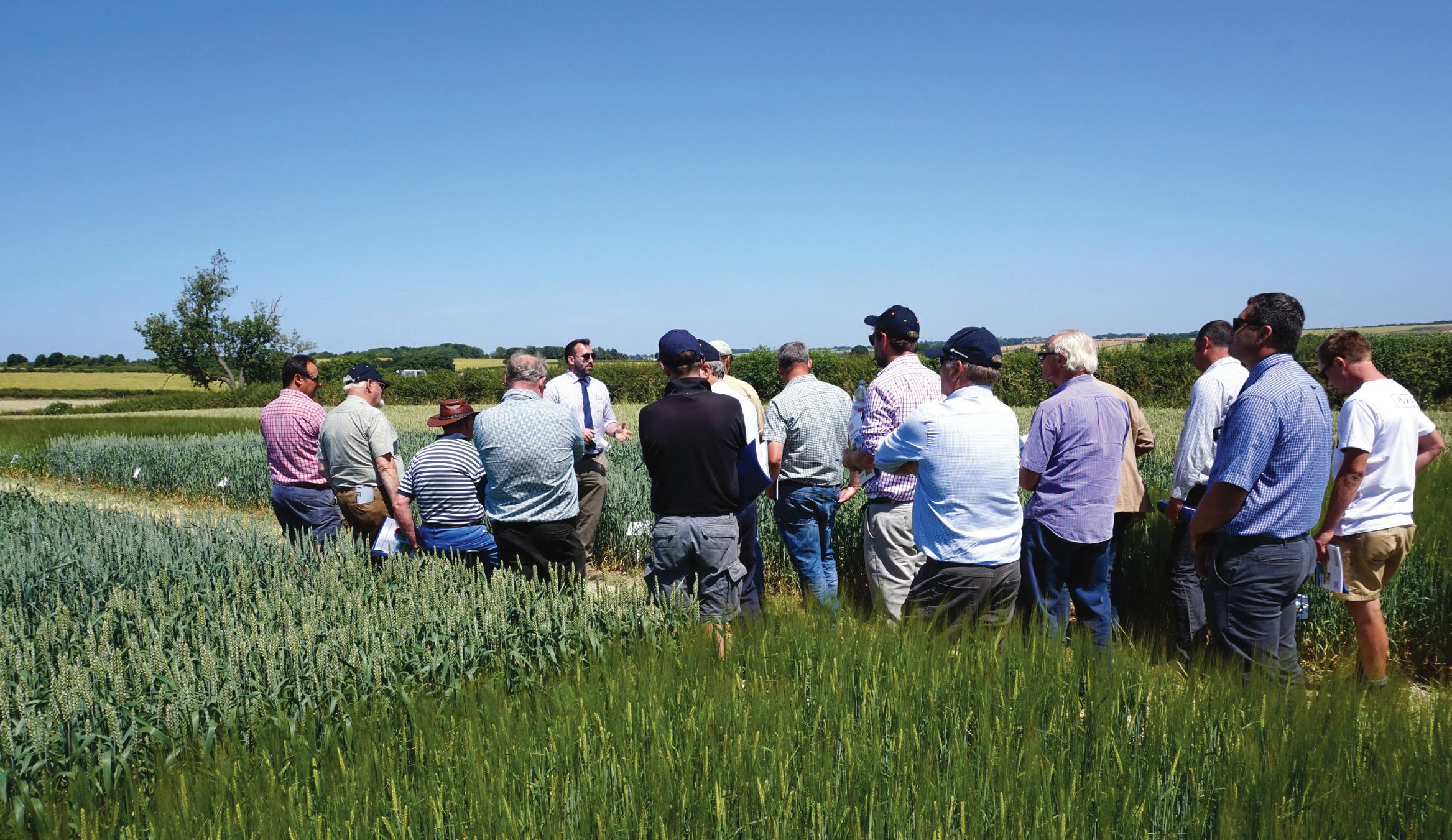
Product Active Mode of Action Application
Sustain (KAN)
Limus
NBPT
NBPT + NPPT
Piamin 2NPT
Nutrisphere-N (Origin Advanced N)
Piagran Pro
Maleic-itaconic copolymer
2NPT
Urease inhibitor
Urease inhibitor
Urease inhibitor
Urease and nitrification inhibitor
Urease inhibitor
Urea - coating
Urea – coating
Urea – coating
Urea – coating
Urea - incorporated
[NBPT N-(n-butyl) thiophosphoric triamide] [2NPT N-(2-nitrophenyl) phosphoric triamide] [NPPT N-(n-propyl) thiophosphoric triamide] [MPA N - ((3 (5) -methyl-1H-pyrazol-1-yl) methyl) acetamide]
The new season ‘bun fight’ for the Nitram market has started once again, but have you asked yourself whether or not you should just be buying at the first price your local grain trader offers you? What else is out there? What else is on offer? Should you be considering other materials?
UK farmers have been huge supporters of Nitram 34.5%, particularly due to its efficiency in our maritime climate. When running at full capacity, CF Industries (formerly Growhow) would have had the capacity to produce 1.1m tonnes of nitrogen, but with the Ince factory shut, we are now looking at UK production nearer to 700,000 tonnes.
33.5% – GRANULAR AMMONIUM NITRATE
If spreading 36m, you could consider 33.5%, a granular material rather than a prill. These are reliable products that can spread 36m. Supply can be difficult as it is only produced and imported from Grupa Azoty, LAT (formerly Borealis) and Yara. This year you would be looking at around 3p/kilo of nitrogen premium compared to Nitram
AMMONIUM NITRATE 34.4%
The quality of imported nitrogen has improved over the years and could be considered. The two main brands imported into the UK are Lithan 34.4%, produced by Achema, and Pulan 34.4% produced by
This month’s contribution comes from Emma Martin, managing director of Crop Advisors.
Grupa Azoty, the second largest producer in the EU. Currently there is no material saving over Nitram.
The urea market is well established in the UK, but this year saw the mandatory use of urease inhibitors on urea applied from 1 April to 14 January each year to reduce ammonia emissions from agriculture by 2030. With the addition of urease inhibitors, we are looking at a cost saving of around 13p/kilo of nitrogen, compared with uninhibited urea at around 22p/kilo of nitrogen saving over Nitram.
Urease inhibitors reduce the urease enzyme activity and slow the rate of hydrolysis, stabilising the nitrogen, preventing environmental loss and ensuring that nitrogen will be available.
Nitrification inhibitors are chemical compounds that reduce nitrous oxide emissions by suppressing the action of microbes known as nitrifiers, which covert nitrogen into nitrate in the soil. Supressing the
microbe’s nitrification inhibitors reduces the risk of nitrate leaching and denitrification. When the phone rings in the future about early season Nitram, have the confidence to know that there are alternative choices available and that you don’t need to take the first price offered. Be assured that all these alternatives offer your farming business security of supply, and that’s without considering liquid options.
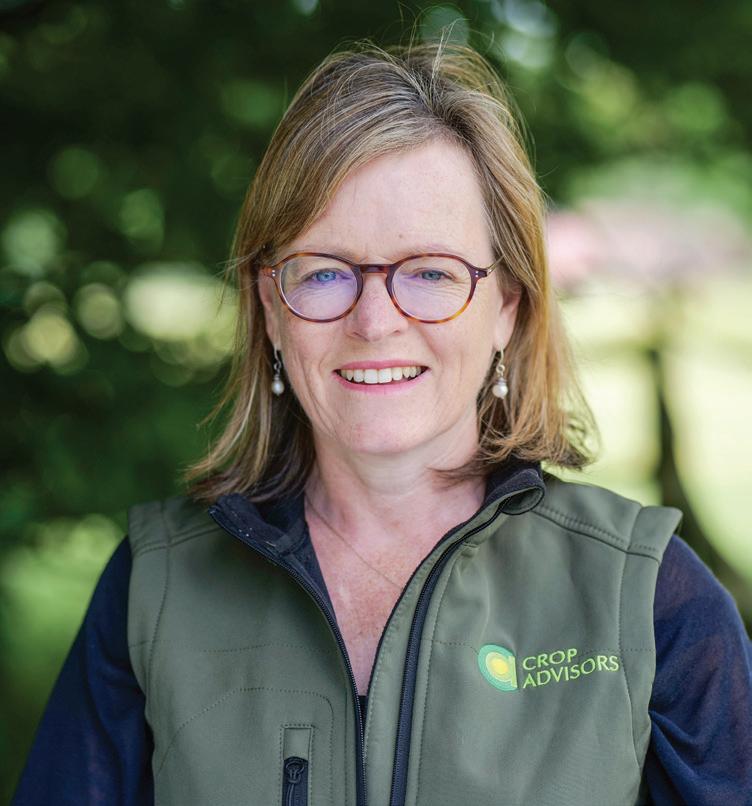








Promises, promises, or lies, lies and more lies? By the time you read this I am sure that we will have a new government in power. Hopefully normality will resume, although I fear anarchy may prevail. Possibly another political party that claims to have all the answers to all the issues (if only we could all claim the same).
Each and every party seems to have had a manifesto full of unachievable aspirations that amount to copious amounts of lies. According to one party, if you do not rely on government support you cannot be classed as working class. Any ideas as to how a farmer would be classed when working all hours?
I had always promised myself that I wouldn’t write about politics in this article. Firstly, it is something that I have limited interest in, but while each and every politician claims they are different, fundamentally they are mostly career orientated politicians who have never had a job in a real-life situation and seemingly have no desire to investigate the real world.
One of the most alarming statements to have appeared is that one party will abolish the badger trial/cull. This will have a devastating impact on the dairy/beef industry in the UK.
After months of flooding, high production costs and low returns, we need a government to support the future of farming in the UK. A government that will rebuild confidence within the farming community and deliver a thriving, profitable farming sector. The population needs affordable food produced in a sustainable but realistic manner. For many decades governments have failed to provide



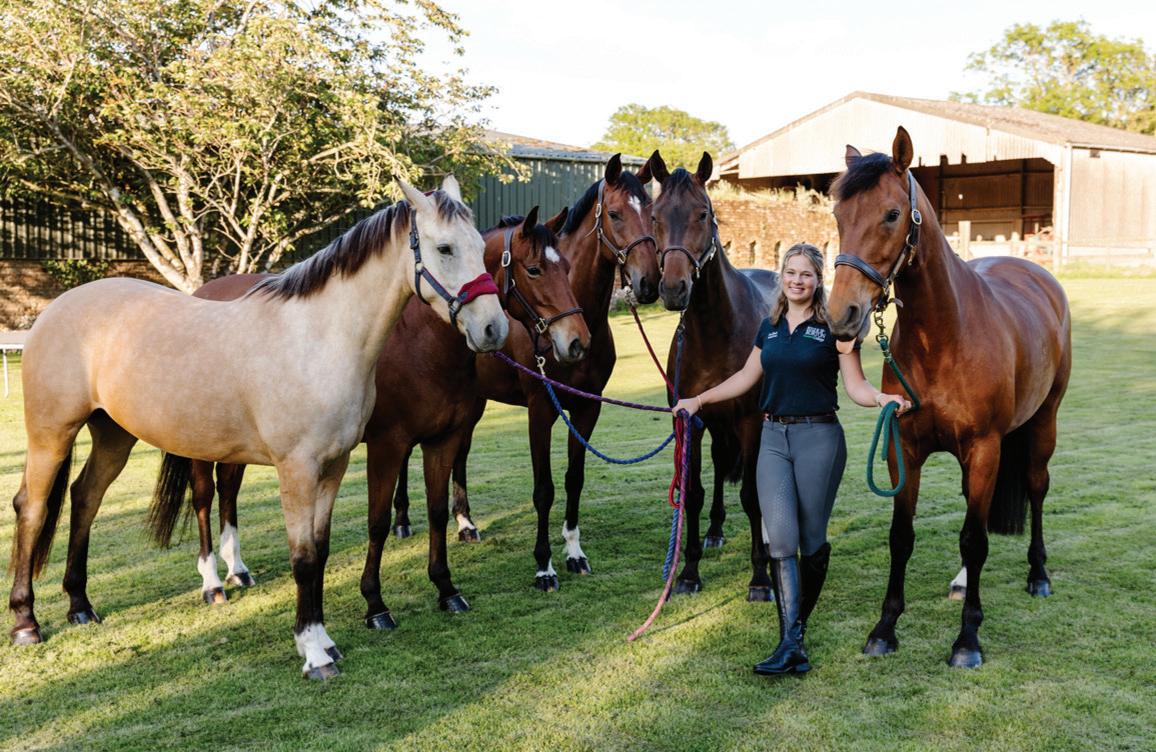

the conditions needed for rural growth. We can only hope that a new government makes clear progress on all these challenges that farmers face on a daily/weekly basis. I fear that we could be disappointed.
Enough about politics and more about the real world. Our super English Springer Spaniel has somehow managed to rear 11 puppies all by herself; 10 girls and only one boy. She really is a dog of a lifetime. Ted has loved playing with them, and we shall all be sad when most of them disappear to new homes. They have been complete time wasters, but they are all so lovely.
The summer holidays are getting closer on a daily basis, and the excitement is building. The weather plays a huge part for farmers, and with continued rain and cooler temperatures, the maize has been slow to start and needed a little nurturing. In general, the crops are looking well, although a little more sun in June would have been more than welcome. I have never before lit a fire in June, but this year we had two.
The seasons seem to be around six weeks behind. The combine is serviced and ready to go and second cut silage is now nearing completion. This year has been rather stressful for Fergus in gauging the right time to go mowing. Dodging the showers has become the new game around here.
The grain stores are clean and ready to go for another year, so now we play the waiting game. Fingers crossed for some sunshine.
The swimming pool has been erected and Ted has been taking a dip as soon as school is out. Zara has been competing with great success and has been selected to represent the U18s at Bishop Burton.
We have been asking ourselves how the future will be for the youth of today; unfortunately Monty was assaulted on a train returning from Tonbridge by a youth who was clearly high on drugs. Being punched in the face for no apparent reason in a completely unprovoked attack is very unnerving. In time Monty will recover and move on, but I guess this is another issue that the youth of today have to deal with. British transport police have evidence via CCTV, Monty also has two creditable witnesses and two other people have reported a similar incident on the same day. We can only hope that they catch the culprit.
Until next time, stay safe.



It’s been a tricky season. First a wet autumn, then a wet spring.
But, thanks to continued wet weather in May and June, at least my wheat crop, which struggled to emerge through the biblical floods of October, has filled out better than I dared hope. Similarly, my spring beans, not drilled until late April, have now grown away well and show promise.
But while I’m feeling upbeat about my harvest prospects, I’m still fretting about new-crop grain prices. It doesn’t matter how much concern there is about drought in Russia or the US, nothing lifts them.
I could have written everything you’ve read so far in this article about the ups and downs of a crop growing season and grumbles about low grain prices most of the years I’ve been arable farming. But now there is a new worry. Is all this hassle really worth it, given the money on offer from the Sustainable Farming Incentive (SFI) and other government agrienvironment schemes?
Most farmers are finding these payments tempting, so much so that the government has had to introduce a 25% limit on how much land individual growers can enter into the SFI. Some were piling into schemes to shut down 80% while others were even taking their whole farms out of arable production by taking options like ‘flower rich blocks’, ‘pollen and nectar flower mix’ and ‘winter bird food on arable land’.
But even with a limit now put on the more generous options, there are still plenty of other SFI ‘actions’ for growers to consider. How about sowing a ‘herbal ley’ or a ‘legume fallow’? Neither produces a crop but both represent a low cost/low risk option as a break to wheat, which is very appealing to those of us who have experienced rollercoaster yields, particularly from spring break crops like rape, peas, beans and barley.
What will be the effect on our national grain harvest if we all rush large hectareages into SFI? If what I hear down the pub or read in the farming press is anything to go by, it could be significant. Tens of thousands of farmers have already applied to enter the scheme, but we don’t yet know what impact it’s going to have on production.
No-one’s going to miss me entering my scrubby downland field margins into an SFI option, but if hundreds of thousands of acres of Grade 1 black fen and Grade 2 brick earth are going over to butterflies and bees then we’re soon going to be knocking on Brazil’s door for ever more quantities of imported grain.
Speaking at the Cereals event in June, senior grain trader at Cefetra Chris Wood predicted a UK 2024 wheat harvest of 10.5 million tonnes due to this season’s difficult weather. This is three million tonnes less than the five-year average and four million tonnes less than our domestic consumption.
But if SFI remains on the table as an option for arable farmers, and if arable profitability doesn’t soon improve, it won’t be long before a 10.5 million tonne UK wheat harvest will seem like a large one.









Precision Soil Sampling
Accurately measure your soil pH, health, organic matter and nutrient indexes. Soil sampling provides accurate and reliable measurements of soil health and fertility enabling the targeted and efficient use of fertilisers and lime.
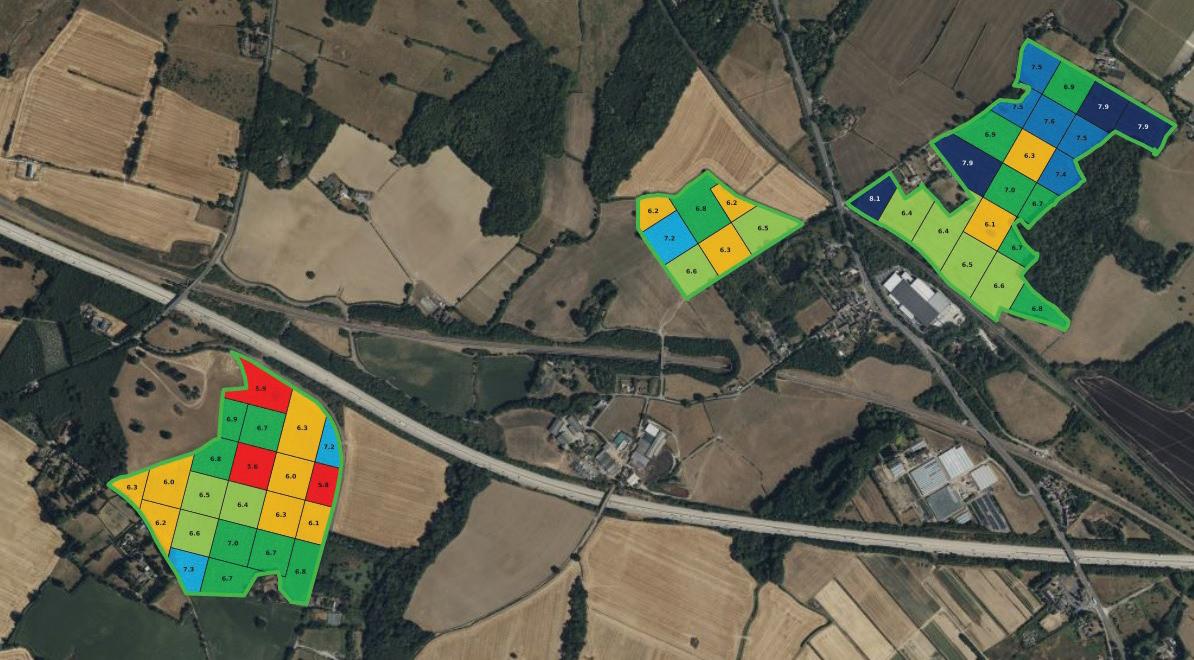
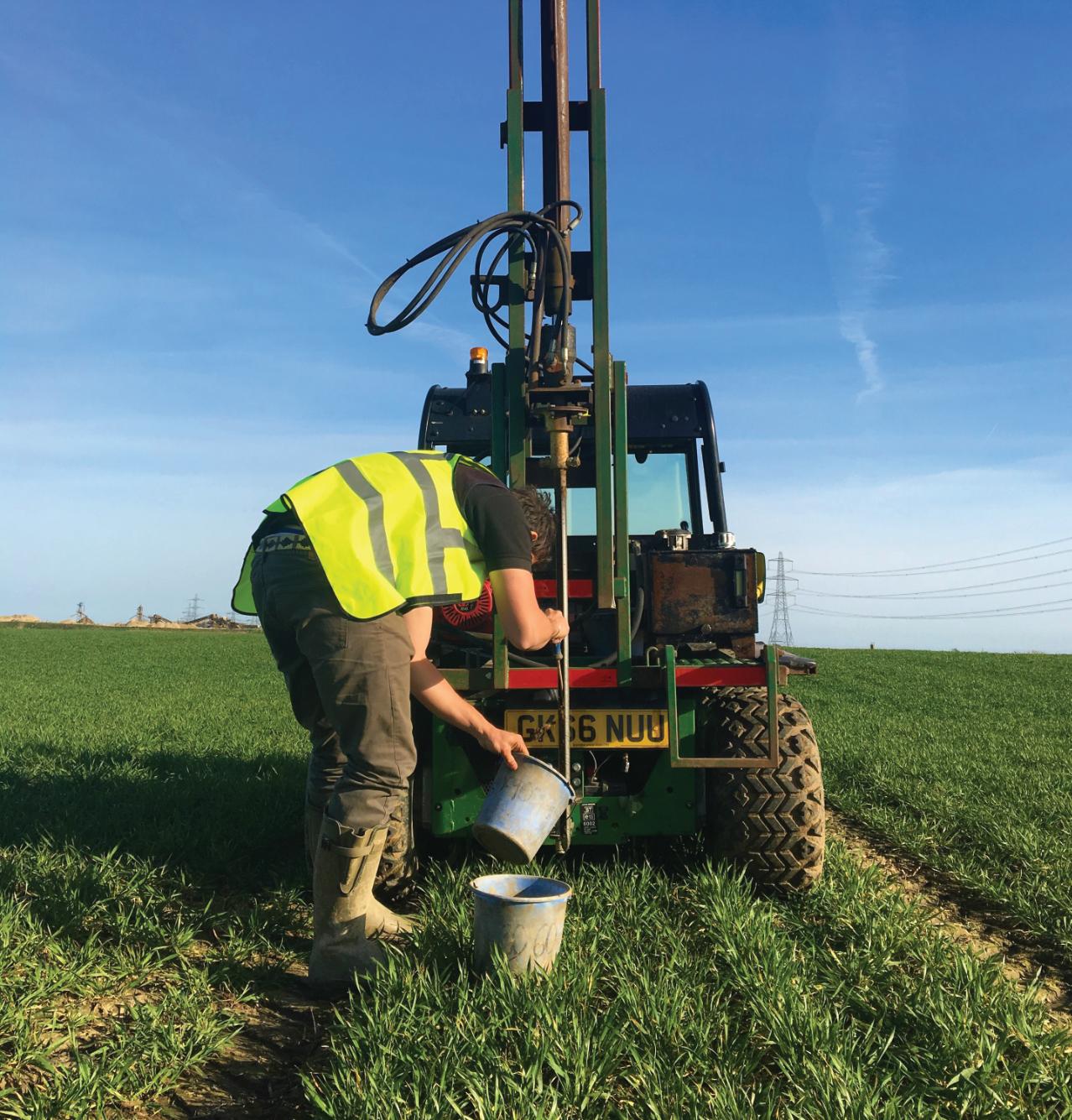
In mid-June, as this report was being written, it was good to see cattle and sheep prices in local livestock markets were still strong, indeed well above 12 months ago. As mentioned many times in previous reports, this is necessary.
Cattle numbers are in line with 12 months ago, with an average of approximately 60 prime beef being sold through Colchester Livestock Market each Tuesday and best cattle still above 300p/kg, with weight seemingly no issue.
What was also good to see is that the O grade-type cattle were also enjoying a strong trade, with the processing beef trade still good. I think it is fair to say that the trade is probably dearer than the wholesalers wish it to be, but numbers are still short and are likely to get shorter.
Best cattle, as stated, are still above 300p/kg and cattle are trading to over £2,300 through livestock markets, with weight, as stated, not a problem. As always local wholesalers have been competing well, with retail butchers also in attendance.
The cull cow trade remains strong and more numbers could be taken, although of course this is the time of year when numbers do drop off.
Store cattle are at exceptionally good levels, with buyers competing strongly for replacement stock and, again, numbers insufficient.







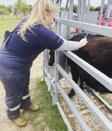

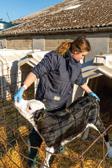

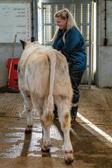





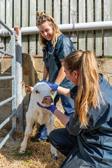




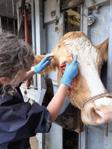














For and on behalf of Stanfords T: 01206 842156 E: info@stanfords-colchester.co.uk www.stanfords-colchester.co.uk
It is to be hoped that the cattle trade continues at current levels as it needs to do so to ensure people stay in business.
The sheep market remains at remarkable levels, with new season lambs coming forward in shorter than normal numbers and trading well over 400p/kg each week for the best and over £200 per head. As would be expected, those lambs not being fed hard food are fetching less money but still looking an excellent return in the 360p/kg to 380p/kg price range. This is some £30 to £40 a head more than 12 months ago, which is remarkable.
Surprisingly, old season lambs continued in good numbers and are also at higher levels than 12 months ago but the market is certainly more selective than it was six weeks ago. We are still, however, seeing best old season lambs at over £180 a head and peaking at over £200 for the very best.
The ewe trade is also strong throughout, at prices that should give some confidence to producers who wish to replace stock this autumn. It will be interesting to see where the shearling trade levels out, but there is concern that numbers will be short. This is a very interesting time for the sheep trade, very much dominated by various festivals and with numbers, again, insufficient throughout the country.
The pig trade continued to be at the same level throughout the period, with little change and numbers meeting demand. Pig prices are still at good levels compared with two years ago. Many small producers are leaving the industry and this has a direct effect on local abattoirs sourcing stock. The cull sow and boar trades are also at a good level, with numbers required.
The cold weather of May and June has slowed down crop growth, but at least it gave a chance for spring crops to get established and, hopefully, we will have a reasonable but certainly not a record harvest.
With the onset of the Sustainable Farming Incentive, many acres of land have been taken out of full production, which is a concern for crop production overall, and certainly it is difficult to see how this current policy will ensure the country is sustainable in home-grown produce. We are in changing times, and it seems matters are changing weekly. Let us hope that summer soon arrives; it was only 11°C in Colchester on 11 June; not a blazing June.
Local agricultural shows are now in full swing, the Suffolk Show being held in May and our local show in the Tendring Hundred area, the Tendring Show, being held on Saturday 13 July. Stanfords will have its annual barbecue at the show that evening and all are welcome. This is a chance to celebrate local farming and also support the local cattle and sheep producers who display stock.
As 2024 flies by, having had a busy few months with store cattle sales and farm dispersal sales, we are now into July and looking forward to our first Friday store lamb sale at the end of the month. Livestock prices have held well so far and the big question is, are store lamb and breeding ewe prices going to follow suit?
With the bulk of our store cattle now sold for this time of year, most people will be busy over the next few months with hay making and harvest. We have had a successful three months around the store cattle ring for all grades of cattle and we hope this will remain strong when we hit the autumn. From March to May we sold a total of 2,900 head of store cattle, averaging £973 per head.
Prime cattle continue to hold a consistent trade, with the best quality 300+p/kg and the majority of others 260p/kg to 280p/kg. Without a doubt cattle numbers are short nationally, which has driven the beef trade to the levels we are seeing, and as a result there is a strong demand for stores, with sheds needing to be re-filled.
The sheep sector has held up well since April, with nearly all remaining hoggets cleared up and a large number of new season lambs coming forward on a weekly basis. In the first two weeks of June we sold 2,400 new season lambs, with the best over 400p/kg and majority of others 360p/kg to 390p/kg. The new season lambs were slower coming forward this year, but once we reached June supply was plentiful, as is to be expected.
Cull ewes have been a strong trade for a few months now, with averages well over £100 per head for the past three months. During the week of 7 May we saw an average of £138 per head for 400 ewes. The Muslim festivals have certainly been driving the trade, with the most recent Qurbani festival taking place in the middle of June.
With cull ewes no longer a by-product, farmers should realise the advantages of keeping their flocks young and selling older ewes while they are fit instead of farming every last year out of them. This should enable
more money to be put towards replacing younger breeding sheep every year (that’s just a thought from an outsider looking in!)
Ewe and lamb couples have seen a good trade this year, with an abundance of grass, although not an awful lot of sunshine, certainly helping matters. We held an early sale of breeding sheep in the middle of May, with the final average for 367 couples being £92 per life. Throughout the spring we had ewes and lambs forward most weeks, with the majority this year £75 - £90 per life with the best £100+. I think this will put into perspective what is to be expected from store lambs come our first Friday store lamb sale on 26 July.
We have held a number of collective and machinery sales over the past few months, a combination of both annual sales and farm dispersal sales. One of these was our annual sale at Headcorn Aerodrome on what was certainly a good day for the ducks. This sale
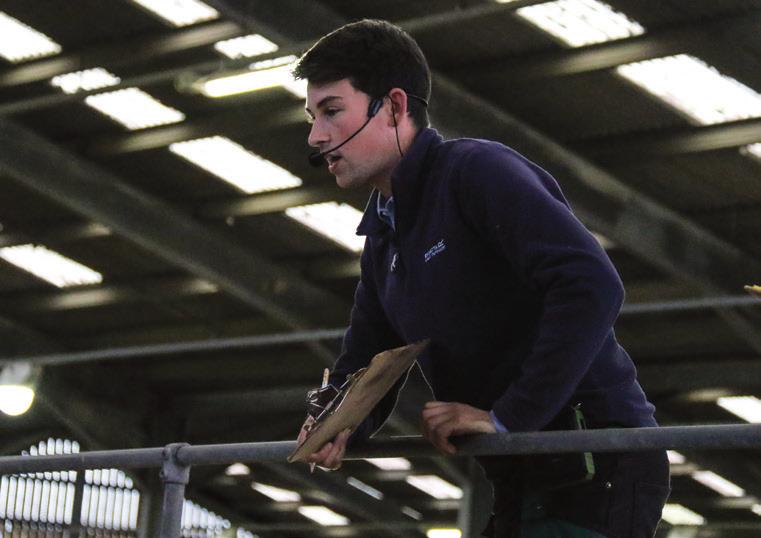
has been held on this site for a number of years, but because of ground conditions it had to be postponed. Unfortunately, the day of the rescheduled sale turned out to be far worse than the original sale date. Who could have predicted that? Although the weather was against us, we powered through and it was a successful day given the circumstances. We had our usual stand at Heathfield Show on Saturday 25 May, which was an enjoyable day for all and saw the sun make an appearance. It was great to see lots of existing clients and some new faces. Please do call in and see us at the ploughing matches in the autumn to catch up with our auctioneering team and property consultants.
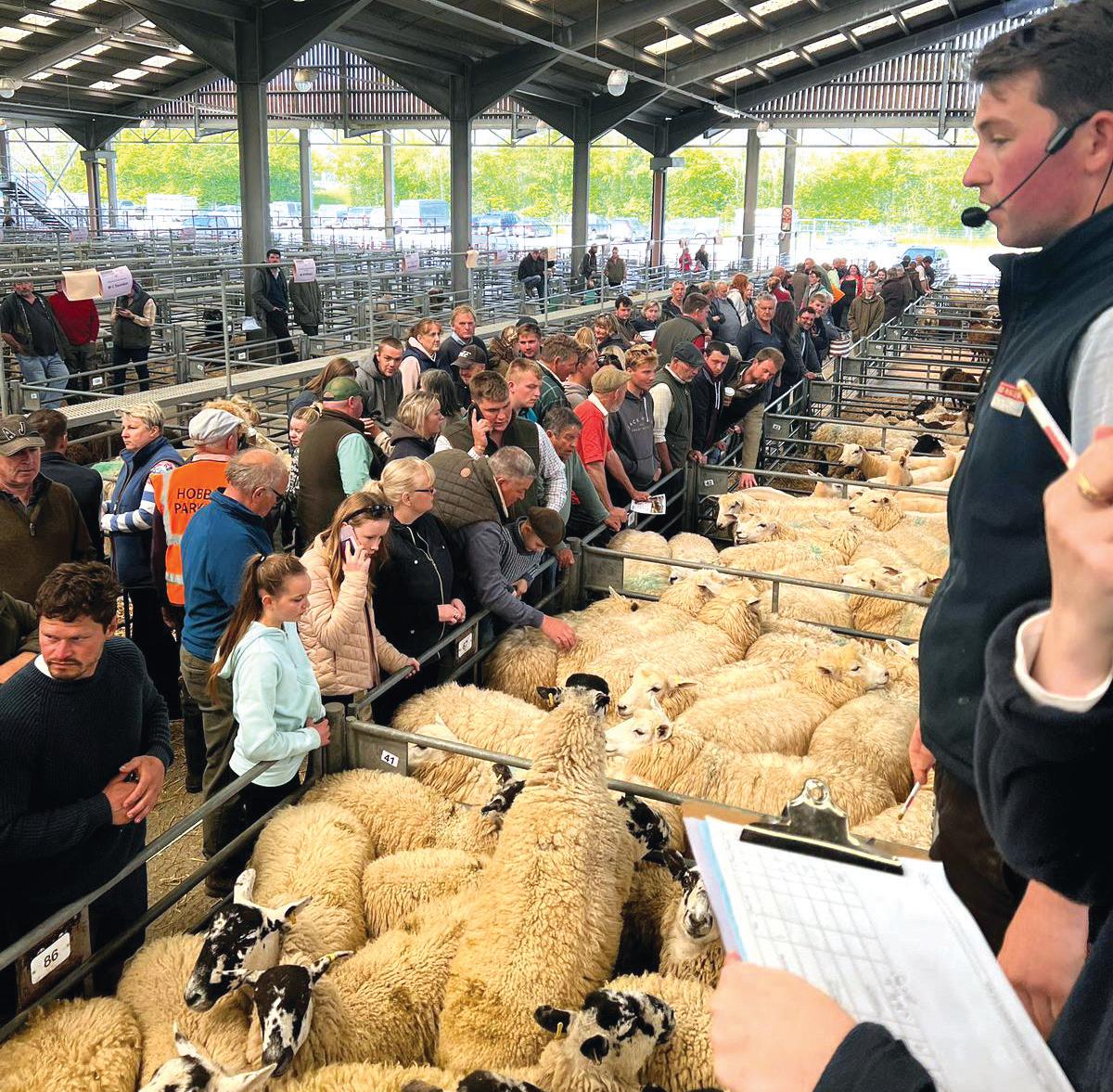
So far this marketing season, lamb prices have remained significantly above those of last year, promoting a reasonable degree of confidence within the sheep sector, although it has not all been plain sailing and there have been a few knocks. The decision by Morrison’s to abandon its commitment to sourcing only British lamb, for example, came as a bit of a surprise to producers.
This was ostensibly a policy about-turn allowing the supermarket to “trial” New Zealand lamb; not exactly a new product, it has only been available in the UK since the Dunedin first sailed from New Zealand with a cargo of frozen lamb on board some 142 years ago. It has absolutely nothing to do with a decent run of sensible UK lamb market prices of course; that’s pure coincidence.
The good run of lamb prices this season has tempted some breeders to draw females, which would ordinarily have been destined for breeding stock sales later in the year, for the finished lamb market, with a significant number of these coming forward. Together with the impact of the drop in the national flock in 2023 (-4.1% overall, -2.4% of the ewe flock), supplies of breeding females will almost certainly tighten and should, as long as confidence remains fairly strong, generate a bit of a lift in prices for the autumn breeding ewe sales.
It is quite reasonable that producers of breeding stock should also derive some benefit from the higher prices and bonuses enjoyed by finished lamb producers over this marketing season. Only time will tell, but some of the earlier sales of ewes off farms or on line will no doubt set the pace; the supply situation should be the important price determinant here, rather than simply picking up from last year’s sales prices. At this point it’s vitally important that breeders do not undersell stock, something which seems to be a frequent

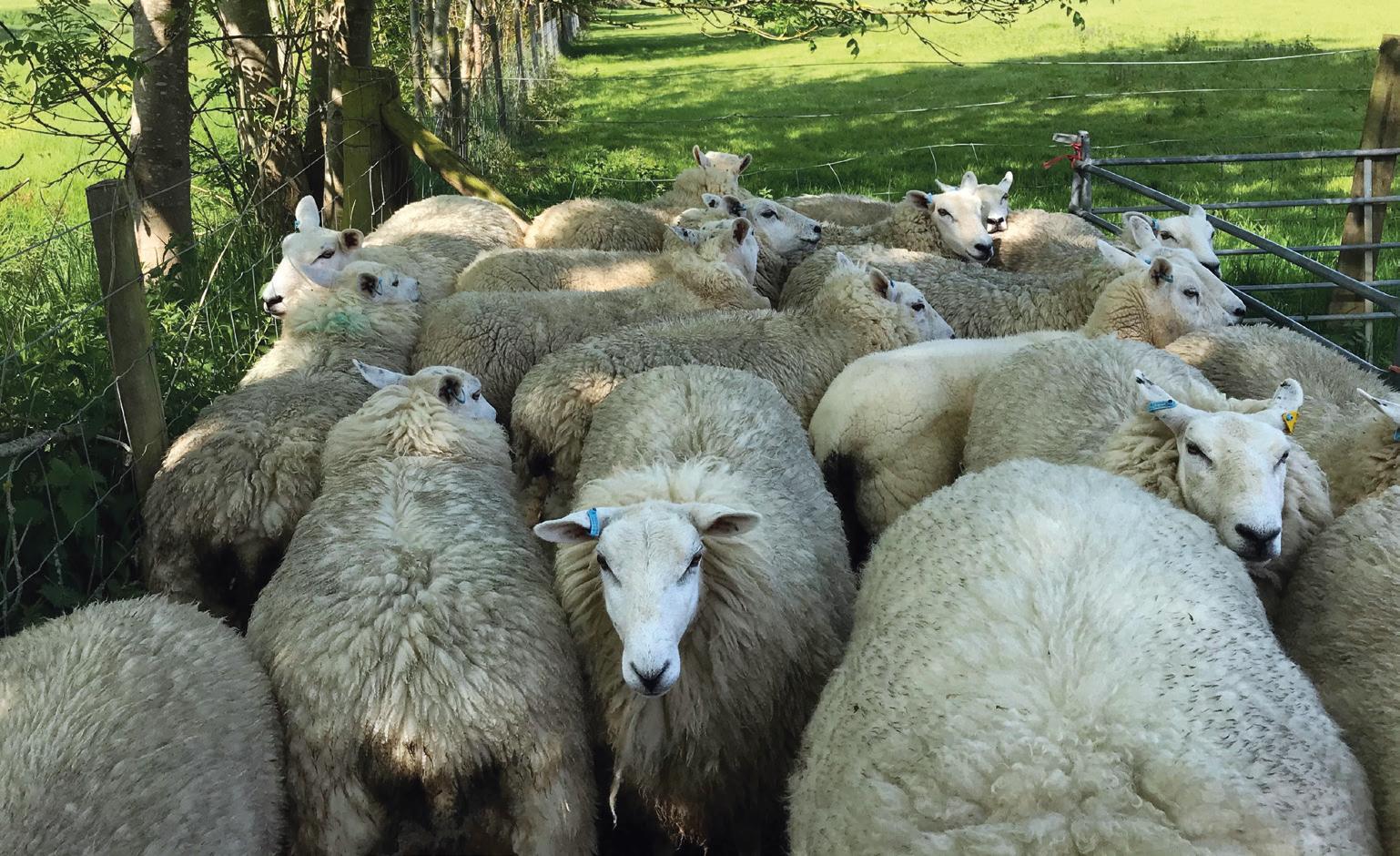
A lot of time and effort goes into producing and selecting good quality breeding ewes; the underselling of breeding ewes devalues their importance and does both breeders and the industry a huge disservice
issue with some on line sellers; such behaviour devalues our sheep, particularly where stock of any quality is concerned, and does nobody any favours.
To change the subject somewhat, I recently read, with some interest, an article written by a well-known cattle breeder and respected judge, the thrust of which was that, in spite of the enjoyment that he had derived from judging over many years, he was giving up judging. The reason he gave was that he felt that it was somewhat hypocritical; he was finding it increasingly difficult to reconcile the dichotomy between progress being made in selecting pedigree breeding cattle based on the measuring, monitoring, recording and validation of sound, financially relevant, performance criteria and what he perceived to be the stasis generated by the largely subjective selection criteria for many show cattle i.e. visual assessment based fundamentally upon choosing animals that looked very much like previous winners and champions in the show-ring.
I absolutely understand where he is coming from. I’m sure we have all seen plenty of championship-winning sheep that one would
never, ever, even if they were within budget, consider purchasing; impressive looking sheep, but ones that have been pampered and stuffed with hard feed, sheep that you know will melt as soon as they are put onto any ‘normal’ feeding regime.
It is, however, not an opinion that I would totally agree with. I am frequently minded to question both why I show my sheep and if, in doing so, I am contributing to the perpetuation of a growing division between the show ring and commercial production; similarly with judging. After some consideration I generally come to the conclusion that I can justify what I do in the clear knowledge that I have never bred, nor managed, my sheep for the show ring; my stock have been bred to be honest, hard working, productive and efficient. Breeding decisions are made on objective, with some compromise to subjective, criteria, but for showing I simply select the best (in my opinion) from those I have bred. If they win a few rosettes and produce an occasional champion, that’s a bonus.
As a pedigree breeder, I do need to be cognisant of breed standards and may occasionally purchase a ram to improve
As I sit writing my last South East Farmer article before I leave for pastures new, I can’t help but appreciate the little bit of sunshine radiating through our office window. The changeable weather over the past few months has caused much frustration across many of our farm clients. This frustration has been compounded by the uncertainty surrounding the general election scheduled for 4 July; it feels as though we are choosing between the best of a bad bunch – not much has changed in the 10 years since Joey Barton made his distasteful Question Time comments in May 2014.
The South of England show in June showcased the best of British livestock. As a practice we volunteered to examine animals on entry to the showground alongside providing veterinary care across the three days of showing. Several farmers with whom we work closely came away with rosettes and we congratulate them on their efforts.
The summer months are a strange time of year as a farm vet. The diary is typically quieter, with the bulk of spring calving completed and a lull before autumn calving. Semen testing bulls and performing pelvimetry on heifers pre-breeding have made up a proportion of the scheduled visits alongside health planning, TB testing and client evenings.
At one of these evenings, we were joined by
Zoetis vet Andrew Tyrer to discuss the benefits of a tight calving period and how artificial insemination can be beneficial to the suckler herd. We also spoke about how to interpret estimated breeding values (EBVs) and choose bulls based on these to minimise calving difficulties and improve profitability.
Our vets Nanja Verkuijl and Claire Thorpe hosted an afternoon meeting to discuss the Bluetongue virus (BTV) risk in advance of the high-risk period. The Animal and Plant Health Agency (APHA), Agriculture and Horticulture Development Board and Ruminant Health and Welfare Group websites are excellent information sources on this topic.
APHA has announced its Bluetongue disease control framework, which includes free testing for BTV across Norfolk, Suffolk, Kent, East Sussex and Essex prior to sale.
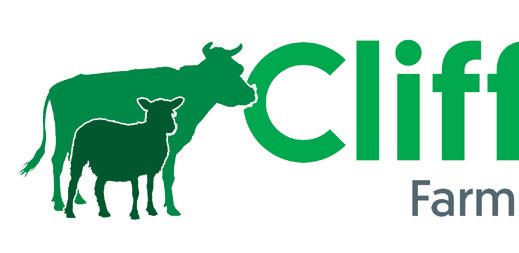

This offers buyers assurances as to the BTV status of purchased stock, a similar principle to pre-movement TB testing of cattle. Further information can be found on the gov.uk website by searching for “Bluetongue: get free testing for your animals”.
Finally, after six years at Cliffe I move to my new job at APHA Thirsk as a veterinary investigation officer (VIO). My love for postmortem examinations and pathology is no surprise to colleagues or farmers, and as such this new role offers an exciting opportunity to develop these skills.
I look back on my time at Cliffe fondly, and that is largely due to the farmers and colleagues I have had the pleasure of working with over the past six years. There are many I will miss and hope to stay in contact with - not just when something has died.

“breed type’, but even then it must be one that will fit into my hard working, outdoor system. Similarly with judging, I want to see good, sound, but honest sheep presented. My approach has always focused on good sheep; breed points, or certainly the finer details of breed points, are a secondary consideration. The latter is probably why I really do enjoy judging classes that include a range of different breeds; in such classes the emphasis is, of necessity, much more on the qualities
of the sheep as sheep, with significantly less detailed analysis of individual breed points. Quite apart from this, I also value the opportunities that shows and showing provide for meaningful interaction with the general public, who are, after all, our customers; they may be poorly informed, some misinformed, about what we do as an industry, but many of them are keen to learn more. An informed public is hopefully rather more inclined to support our own domestic sheep industry and,
with a bit of luck, local lamb producers. In addition, livestock are an integral part of any agricultural show; they are a key draw for many of the visitors, they drive footfall and they are a part of our agricultural heritage. I know that none of the above has any significant tangible value, but it is my firm opinion that the presence of sheep, other livestock and livestock competitions at agricultural shows is a significant asset to the wider industry. So I will keep doing what I do.
A new education centre developed to inspire and train the next generation of UK salad and vegetable growers was officially opened at Hadlow College last month.
The Thanet Earth Centre of Excellence at Hadlow College is the UK’s first centre of excellence in glasshouse growing and was officially opened by Cllr Roger Gough, leader of Kent County Council, on 5 June.
The high-tech facility will connect the higher education institute with the horticulture sector and promises to bring a new generation of greenhouse technical specialists to the industry, protecting the future of UK-grown fresh produce.
Based at Hadlow’s state-of-the-art glasshouse, horticultural students will benefit from working directly with Thanet Earth, the UK’s largest glasshouse salad supplier, to develop their skills and grow tomatoes in a commercial crop environment.
The partnership will deliver a unique, hands-on educational support programme, with direct access to leading employers across the fresh produce supply chain. Benefits will include:
• Funding for specialist teaching staff
• Industry visits
• Bespoke seminars
• Career mentoring.
The centre of excellence was opened during British Tomato Week, in response to concerns about the lack of skilled workers in the sector.
This followed the 2024 UK Food Security Index, recently published by the Government, which identified that only 17% of fruit and 55% of vegetables were grown domestically in the UK. These two food groups are the most reliant on imports, which the report recognises as a risk to national food security.
Alan Harvey, head of horticulture at Hadlow College, is excited about the benefits the glasshouse will bring to students: “This partnership offers our students a unique education experience. The close relationship between our college and the commercial horticultural sector means our students can experience the latest commercial growing techniques in our cutting-edge glasshouse facilities.
“Not only does this provide depth and enrichment to their education, but it will also enable our students to graduate with skills and experience that will be very attractive to employers.”
Rob James, technical director at Thanet Earth, is equally enthusiastic about the difference the facility could make: “Food security in the UK depends on inspiring the next generation of

To find out more about the range of horticulture courses the college offers visit www.hadlow.ac.uk/courses/subject-list
talent into our industry. We rely on skilled and passionate people to drive innovation and help to make delicious and nutritious UK-grown fresh produce available in your local food stores.
“There are incredible careers available across the fresh produce supply chain. Collaboration between education and industry is critical to changing perceptions of the sector and ensuring young people develop relevant, practical and employable skills.”
Dr Nikki Harrison, director of Growing Kent & Medway, a partner in the initiative, added: “Having the UK’s first centre of excellence here in Kent will ensure we have the pipeline of new talent and skills required to keep our region at the forefront of horticultural innovation.
“Linking industry with education ensures that the training provided reflects the latest crop production techniques and knowledge available in modern growing practices. We hope this is the first of many collaborations between industry and further education to address the critical skills shortage our industry faces.”
The facility plays a big role in Hadlow College’s horticulture curriculum, which can lead to a career in anything from horticulture food science and genetic engineering to landscape construction and management, gardening or greenkeeping – and more.
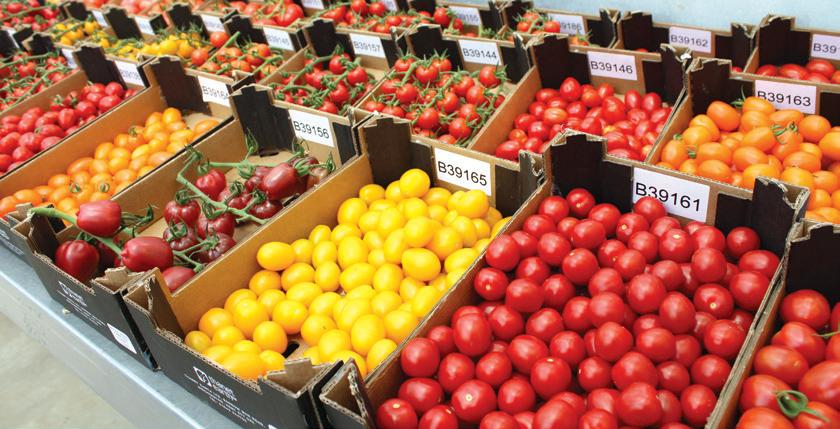


Sophie Cranfield BVetMed MRCVS explains the need to be vigilant for the Barber’s Pole Worm.
It has again come to the time of year when we all need to be vigilant for haemonchus cases. Haemonchus contortus, or Barber’s Pole worm, is a nematode worm that sucks the blood from the host animal; sheep, goats, calves and camelids are all susceptible. The main difficulty with Barber’s Pole is that unlike other worms, scouring is not necessarily a clinical sign. This makes it harder to identify when looking at the herd or flock as a whole and requires a more thorough examination of individuals.
Key clinical signs are pale-to-white mucous membranes, lethargy, loss of condition and milk drop causing subsequent ill thrift in lambs. Animals also develop bottle-jaw, similar to that seen in fluke cases, due to low protein in the blood. In acute cases you may see sudden deaths in the flock.
The key to prevention is regular faecal worm egg counts (FWEC) to assess the burden on the pasture and within your flock. Gathering sheep for routine procedures such as shearing, foot bathing and fly control is an ideal opportunity to assess the mucous membrane colour of the sheep (inside the lower eyelid) and collect faecal samples. If collecting samples from the field they must be fresh (ideally still warm when picked up).
The lifecycle of haemonchus is 20 days, starting with the eggs hatching in dung on the pasture to L1 stage larvae; these then moult into L2 stage then L3. The L3 larvae then migrates onto the grass where it is eaten by the sheep. Inside the sheep the L3 larvae moults to L4 and attaches to the wall of the abomasum. It is here that they feed from the blood of the sheep, drinking up to 0.05ml per worm per day, meaning that animals with a high burden could be losing approximately 250ml of blood per day.
The L4 then moults to an adult worm which continues to drink the sheep’s blood. Once these worms mature they start producing eggs, up to 15,000 per adult female per day. The period from ingestion of the L3 larvae to production of eggs is only 14 days; it is worth
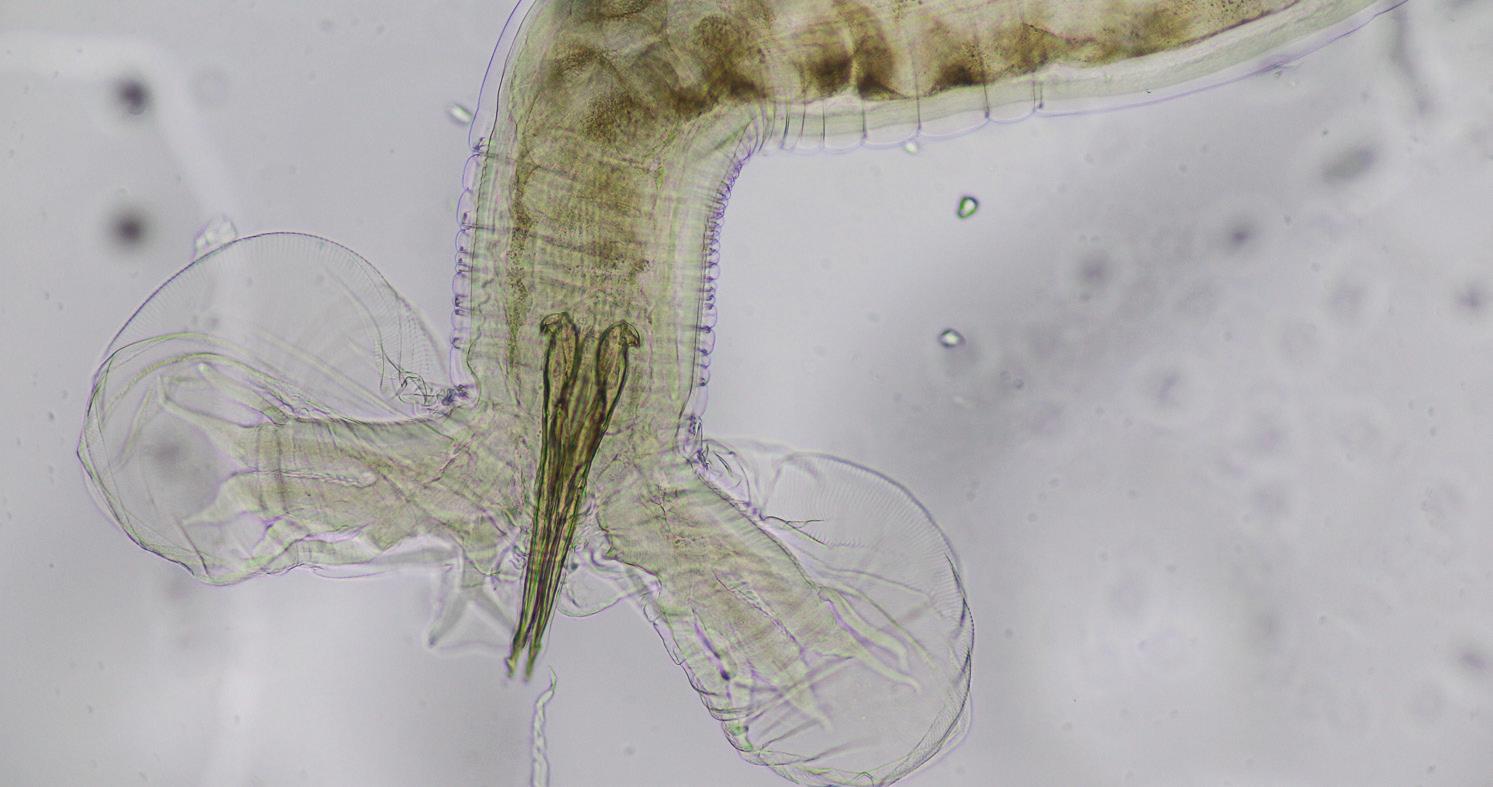
noting that FWEC during this time will come back negative in a new infection – hence the importance of regular FWECs.
Yellow or clear wormers can be used to treat haemonchus. These treatments should be followed up with a post-drench FWEC (seven days for Yellow, 14 for clear) to assess whether or not the wormer has worked and monitor any resistance in the worms. These tests can be performed via the annual health and welfare review funded under the Sustainable Farming Incentive.
Closantel, a fluke treatment, can also be used to treat haemonchus without encouraging resistance in other worms, but in a mixed infection it will not treat for other roundworms and so this is most useful if speciation has been performed and it has been confirmed that the burden is chiefly haemonchus.
Following strict biosecurity protocols regarding quarantine doses of wormer when bringing in new sheep is vital for control of haemonchus and other parasites, as well as other communicable diseases. Haemonchus can lay dormant inside the host over winter, so quarantine drenching is necessary even if the sheep have been housed over winter. Due to the rapid progression of the disease, reducing the burden of worms on the pasture is the ultimate goal. Resting pastures can reduce the burden of haemonchus. Resting for two months minimum, ideally three, can
markedly reduce the amount present. The vaccine Barbervax is currently available to the UK under special import; this vaccine promotes production of antibodies in the sheep which are then ingested by the worm in a blood meal. These antibodies attack the intestines of the worm and prevent them from producing eggs, eventually killing the worm. Repeated doses are needed for the vaccine to be effective, with approximately five doses likely to be necessary over the risk period. The vaccine does not prevent other gastrointestinal worms, therefore it does not completely remove the need for anthelmintic use, but it may vastly reduce the amount needed if haemonchus is the primary issue on your farm.
If you are concerned about haemonchus or have previously had an infection on your farm, speak to your vet to develop a parasite management plan.

Call us today or visit our website: 01227 763939 furleypage.co.uk

By
Before leasing land for a vineyard, there are seven key points which should be given careful thought by a prospective tenant.
First, seek expert advice on the viability of the land for use as a vineyard before agreeing to any heads of terms and committing to a lease.
Next, carry out the usual commercial searches, including local, environmental and drainage and water searches, as well as considering more specialist environmental searches to assess fully the viability of the land as a vineyard.
The UK has just experienced the wettest 18 months since records began. Farmers have experienced flooding and ruined crops, so make sure detailed flooding searches are completed to check the land is suitable for growing grapes.
It’s important to check that all potential uses of the land are covered. Of course, the primary use for the majority of the land is likely to be growing grapes, but can the land also be used for processing and storing wine? Could the tenant open a shop and provide a place where visitors can drink wine on site?
The tenant should ensure all potential uses are covered off with the local planning authority, as planning permission will be needed for the construction of buildings for storing and producing wine, as well as for selling it. The lease itself should also give the landlord’s personal permission to all intended uses.
It takes four years for still wine and eight years for sparkling wine from planting through to having a product ready to hit the shelves, so ensure the term is long enough to allow the vineyard to become productive.
A considerable investment will be required to establish the vineyard, so the lease needs to be long term for the investment to pay off in time.
It’s important to find out if any rent concessions can be negotiated in the earlier years when the vineyard will not generate any income. This could be offset with an element of turnover rent in future years, allowing the landlord to benefit from the success of the venture but giving the tenant the best chance of success in the early stages.
Accept and plan for the fact that the vineyard may not work out, and ensure there is a break clause.
A long lease will be the preferred option, but if the land proves to be unproductive or there is another reason why the enterprise proves unviable, a tenant-only fixed break clause or even a rolling break clause, if possible, would bring the lease to an end earlier and provide an escape route.
This is particularly important as opportunities to assign the vineyard to another tenant will be limited due to the specialist nature of the use of the land.
Ask yourself if access will be needed across third party land and if this will be sufficient for a viable business. An agricultural access track might be enough for farm vehicles, but what about visitors? Negotiations might be needed with a third party if the landlord does not own all of the access tracks or roads which will need to be used.
Finally, the tenant should think about permits or licences to operate as a vineyard. For example, will it be possible to obtain a licence to sell alcohol to take away or consume on site? Specialist advice should be sought.
Many people know that a Will has to be in writing and signed by the testator in the presence of two witnesses to be valid. But did you know there is a way of gifting property on death without committing your wishes to writing?
It can be done by the obscure legal doctrine of ‘Donationes Mortis Causa’ (‘DMC’) which translates as “gift in contemplation of death”. It is a relic of Roman law, with one judge commenting: “The doctrine obviously served a useful purpose in social conditions prevailing under the Roman Empire, but it serves little useful purpose today.” That said, Mr Masudur Rahman, who recently relied on the doctrine to receive the £3.15 million estate of a Mr Al Mahmood, may disagree.
DMC is a gift made by a living person (a donor) in contemplation of their impending death, subject to the condition that they do indeed pass away in the near future. A period of four months between gift and death is too long, and if death ceases to be ‘impending’ (e.g. the donor recovers) the gift is revoked.
The donor must take sufficient steps to deliver the gift to the donee, (for example, physically giving it or giving a key to something containing it). In the case of land, shares and bank accounts – which cannot be physically given – the donor must part with their “dominion” over it – in other words the means by which it is accessed (for example a password).
Mr Rahman was a distant relative of Mr and Mrs Al Mahmood, who had no children. They made Wills in 2015 leaving their property to the survivor of them, and then to nephews/ nieces who they rarely saw.
Over time, Mr Rahman became close with
the Al Mahmoods and they came to rely on him as they aged and suffered poor health. Sadly, on 6 October 2020, Mrs Al Mahmood unexpectantly died.
When well-wishers called upon Mr Al Mahmood to pay their condolences, he told them that Mr Rahman was, figuratively speaking, his son and that his UK property was “all for Masud”. He frequently referred to his own death, believing that he only had a short time to live, and he wanted to put his affairs in order.
Within days, Mr Al Mahmood instructed a Will writer to make a new Will leaving all his property to Mr Rahman. On the same day, he asked Mr Rahman to bring him two bags situated in his office containing documents relating to his three properties, bank/building society accounts and his share account with Hargreaves Lansdown. He said that he would die soon and was giving all the assets to Mr Rahman.
By 20 October 2020, Mr Al Mahmood was agitated that he had not heard from the Will writer. He asked Mr Rahman to bring the bags to him again. This time, he explained all the login details for the accounts and handed Mr Rahman bank cards, pin readers and other security information. He also gave
Mr Rahman the land certificate and leases for the three properties – telling him that “everything was his”.
Three days later, Mr Al Mahmood sadly died. He had still not executed his new Will, but as it turned out that did not matter because the court found he had gifted all of his property, except the contents of his three properties, to Mr Rahman on 20 October 2020 by the DMC doctrine.
While it was good news that Mr Al Mahmood’s last wishes were followed because Mr Rahman’s lawyers were familiar with the DMC doctrine and able to produce evidence to the court which discharged the burden of proof, it is far better to make a valid Will. The courts do treat DMC claims with the strictest scrutiny because of the potential for them to be fabricated. At Brachers, we recommend that you make a valid Will and review it every few years to ensure it still reflects your wishes.
Deborah Cain is Head of Brachers’ private wealth disputes team of specialist lawyers offering expert advice and representation for individuals, trust corporations and charities where disputes arise in relation to inheritance, Wills and trusts.
DEBORAH CAIN Partner, Brachers LLP T: 01622 655297 E: deborahcain@brachers.co.uk www.brachers.co.uk


Bloomfields have designed this recently approved 4-bed stables conversion, in a wonderfully secluded designated landscape. The design, stepped over three levels, features a double height, open plan kitchen / living area, three raised bedrooms, and a vaulted master suite, with a sitting area looking over the living space below. Externally, the building features timber and zinc, materials sympathetic to the building’s original use, but with contemporary detailing to bring it right up to date.






New horticultural worker’s permanent dwelling

Bloomfields has successfully obtained permission for the replacement of a temporary mobile home with a new build agricultural occupancy condition tied dwelling within the South Downs National Park.
A journey which Bloomfields has guided our client through since 2019 has now culminated in an approved new dwelling for the Managing Director and his family to reside in, on site, adjacent to his successful nursery.



Controlled atmospheric store approved under Permitted Development Rights

Prior approval was not required by the Council for the construction of controlled atmospheric store at a large top fruit farm in Kent. The Council acknowledged and approved the agricultural justification put forward for a small amount of on site controlled atmospheric storage, to reduce the amount of traffic movements for storage on other holdings. This requirement was considered to be acceptable within the Metropolitan Green Belt.





Permitted development approved for new 10,000m³ slurry lagoon & manure store

Bloomfields has secured the approval of a permitted development application planning permission for a new 10,000m³ slurry lagoon, a 1,500m² farmyard manure store as well as three separate water settlement ponds over a 3,600m² (3.6 ha) site. The lagoon will now facilitate the planned dairy herd expansion for a longstanding, multigenerational family run dairy.


Please contact our experienced Chartered Town Planners today to discuss how we can help you.

An outstanding small farm with a spacious house and a superb range of outbuildings including garaging with flat above, loose boxes and excellent outbuilding 63’7 x 19’ constructed in 2013, with consent for use as a micro brewery, has come to the market with Batcheller Monkhouse. The gardens and grounds enjoy great privacy, with two large paddocks and areas of woodland – in all about 31.7 acres.
Sharpes Farm is situated in a rural location and is both light and spacious. There is a large conservatory providing wonderful views over the garden and countryside beyond.
A generously proportioned, triple-aspect master bedroom with en-suite is situated
at the rear of the house, with Juliet balcony providing views of the garden, land and countryside beyond. There is a guest suite bedroom and three further bedrooms.
Two sets of double opening doors lead to the good sized garage 29’7 x 28’11 with a flat above. Adjoining is a covered carport with access to further garaging with two sets of up and over doors leading into cold rooms and a former office.
There is additional garaging with a large double carport with electric car charging point, to the side of which is a cold store and a stable block with three loose boxes.
A timber gate gives access to an excellent building with consent for a micro brewery, a steel portal-framed barn with three sets of

double opening, part-glazed doors.
A chalet/studio is currently divided into two rooms with light and power connected, built-in storage cupboards, of timber construction, and with pine panelled walls. The gardens are laid to lawn and provide great privacy, with a selection of mature trees and shrubs.
To the rear of the house is a sheltered and secluded area of lawn partly bounded by a mature beech hedge. There is also an area of decking bordering the house. There are additional areas of lawn enjoying wonderful views over the surrounding countryside with a further paved terrace. There is a hard tennis court (in need of resurfacing).
Gardens and grounds in all about 31.7 acres.






139 ACRES FAVERSHAM | KENT
GUIDE PRICE: £2,300,000
Offered for sale to the market for the first time in over 60 years, Lambert & Foster have a superbly located residential farm offering opportunity for a sensitive renovation of a handsome Grade II listed farmhouse, an extensive range of traditional brick and timber framed buildings with further potential (subject to planning) all located central to its own farmland and woodland extending in all to 139 acres/56.25 hectares.
Bossenden Farm is located in a secluded yet accessible location along a half mile private driveway leading to the farmhouse and buildings, which lie central to the farmland and woodland.
Bossenden Wood was the site of what is referred to as the last battle held on English soil, which took place on 31 May 1838. The battle was fought between a small group of labourers and a detachment of soldiers sent from barracks in Canterbury to arrest the march leader, the self-styled Sir William Courtney, and 11 men died in the brief
confrontation. Sir William Courtenay lodged at Bossenden Farmhouse prior to the Battle of Bossenden Wood.
The farmhouse forms part of a courtyard of traditional farm buildings. The Grade II listed brick and tile farmhouse has origins in the 17th century, with later additions, and offers purchasers the rare opportunity to renovate a handsome farmhouse in a wonderful location. The house is flanked on two sides with unconverted brick and tile buildings which offer the possibility of further development subject to planning permission.
The house accommodation comprises two spacious sitting rooms, five bedrooms and two bathrooms. Completing the accommodation is a substantial dry cellar.
The farmhouse retains many original period features, including Victorian fireplaces, but would benefit from general updating and modernisation throughout.
The traditional farm buildings form a courtyard with the farmhouse, giving the property a wonderful setting. Attached
on two sides to the farmhouse are singlestorey former farm buildings which are used variously for uses ancillary to the farmhouse or for general storage. One building has a loft store with a staircase access to the south of the farmhouse. On the eastern side of the courtyard is a timber-framed barn.
The building is extended on its eastern side with a mono-pitch block lean-to store and on the south by a series of four stores.
The farmland which surrounds the yard lies either side of a central farm drive and extends in all to some 71 acres/28.73 ha of arable/ regenerated pasture land, together with 67 acres/27.11 ha which is part of Bossenden Wood, an ancient semi-natural woodland comprising a mixture of oak standard with coppice chestnut and hazels and a mixture of holly, conifer and other species. The woodland adjoins a larger area of Bossenden Wood part belonging to the RSPB. The majority of the woodland lies to the east of the farm, but with a protective shelter belt forming part of the freehold to the west.
For more information, contact Paddock Wood Farm and Land sales team at Lambert & Foster: 01892 832325



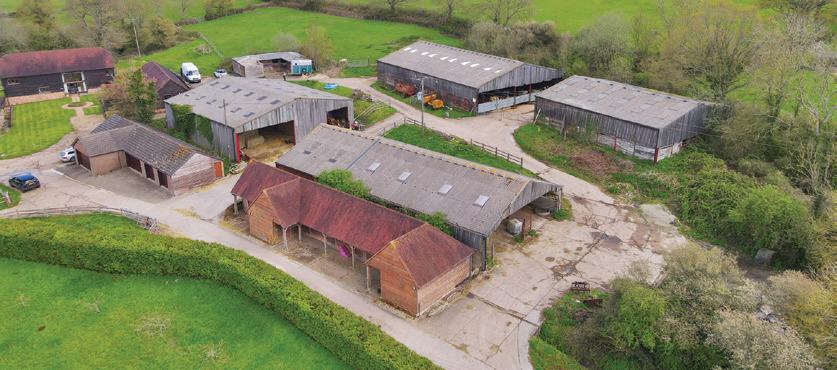

An attractive residential and amenity farm with 185 acres in a picturesque East Sussex location has come to the market through Savills.
Broadreed Farm is a pretty and well-located farm with an attractive five-bedroomed Grade
For more information, contact Savills rural agency team in the South East on 01732 879054

II listed farmhouse, four additional let cottages, equestrian facilities, a range of modern and traditional farm buildings and 184.75 acres of mixed Wealden farmland.
The farm is down a long driveway, set in unspoilt East Sussex countryside, close to the attractive villages of Mayfield and Rotherfield.
The traditional Sussex tile-hung and timber-framed farmhouse is believed to date back to the 16th century. It is presented in good order, with generously proportioned rooms, good ceiling heights for its age and classical period features, including exposed beams and inglenook fireplaces. The accommodation is arranged over three floors, with three reception rooms, a study, a kitchen/breakfast room, WC, utility, five bedrooms, a shower room and a family bathroom.
There are four additional cottages subject to assured shorthold tenancies. The equestrian facilities comprise a stable block with eight stables and a sand school, as well as an old stable block which requires significant renovation or replacement.
The agricultural buildings include four large agricultural barns, one concrete portal frame barn and three steel portal frame barns.
Hannah Riches, of Savills rural agency team, said: “The sale of Broadreed Farm presents an excellent opportunity to buy a traditional
lifestyle farm with the advantage of a significant residential rental income.”
Broadreed Farm is being marketed by Savills for a guide price of £4,750,000 for the whole, or in lots.
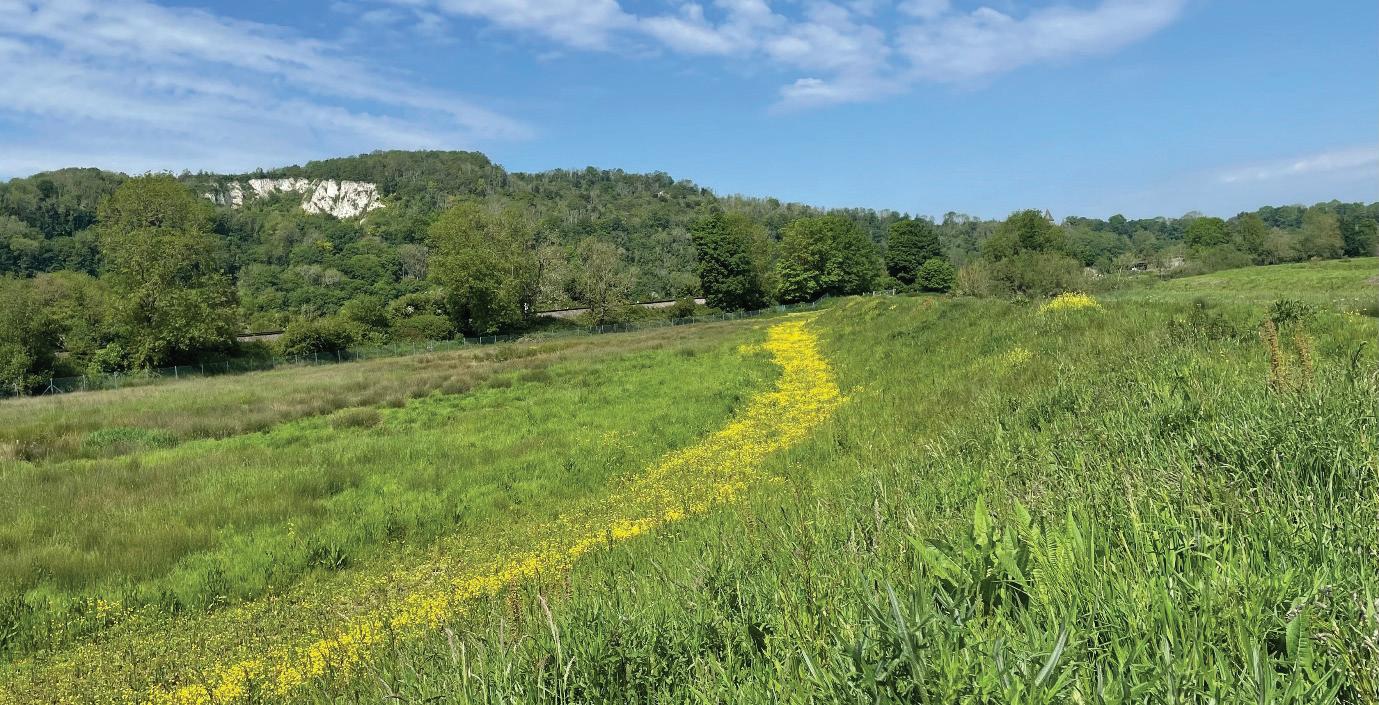
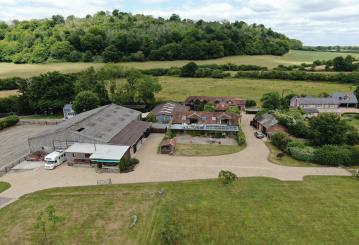

PLATT HOUSE FARM, FAIRSEAT LANE, WROTHAM Guide
A rare opportunity to purchase the entirety of the issued share capital in A L Betts Ltd with assets comprising a freehold property with development potential. A former dairy farm comprising a farmhouse, extensive farm buildings with lapsed permission for residential development (an identical application for three detached family homes is currently being considered by Tonbridge & Malling Borough Council) and grassland extending to 95.39 acres (38.60 hectares).





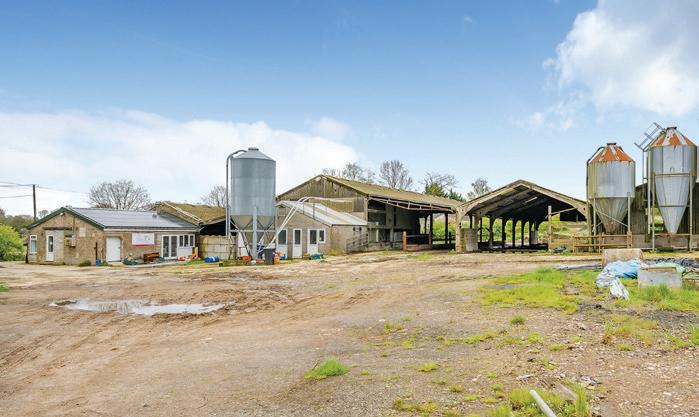

BOSSENDEN FARM, DUNKIRK, FAVERSHAM
Offered for sale to the market for the first time in over 60 years, a superbly located residential farm offering opportunity for a sensitive renovation of a handsome Grade II listed farmhouse, an extensive range of traditional brick and timber framed buildings with further potential (subject to planning) all located central to its own farmland and woodland extending in all to about 139 acres (56.25 hectares).




GARDEN FARM, FAIRWARP, UCKFIELD
Guide Price £1,700,000
Located in an enviable location just outside the hamlet of Fairwarp, on the southern edge of the Ashdown Forest, Spring Garden Farm offers a detached farmhouse (subject to an Agricultural Occupancy Condition) with an attached selfcontained annexe, an extensive range of modern and traditional farm buildings and a ring fenced block of farmland and woodland, with far reaching views to the South Downs National Park, extending in all to some 81 acres (32.78 hectares).

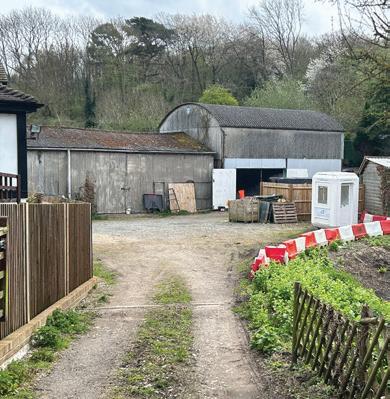

BARNS AT BRIMSOLE FARM, BRIMSTONE HILL, MEOPHAM
Guide Price
£500,000
A former farmyard comprising modern farm buildings with consent for two dwellings, each providing three bedroom accommodation, with associated carports and garden curtilage overlooking a pond.


FARMLAND AT NORTH PARK FARM, HUNTON ROAD
Guide Price
£500,000
A south facing block of agricultural land with viticulture potential on a favoured escarpment with far reaching views over the Weald of Kent. In all some 28.69 acres (11.61 Hectares).


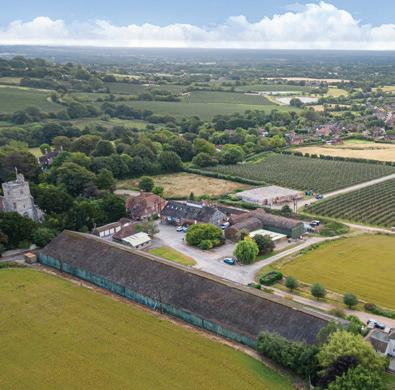
Guide Price £2.2m



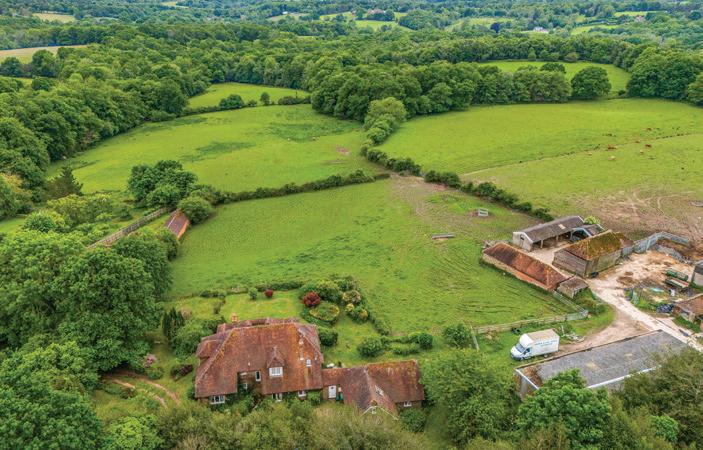

Former farm buildings with planning permission for six, 4 and 5 bedroom contemporary homes extending to 2,555 sq m/27,500 sq ft developable space, situated in a stunning semi-rural location on the Greensand Way.


PAYNES FIELD, CHURCH LANE, SHADOXHURST
Guide Price £320,000
A attractive ring fenced block of 32.58 acres (13.18 hectares) of permanent pasture on the immediate outskirts of the village of Shadoxhurst.

Williams


L a n d & P r o p e r t y E x p e r t s t

I S L E O F S H E P P E Y | K E N T
3 6 3 4 7 a c r e s o f a g r i c u l t u r a l l a n d i n a n a r a b l e r o t a t i o n
G o o d s i z e d h a r d y a r d + b u i l d i n g s e x t e n d i n g t o 1 5 a c r e s
1 , 0 0 0 t o n n e s g r a i n s t o r a g e
N o r t h e r n s t o r e w i t h d r y i n g f l o o r a n d f a n h o u s e
V a c a n t p o s s e s s i o n a v a i l a b l e p o s t h a r v e s t 2 0 2 4
I n a l l 3 6 4 . 9 7 a c r e s .
G u i d e P r i c e : £ 3 , 9 9 5 , 0 0 0

K N O C K H O L T | K E N T

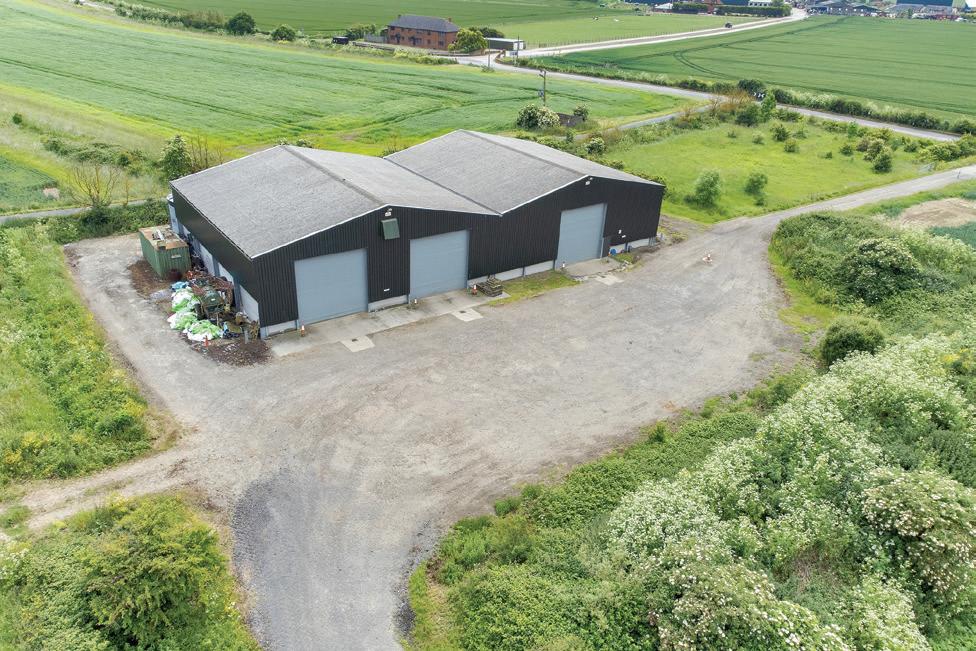



D e t a c h e d 5 b e d r o o m h o u s e w i t h l a n d s c a p e d
g a r d e n s a n d a s e p a r a t e 2 / 3 b e d r o o m c o t t a g e
A r a n g e o f a n c i l l a r y a n d s t a b l e b u i l d i n g s a d j a c e n t
t o t h e m a i n d w e l l i n g .
S w i m m i n g p o o l , p o o l h o u s e a n d t e n n i s c o u r t
s u r r o u n d e d b y l a n d s c a p e d g a r d e n s a n d g r o u n d s
P a d d o c k l a n d a n d w o o d l a n d e x t e n d i n g t o 8 0 7 a c r e s
I n a l l a p p r o x i m a t e l y 1 1 5 7 a c r e s
G u i d e P r i c e : £ 2 , 9 9 5 , 0 0 0

B E T H E R S D E N | K E N T
A d e t a c h e d 3 - b e d r o o m f a r m h o u s e w i t h d e l i g h t f u l
r u r a l v i e w s
S e p a r a t e a n n e x e w i t h o f f i c e s p a c e a b o v e a n d w i t h
i n c o m e p o t e n t i a l
R a n g e o f g e n e r a l p u r p o s e o u t b u i l d i n g s a n d s t o r e s .
E x t e n s i v e r a n g e o f e q u e s t r i a n f a c i l i t i e s i n c l u d i n g 5
l o o s e b o x e s a n d a m e n a g e
I n a l l a p p r o x i m a t e l y 5 0 3 7 a c r e s
G u i d e P r i c e : £ 1 , 4 9 5 , 0 0 0
w w w b t f p a r t n e r s h i p c o u k c h a l l o c k @ b t f p a r t n e r s h i p c o u k
This is a rare opportunity to purchase the entirety of the issued share capital in A L Betts Ltd, with assets comprising freehold property with development potential. This is a former dairy farm comprising a farmhouse, extensive farm buildings with previous permission for residential development (for three detached family homes – current application submitted), and grassland extending to 95.39 acres (38.60 hectares).
Offered for sale is the issued share capital in A L Betts Ltd, whose assets comprise the freehold of Platt House Farm located on the North Downs, north of the village of Wrotham in Kent. The farm was managed in hand as a dairy unit until the Autumn of 2023, when the dairy herd was dispersed.
Constructed in the 1960s, the farmhouse is located adjacent to the farmyard to the east of Fairseat Lane, and is (subject to AOC) converted into three flats and has been occupied by non farming tenants for a period of more than 10 years. Located close to the farmhouse is a high quality converted farm office.
The farm buildings at Platt House Farm
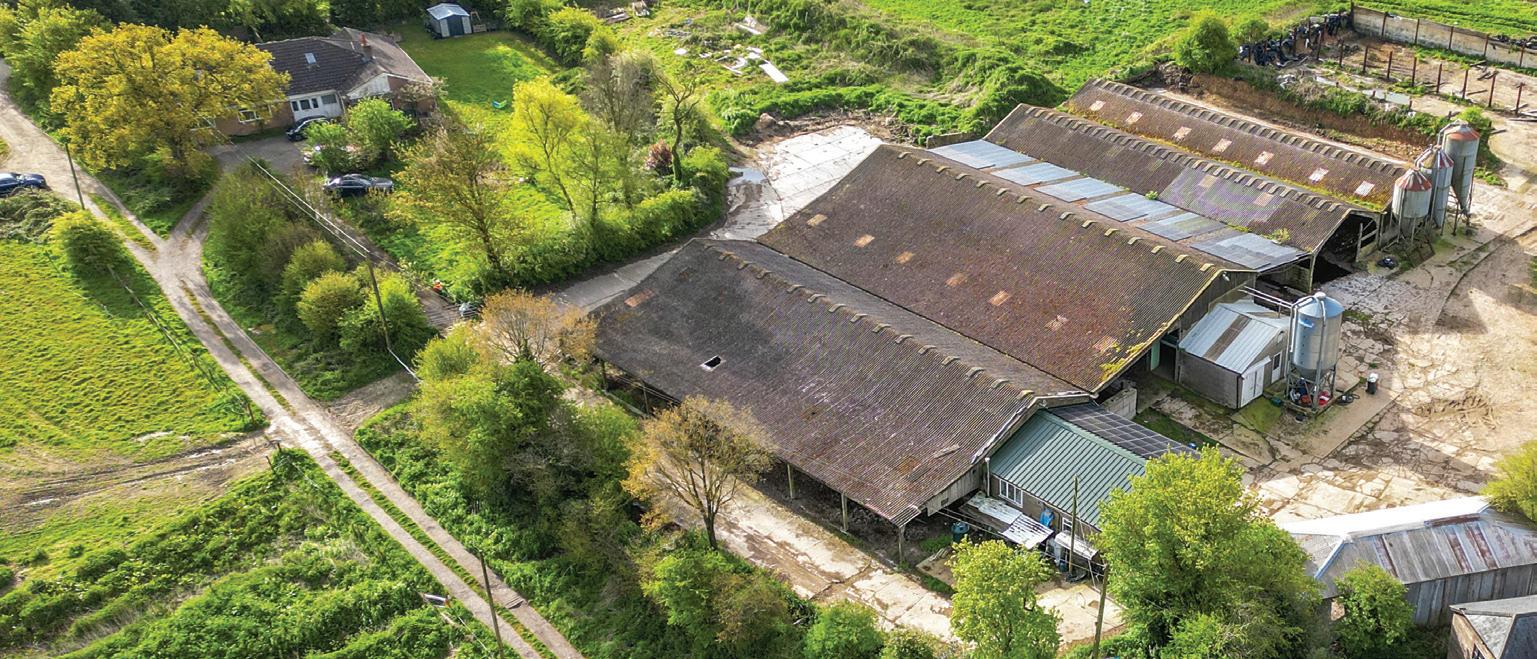
are within a yard extending to approximately 1.42 acres (0.57 hectares), with its own access directly off Fairseat Lane. The farmyard is accessed separately to the residential property. The buildings comprise an extensive range of mainly concrete portal frame buildings with significant areas of concrete floor, and pole barns, all of which have been used in connection with the former dairy enterprise. There is also a second farm office and building which has been used for processing/ bottling milk. In all there is some 22,000 sq ft (2,043 sq m) of covered area.
Adjoining the yard is a slurry store and silage clamps. A large area of the farmyard has a concrete surface, together with three-phase electricity and mains water.
Planning permission was previously granted for residential development by Tonbridge and Malling Borough Council (Ref 18/02802/FL), for the ‘’demolition of the buildings and erection of three residential units’’, but this consent has now lapsed. A resubmission of the same scheme was applied for in March 2024 under application Ref 24/00442/PA, and is awaiting a decision.




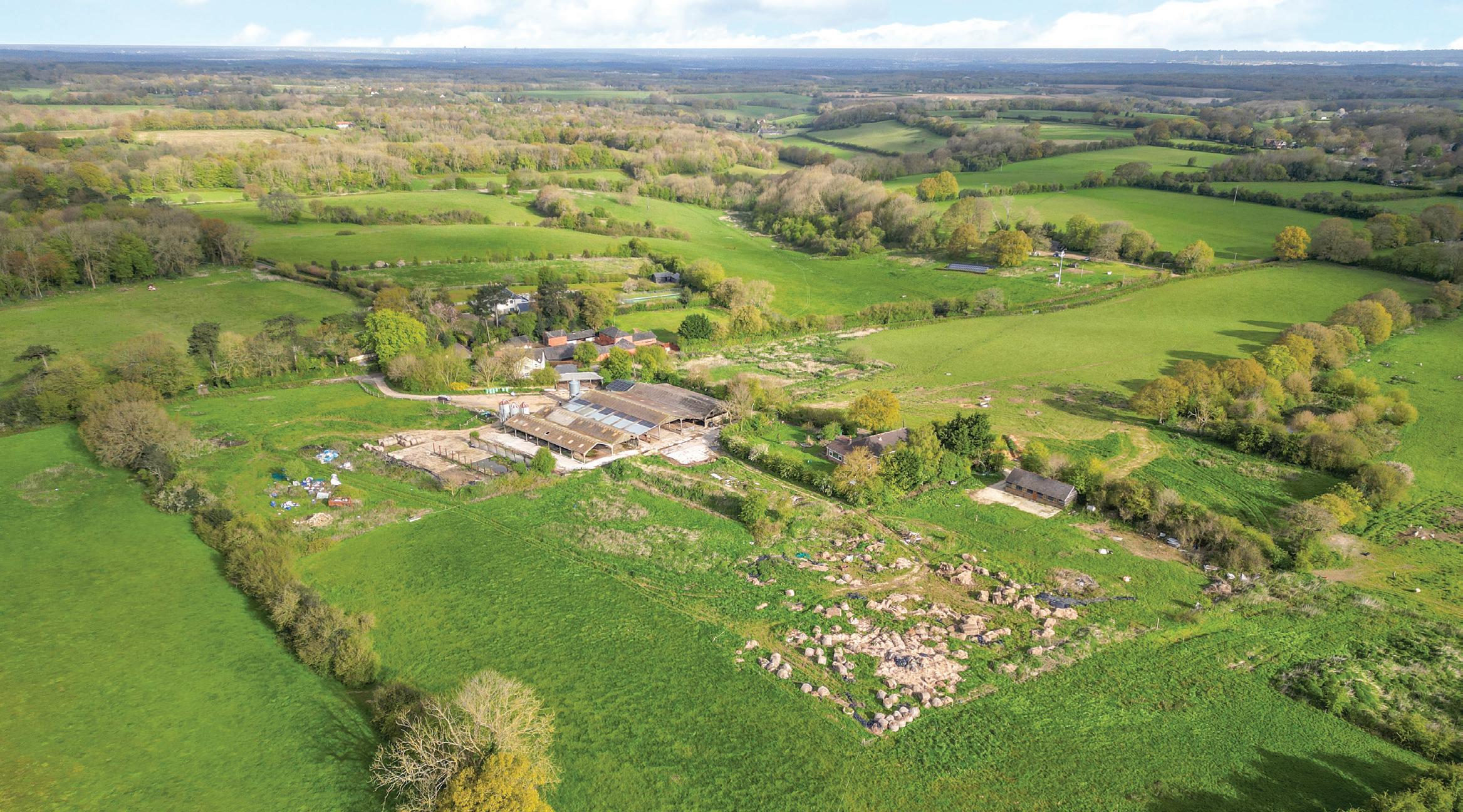


Head of Department
South East Farm Agency 07812965379 cspofforth@savills.com

C h r i s S p o f f o r t h H a n n a h R i c h e s
South East Farm Agency 07967555724 hriches@savills.com
o r m e r o u l t r y F a r m i v e r s e W e a l d e n F a r m



• Steel frame buildings
• Sheeting and cladding
• Guttering and repairs
• Groundworks and drainage
• Demolition and asbestos removal
• Refurbishment and change of use
• Concrete frame and steel frame repairs
• Insurance and general repairs
• Concrete floor and block paving
www.gjelgarconstruction.co.uk
For more information contact us:
t: 01233 623739 m: 07860 414227
e: office@gjelgarconstruction.co.uk







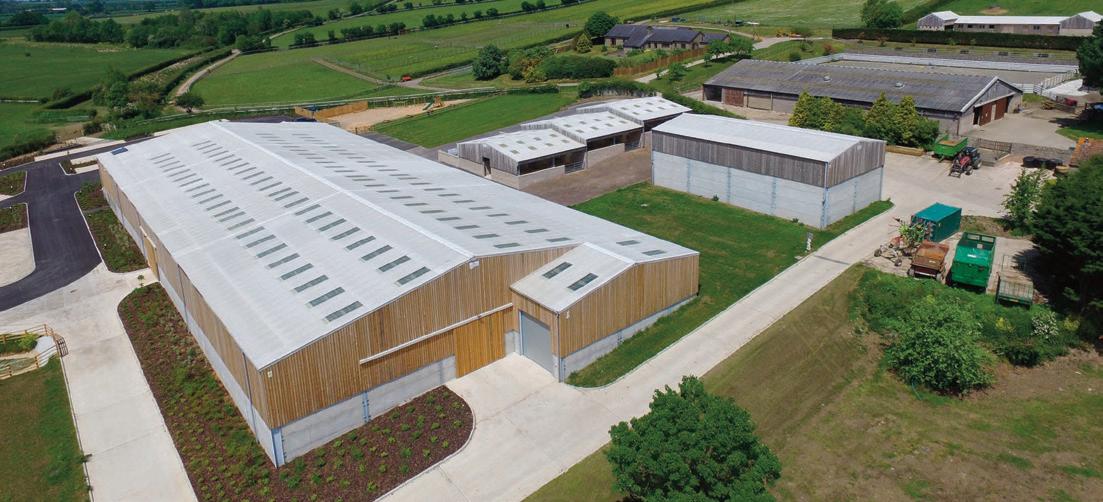
Steel-frame buildings for your farm
+ Supply only or supply & erect
+ Construction all over the UK
+ Award winning company
Strength, Security, Style

Shufflebottom Ltd
Cross Hands Business Park, Cross Hands, Llanelli, Carmarthenshire SA14 6RE

















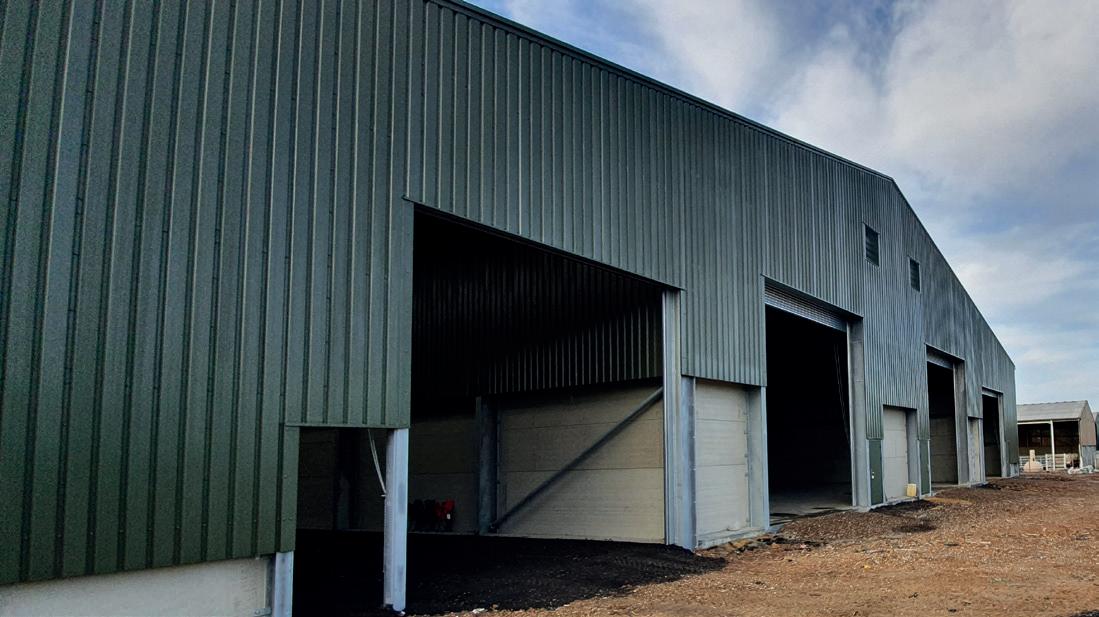









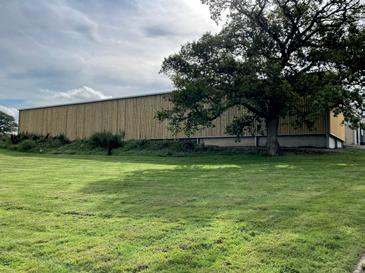
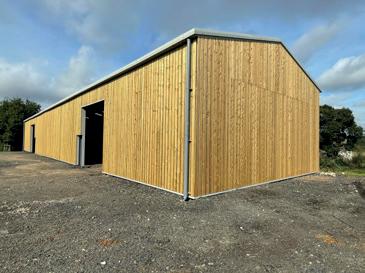







Standing Sweet Chestnut Wanted
Cleft post and rail
Cleft field gates
Fencing
Fencing stakes
Fencing
Straining posts
Chestnut
Chestnut
Chestnut fencing





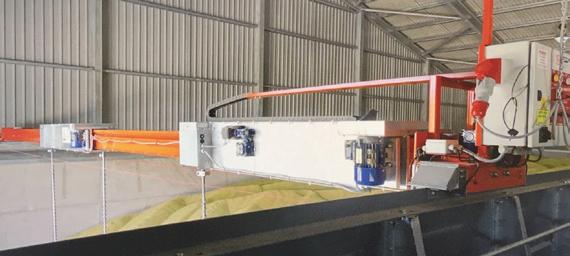


Tel:
Tel:
Supplied and erected & Repairs
Tel: 01737 821220 Mob: 07768 931891 Email: redhillfarmservices@gmail.com



Stock, Deer and Equestrian Fencing completed to the highest standard
Stock, Deer and Equestrian Fencing completed to the Highest Standard T.M Fencing Contractors
Tracked machines used minimising ground damage
Tracked machines used minimizing ground damage
Covering: Buckinghamshire, Oxfordshire and surrounding areas
Covering: Buckinghamshire, Oxfordshire and surrounding areas
Tel: 07583 027089
Tel: 07583 027089
Email: tmcontracting20@aol.com
Email: tmcontracting20@aol.com
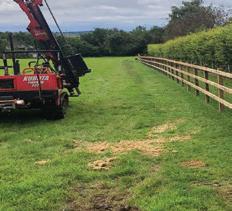


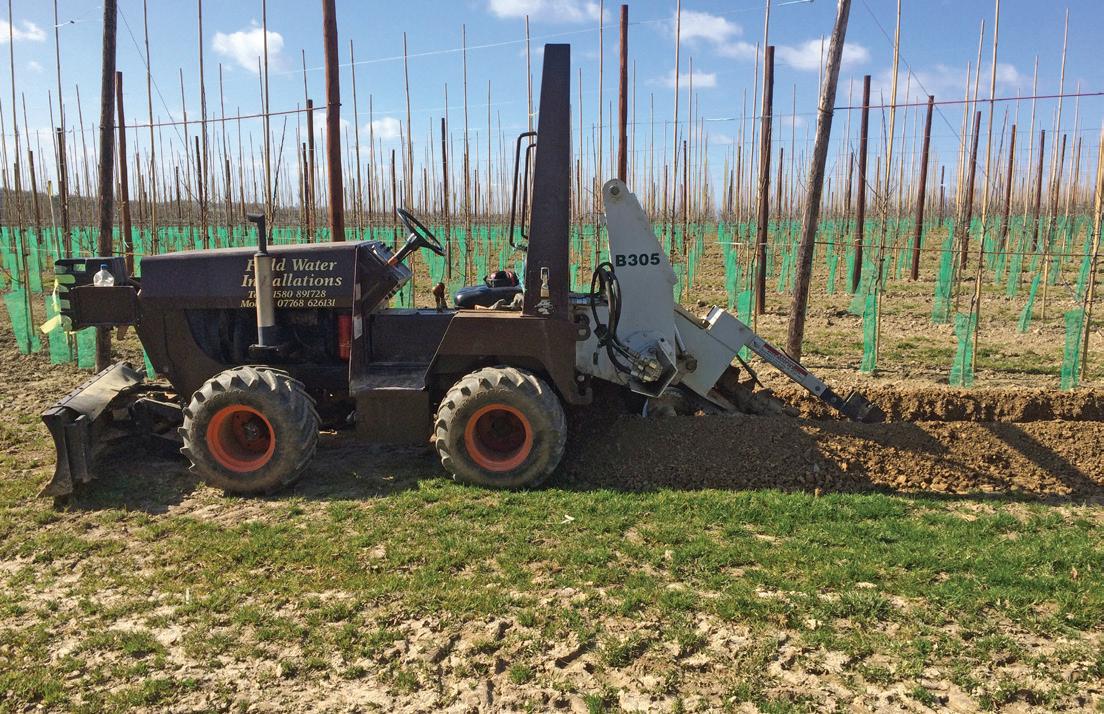














ACROSS
1 Cannot be seen (9)
5 Joins; next to (5)
8 Written assurance of quality (9)
9 Considerable, sizeable (5)
11 ---- window (4)
12 A house that is grand in appearance (7)
14 Native, deciduous shrub (5,9)
16 Pillar, prop, post (6)
18 Pacify (5)
21 Small bird (7)
24 Part of a plant (4)
26 Burn (10)
27 Temperature at which water vapour becomes liquid (8)
28 Shove (4)
DOWN
1 Take food into body (6)
2 Small glass containers (5)
3 Shut forcefully (4)
4 ------- Gin, nickname for homemade spirits in 1920s (7)
6 Small fruit (5)
7 Instructor (7)
10 Sudden movement(4)
13 Character from Much Ado About Nothing (4)
14 An ample quantity (9)
15 Faster than walking pace (4)
17 Collection of infected fluid (3)
18 Small in stature (5)
19 Head wear (3)
20 A surface without lumps (6)
22 Character from 101 Dalmatians (5)
23 Show or perform again (5)
24 Baffle (5)

To celebrate the King's birthday we’re offering readers the chance to win two bottles of Gribble Bridge Sparkling White. For more information about the vineyards, please visit www.biddendenvineyards.com or call 01580 291726.
*Subject to availability
LAST MONTH’S ANSWERS:
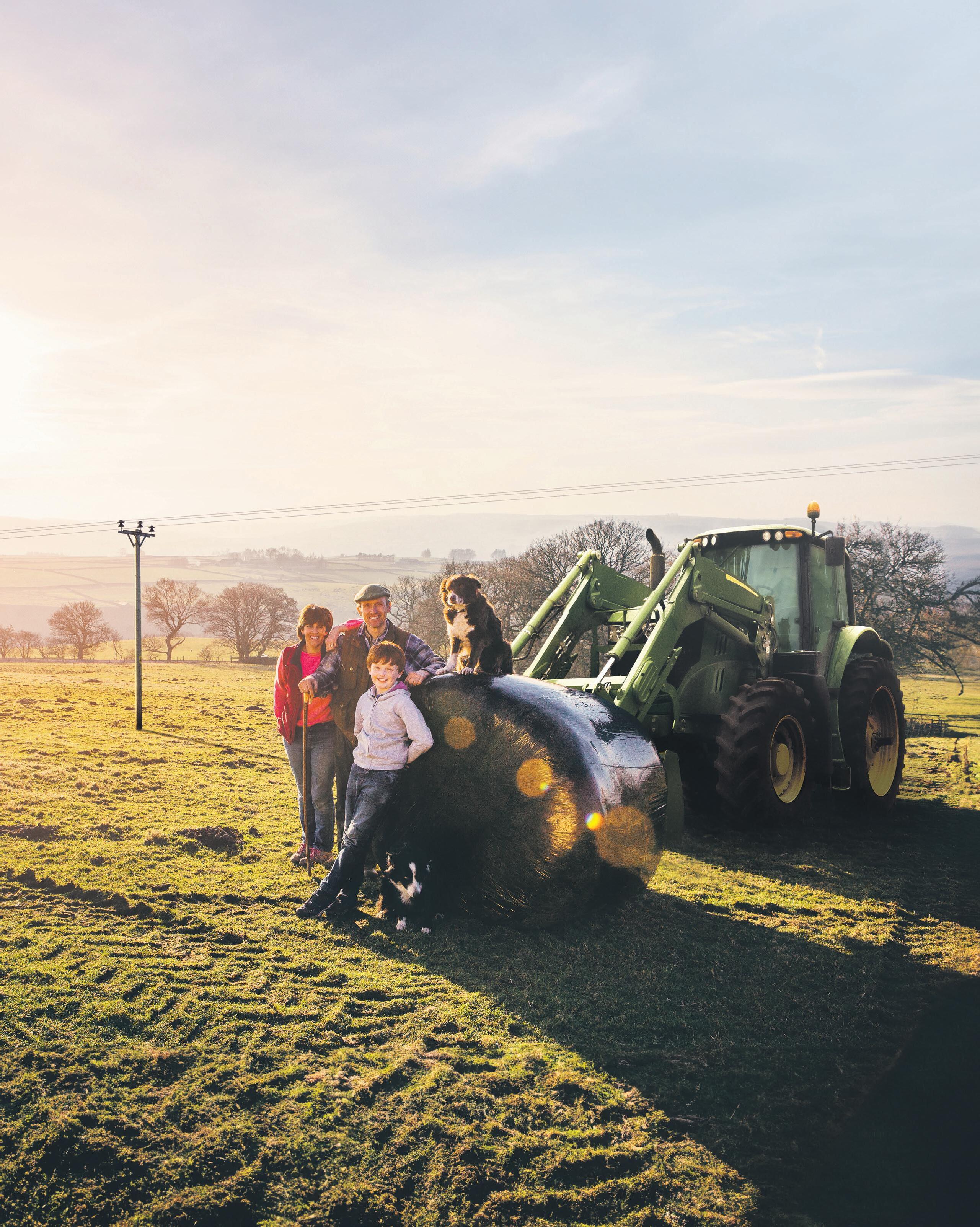
Before you head out on the farm, check for overhead power lines.